The OLD TONBRIDGIAN MAGAZINE
In this issue: Tonbridge’s long affinity with books and authors was celebrated with a visit of Sir Tim Waterstone (JH 52-58)
 AUTUMN 2022
AUTUMN 2022
Your Wedding at Tonbridge


In this issue: Tonbridge’s long affinity with books and authors was celebrated with a visit of Sir Tim Waterstone (JH 52-58)
 AUTUMN 2022
AUTUMN 2022

Tonbridge School is set within a magnificent 150-acre site in the heart of Kent, with beautiful gardens and architecture that provide the perfect backdrop to your special day.
We have six locations within the grounds that are licensed for ceremonies, plus function rooms that offer everything from the traditional to the contemporary.
We provide a range of catering options to complement your day, from hog roasts and afternoon tea to formal three course wedding breakfasts and bespoke menus created just for you.
Supporting local producers, we pride ourselves on using the very best of local ingredients to make your day memorable.
We understand everything needs to be just perfect for your wedding – our experienced team are here to make sure it all runs smoothly from start to finish.
events@tonbridge-school.org tonbridge-events.co.uk
Welcome From the OTS President
Welcome From the OTS Chairman
News of OTs
Cover Story: The Book as an Old Friend: Sir Tim Waterstone returns to Tonbridge

David Kemp Remembered
School, Chapel and Other Reflections on The 1960s: Ian Bradley
Writing About Architecture: Owen Hopkins

From Bantams 4 To Rugby Journalism: Mike Aylwin
My House: Paddy Butler
Sheila Hoole: An Appreciation
From the Chalkface: Kurt Seecharan
Behold the Dark Gray Man: the Controversial Life of Sholto Douglas: Book Review
Jonathan Smith at 80
Western Front Way: Rory Forsyth
Celebration of the Life of Mike Bushby
From the Archives
Full Circle: Paul Fincham
Grasping the Beauty of a Formula: Nick Lord
OT Magazine Produced by: Tonbridge Society Tonbridge School High Street Tonbridge TN9 1JP
E: tonbridge.society@tonbridge-school.org tonbridgeconnect.org
Editorial Team: Editor David Walsh david.walsh@tonbridge-school.org
Director of the Tonbridge Society Andy Whittall andrew.whittall@tonbridge-school.org
OT Relations Manager Lucy Tipler tonbridge.society@tonbridge-school.org
Judde Society Manager Tara Biddle tara.biddle@tonbridge-school.org
School Archivist Bev Matthews beverley.matthews@tonbridge-school.org
Head of Marketing Katerina Dimnik katerina.dimnik@tonbridge-school.org
From the Headmaster: James Priory
New Chair of Governors: Gavin Rochussen
Careers and Mentoring: Portia King
Careers Insight: Richard Brendon
Tonbridge Society
Designed by haime-butler.com
Printed by Brown, Knight & Truscott (BKT)

The Old Tonbridgian Magazine builds bridges between the School and the OT community. It aims to keep you in touch with what OTs are doing with their lives but also the life of the School. There is reflection on the past, and those shared experiences which bind very diverse generations together, but also news of the present and signposts to the future, foreshadowing the lives and careers young OTs will be following.
We have lost one of our most revered OTs in the past year in David Kemp, whose life is remembered, while the obituary section recalls the varied lives of many OTs who have died in the past year, and indeed the life of the remarkable Sheila Hoole. Reminiscence and reflection can be found in the piece by Ian Bradley on the Tonbridge of the 1960s, and in that of Paddy Butler who remembers School House in the late 1970s. Cultural life features in the return to the School of Sir Tim Waterstone who was interviewed by James Priory about his life and contribution to books, in Paul Fincham’s late career change into music and in Owen Hopkins writing about his journey into architectural history, while Mike Aylwin gives his thoughts on the future of rugby. Our archivist Bev Matthews has produced items from the School archives about music, cricket and that well-remembered ‘bumph test’’, while the review of a new book on Sholto Douglas gives an insight into one of our most distinguished OTs. We cover the 80th birthday celebration of Jonathan Smith, and a tea event to remember the life and huge contribution to Tonbridge of Mike Bushby. There is also plenty about what goes on in the School, including OT Kurt Seecharan penning the regular ‘From the Chalkface’ column, valetes of longer-serving staff and Nick Lord reflecting on nearly forty years of teaching maths. James Priory’s Skinners’ Day speech is included in an abridged form, while the new Chair of Governors Gavin Rochussen gives his thoughts on the priorities for the School moving forward. An innovation is a ‘letters’ section, with just two contributions at the first time of asking, but we welcome any correspondence commenting on our magazine articles or other aspects of OT life.
I came to Tonbridge fifty years ago to teach history and take over the cricket from Mike Bushby, although not necessarily in that order of priority. Tonbridge in 1972 was a very different school in terms of size, hierarchies and attitudes, but many of the old values remain today. I was struck by the recent verdict on the School in the Good Schools Guide, which tallied with my own memories: ‘A brilliant school that somehow remains totally unsnobby… These rounded engaging young men are destined to go far we feel, but without a scrap of the entitlement which so often accompanies a top-notch education’. Those are words to make any headmaster or teacher or alumnus proud. Finally I would like to thank the willing responsiveness of contributors, and the help given by members of the editorial team from the Tonbridge Society office, who have done so much throughout the year to keep the OT community connected with each other and the School.
David Walsh (CR 1972-2009), Editor, The Old Tonbridgian Magazine david.walsh@tonbridge-school.org

Mike Aylwin (PH 85-90) After Bristol University from 1991-95, and the Guildford School of Acting in 1995-96, Mike has become a regular sportswriter for The Guardian and The Observer, as well as the author of six books including Ivon, his dystopian satire about sport in the 22nd century, published in 2018; and Unholy Union: When Rugby Collided with the Modern World, his commentary on rugby in the 21st century published in 2019.
Ian Bradley (WH 63-68) After New College, Oxford, a first in Modern History and a DPhil, Ian was on the staff of The Times for six years and then combined freelance writing with teaching at Cranleigh School. After studying for a Bachelor of Divinity degree at St Andrew’s University, he was ordained into the ministry of the Church of Scotland and is now Emeritus Professor of Cultural and Spiritual History at St Andrew’s. He continues to write for The Times and other newspapers and is the author of more than 40 books covering theology, spirituality, history, politics and music. He is currently in the middle of writing a trilogy of books on death and the afterlife.
Rory Forsyth (MH 98-03) runs Panshard, a high-end events company specialising in brand campaigns, and has been CEO of The Western Front Way since 2016. He is also a director of the newly formed WFW Ltd which will oversee the completion of The Western Front Way project.



Owen Hopkins (Sc 88-93) After Tonbridge and the Courtauld Institute of Art, Owen has become an architectural writer and curator, and Director of the Farrell Centre at Newcastle University –a new public centre for architecture and cities due to open in early 2023. Previously he was Senior Curator of Exhibitions and Education at Sir John Soane’s Museum and before that Architecture Programme Curator at the Royal Academy of Arts. A frequent commentator on architecture in the press, on radio and TV, he is author of seven books, including The Museum: From its Origins to the 21st Century (2021)
Rupert ‘Paddy’ Butler (Sc 78-83) was in School House from 1978 to 1983, where he also purveyed some wily slow left arm bowling. He went on to Manchester University from 1984 to 1987, was called to the Bar in 1988 and has been practising as a barrister ever since.
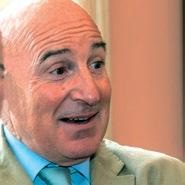
Joe Davies (CR 1980-1994) taught history at Tonbridge and was Housemaster of Parkside. He left to become Deputy Head at St. John’s Leatherhead, moved on to be Head of Sutton Valence and then Master of Haileybury, retiring in 2017 to live in Deal.
Paul Fincham (Sc 72-76) transitioned to a second career as a composer following a first career in the City of London. More about his composing is at www.paulfincham.com. He returned to music after reading it at Cambridge, where he was Musical Director of the Cambridge Footlights.

John James (CR 1989-1993) taught English and Drama at Tonbridge and then went on to be Head of English at Canford and Harrow, as well as a boarding housemaster at Canford. He also retired to Deal in 2019.
Nick Lord (CR 1983-) has taught mathematics at Tonbridge ever since arriving from Oxford University in 1983. He has been Head of Mathematics and a tutor in both School House and Ferox Hall.

Bev Matthews (School Archivist) joined Tonbridge School in 2000 as the Senior Librarian, following 13 years in a similar role at Beacon Community College, Crowborough. She also spent many happy years as a tutor in Hill Side. She retired from the Smythe Library in 2017 to become the School Archivist.

Kurt Seecharan (JH 82-87 and CR 2020-) read Politics at Bristol after Tonbridge, and then embarked on a teaching career at Wellingborough, Uppingham, Mill Hill and Trent College before returning to Tonbridge as Housemaster of School House.




Nobody could have been more surprised than me when I received a call last year from Richard Hough asking if I’d consider becoming the President of the OT Society. I was at School House from 69-73 but I haven’t been an active OT since.
My time at Tonbridge wasn’t particularly distinguished. I wasn’t much good at sport and never became Head of School, Head of House or even a prae. You won’t find my name on one of those varnished wooden boards in the cricket pavilion. My career has been in television; if you’ve heard of me –and please don’t be in the least embarrassed if you haven’t – it’s probably from the time when I was Controller of BBC One in the mid-2000s, which ended messily.
I was the second of four Finchams – Anthony, me, Paul and Michael –who were at Tonbridge from the late 60s to the late 70s. My brothers took the view that it would be an honour for a Fincham to become OT Society President, so in a sense I’m representing the family. Earlier this year my distinguished predecessor Sir Sherard CowperColes relinquished the post and I stepped into his shoes. For the first time in ages I found myself thinking, what did Tonbridge mean to me? What influence has it had? And how does it look today, from a perspective of half a century?
When you rummage through the trunk of memories you’re left with from your schooldays, you can take your pick. A few months ago I was invited to a lunch to celebrate the 80th birthday of the teacher who gave me the confidence to apply to read English at Cambridge –Jonathan Smith. The lunch took
place in what used to be known as the Headmaster’s House. I can remember as a novi being summoned for a fireside chat by the headmaster at the time, Michael McCrum, in the very room where we gathered for Jonathan’s lunch. I can remember because I was utterly terrified.
Five years is a long time, especially during those formative adolescent years. The journey from the nervous trepidation you feel as a 13-year-old, to the sense of intellectual discovery you get from being taught at A-level by committed, impassioned teachers, is a long one.
Jonathan Smith was a big influence on me and so was a history teacher called Mr Parker. He drummed the syllabus into us so effectively that I like to think that I could still write a decent essay about the decline of Spain in the 17th century. Many thanks, Mr Parker! Debating was one of the few things I excelled at. I can remember to this day a debate moderated by the acclaimed novelist Vikram Seth – yes, he was at School House too – addressing the question, ‘were scientists eventually going to destroy the world with their inventions?’ That’s a debate that’s still worth having. When I went up to university, I thought I might join the Cambridge Union, where the political careers of future cabinet ministers are forged. I went along for an open day, watched a thoroughly uninspiring debate and formed the view that the standard of debating
was actually a lot better at Tonbridge. So I joined the Footlights instead. Then there are the memories that should probably remain buried. A friend and I once snuck out of our dormitory after lights out, caught the last train up to London, went to an all night concert by the rock group Hawkwind, then took the all-night train back from Charing Cross and were tucked up in bed just before we were called for breakfast. We would surely have been expelled if we’d been caught.
Today’s boys at Tonbridge are doubtless accumulating similar experiences, good and bad, on and off syllabus. A lifetime lies ahead to reflect on them. My recent involvement with the School has been all the more rewarding because of the long years when I was too busy with my career, and bringing up my own family, and had little time to reflect on the influence of Tonbridge. Now that I have, I realise that it runs deep. I wouldn’t have missed it for the world.
Peter Fincham (Sc 69-73) OTS President
I am very grateful for the opportunity to address all OTs through this magazine. I took over as Chairman of the Old Tonbridgian Society in 2019 from David Walsh, who gave exemplary service for ten years and then possibly saw lockdown coming! I was in Park House from 79-84 before going on to a legal career, and my son has also recently become an OT so I have been in regular touch with the School and all that goes on here.
The pandemic and associated restrictions on social gatherings severely impacted our ability to host in-person OT events in 2020, but we managed to have a splendid dinner at the School in September 2021 and a reunion in November. It was also good to see many OTs using Tonbridge Connect as an online method of staying in touch with each other and with the School. Virtual reunions also became popular, as well as the wide range of online Spotlight Talks. The restrictions on social gatherings also shone a light on the various online and printed publications produced by the Tonbridge Society office on behalf of the Old Tonbridgian Society throughout the year, including the last two editions of this magazine. They were all of excellent quality and provided fascinating insights into the lives of numerous OTs in very different walks of life.
Sir Sherard Cowper-Coles was unable to perform a typical year in office as President, as none of our flagship events took place in 2020. As a result, we were very grateful that he agreed to stay on for a second year in the role to enjoy a more conventional period of office as normal service resumed. Peter Fincham took over as President at our 2022 AGM. Neil Williamson and Paul Thompson both stepped down from the Committee during the year after more than 100 years of service between them, during which we have benefited significantly from their
wise counsel. Kurt Seecharan, an OT of the 1980s and the current Housemaster of School House, has joined the committee, while the appointments of David Walsh and Phillip Roberts as Vice Presidents were confirmed at the recent AGM.
I am very pleased that Sir Anthony Seldon has agreed to take over as President in May 2023.
Past and upcoming events of the OTS can be found elsewhere in this magazine, along with ways in which OTs can become involved in helping the School’s careers department with mentoring, work placements and careers’ talks. It is also heartening to read about the activities of the various OT sports clubs, and the camaraderie and opportunities they offer to many OTs. The golfers excelled by getting to the final of the Halford Hewitt before going down to a powerful Loretto team. The OTS helps to support these clubs financially and we also appreciate the ways in which the School makes it easier for them to flourish by providing facilities.
Hopefully we can now plan more confidently for the events which will take place in the year ahead and I look forward to meeting up with OTs young and old at many of them. Please do get in touch with me if you have any suggestions of new ways of putting OTs back in touch with each other. We are a very large community and one clear aim of the Committee is to facilitate connections and maximise OT engagement.
I would like to thank all officers and members of the Committee for their significant contribution of time and ideas throughout the year, as well as Andy Whittall, Lucy Tipler and the rest of the Tonbridge Society team who work so hard to support the OTS in organising the various events and communications we are able to offer OTs.
Richard Hough (PH 79-84) OTS Chairman

President Elect Sir Anthony Seldon (HS 67-72) will become President of the Old Tonbridgian Society in May 2023. Anthony came to Tonbridge from Bickley Park School in 1967 and went on to read PPE at Worcester College, Oxford, followed by a PhD at the London School of Economics. He started his teaching career at Whitgift in 1983 before coming to Tonbridge as Head of Politics and History from 1989-1993. Here he also coached hockey, founded the Parents’ Arts Society and generally enriched the intellectual life of the School. He moved to St. Dunstan’s College as Deputy Head in 1993, and then to Brighton College as Head in 1997. In 2006 he was appointed Master of Wellington College, retiring in 2015 to become Vice Chancellor of Buckingham University until 2020. He was knighted in the 2014 Queen’s Birthday Honours. As well as his distinguished career in education and as an educationalist, Anthony is renowned as the author of more than 40 books, including biographies of the five most recent Prime Ministers, and as a political commentator in the media. He is a patron or on the board of several charities and founded the Western Front Way featured elsewhere in this magazine. He has returned many times to Tonbridge to speak at Parents’ Arts Society and other events.

Sir David Kirch (PS 50-53) has written My Lease on Life, his autobiography about his life in Jersey as a businessman and philanthropist. He was knighted and made KBE in 2013 for his charitable works in Jersey.
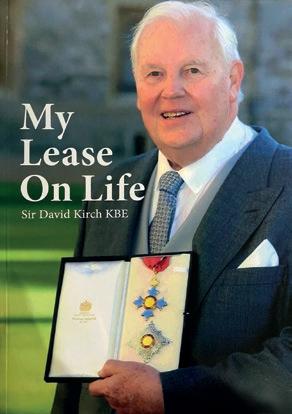
Lord Christopher Bellamy QC (Sc 59-64) has been appointed by The Queen as Parliamentary Under Secretary of State in the Ministry of Justice and will become a peer. He also chaired the Independent Review of Criminal Legal Aid which reported to the Lord Chancellor in January 2022.

Sebastian Payne (FH 60-65) has retired from The Wine Society after 49 years. He started in the wine trade on leaving Oxford in 1970, joined The Wine Society in 1973, became a Master of Wine in 1977 and was chief wine buyer for the society from 1985-2012. The Wine Society chairman said that he was ‘a colossus of the wine trade and the Society’.

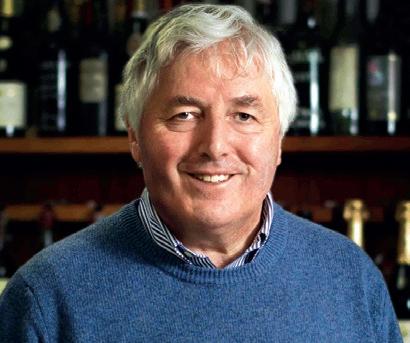
Peter Bourne (MH 63-67) and his son Jonathan Bourne (MH 96-01) were profiled in a Daily Telegraph magazine article on village cricket. They both play for Newenden CC on the Kent/Sussex border and work together in the family’s quarrying and landscaping company, whose lorries can be seen regularly on the roads of the south-east and beyond.

Gerald Corbett (JH 65-70) stood down in September 2021 as Chairman of Marylebone Cricket Club after six years in the post. During his tenure he carried through significant governance changes and re-building projects, as well as steering the Club through the worst of the pandemic.
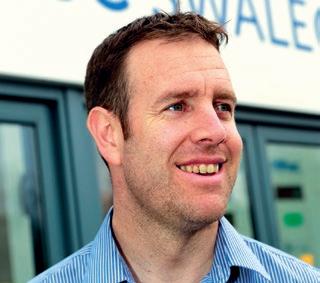
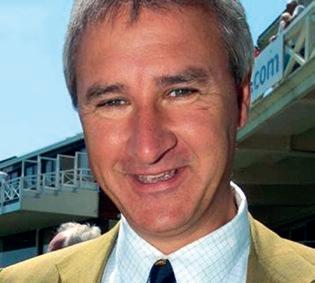

Craig Frederick (PS 72-77) is Offshore Project Manager for Boskalis Subsea, dredging and marine experts working in over 90 countries. A professional diver since 1980, he has worked all over the world on contracts for companies like Shell and Bibby, joining Boskalis as Diving Superintendent in 2018.


(FH 93-98)
Colonel Seb Pollington (PH 80-85) is working for NATO Allied South Forces Joint Command in Naples. He has also exhibited as a late career artist (prompted during lockdown) at galleries in Britain, Switzerland and in this summer’s Venice Biennale, working in acrylic and oil on landscapes, urban and coastal settings, especially in Italy.
Andy Bell (HS 76-80) can be seen regularly on television as Political Editor for ITN Channel 5 News, where he has been for more than a decade. He previously worked for the BBC as their Paris correspondent and as Foreign Affairs correspondent for The Today Programme




Hamish de Bretton-Gordon (MH 77-82) has been a regular commentator on news channels about the Russia-Ukraine war. A former army officer, who commanded the UK’s Chemical, Biological and Nuclear Regiment, he is now a visiting fellow at Magdalene College, Cambridge and an expert who advises the government on chemical and biological warfare. His memoir Chemical Warrior was published in 2020.

Nicholas Kitchin (MH 81-85) is Vice President in Pfizer’s Vaccine Clinical Research and Development group and was closely involved in the trials of the Covid vaccine. After a medical degree at London University, he joined the pharmaceutical industry in 1994, specialising in the development of vaccines, and joined Pfizer in 2011.
Jim Nolan (MH 81-86) is founder and CEO of the Black Dog Hill Vineyard at the foot of the South Downs near Ditchling in Sussex. After a career in the City, Jim now produces acclaimed vintage sparkling wines. He has also set up the Hairy Dog Brewery in the same area. He still plays cricket at Ditchling with other members of the Nolan family.
Dominic Jermey (SH 80-85) has been Director-General of the Zoological Society of London since 2017, following a career as a diplomat. His last diplomatic posting was British Ambassador to Afghanistan from 2016-17.


Jonathan Arscott (PH 83-88 and CR 2005-18) is Head of Enrichment at the Cambridge International School in Bratislava, Slovakia. His previous appointment was in the English department at Marlborough College, Malaysia.




Sean Buchanan (JH 83-88) is an Executive Director at Novartis Pharmaceuticals, leading an oncology-focused drug discovery team in San Diego, California. His team of about 120 scientists from various disciplines has the ambition of finding new and transformative medicines to treat cancer. Their particular interest is to exploit new developments in the understanding of cancer genomics to destroy tumour cells but not normal cells.
Simon Hall (WW 84-89) has recently joined Tonbridge’s governing body following the merger with The New Beacon, where he has been a governor since 2013. He has worked as an economist at the Bank of England for 25 years, specialising in monetary policy and issues relating to financial stability. He has also worked on committees overseeing global banking rules.

Chris Hollins (WH 84-89) hosted a new series on Sky Sports on ‘Golf’s Greatest Holes’,

Advice,
Jamie Singer (PH 85-90) and Chris Walsh (PH 89-94) are two of the partners at boutique sports law firm Onside Law and they have been joined there recently by George Cottle (CH 05-10) and Alex Clarke (OH 04-09) Among Onside Law’s clients are the England and Wales Cricket Board, European Tour golf, the Lawn Tennis Association and West Ham United.

(SH 87-92)
Mark Church (SH 87-92) is a commentator for BBC Radio London, commentating on all matches played by Surrey County Cricket Club. During lockdown in 2020 he combined home schooling of his daughter Isabelle with his own love of cricket by producing videos with her in which they share commentaries on classic cricket moments of the past.


Ross Avery (MH 91-96) is Finance Director of Waitrose and Director of Strategy for the John Lewis Partnership. He has worked for Waitrose since joining them as a graduate trainee in 2000.

Will Goldsmith (FH 91-96) has been appointed Head of Bedales School in Hampshire, where he has previously been Deputy Head (Academic). He started teaching English in the state sector before becoming Director of Teaching and Learning at Latymer Upper School.

Duncan Elliott (HS 91-96) has been appointed Global Brand Director


Entain, the betting and gaming business. He still turns out for the OT Football
and organises a WhatsApp group for 40 of his Tonbridge year.
Sumeet Nindrajog (MH 92-97) is the co-founder and partner of Paragon Partners, India, a leading India-focused private equity investor. After Tonbridge, Sumeet took a Business and Finance and Management degree from the Wharton School at the University of Pennsylvania before returning to a business career in Mumbai.

Dan Jarvis (MH 94-99) has been working in the tech sector in the USA, including two small start-ups in San Francisco. He has just started working remotely from Northern Virginia as a software engineering manager at Meta (formerly Facebook).


Matt Banes (WW 93-98) and Tim Marriott (CR 1989-1991) have collaborated on writing Jack’s Ashes, a new play about the mental frailties which can beset professional cricketers. Matt is Director of Boarding at Cranbrook School, Sydney and Tim is a producer and performer of drama with his company Smokescreen Productions. Other Sydney residents include Alex Howeson (PH 00-05), living in Bondi and working for a mortgage broking company; and Richard Hawkins (MH 88-93) who is a sports and media lawyer with Bird and Bird, following a spell as general counsel for Rugby Australia.

James Chan (PS 94-99) is working at Stoke Mandeville Hospital and the National Spinal Injuries Unit, where he is currently the consultant and research lead in plastic surgery. He has also been hosting the Stoke Mandeville Plastic Surgery webinar series.
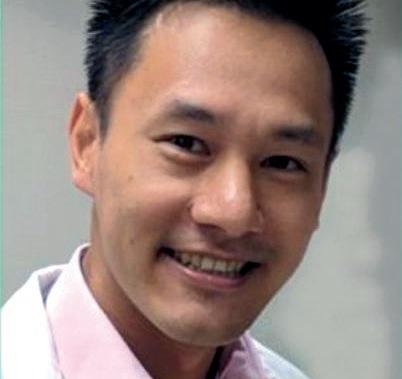
Christopher Ward (WW 94-98) is now Generalmusikdirecktor of Theatre Aachen in Germany and the Aachen Symphony Orchestra. The appointment of an English musician to such an important position created headlines in the German press. He has previously worked as conductor for the Bavarian State Opera.

Dan Stevens (MH 96-01) now lives in Los Angeles and has been cast in Gaslit, a new five-part American series about the Watergate scandal in the 1970s. He plays the part of John Dean, President Nixon’s lawyer at the White House who pleaded guilty to his role in the political cover-up.
James Coppin (WW 96-01) was awarded the OBE in 2021 for services to the vaccine taskforce. His role as executive director of UK Government Investments led to him negotiating agreements with vaccine manufacturers to secure vaccines and manufacturing capacity as part of the government’s response to the pandemic.

Major Matthew Paterson (MH 97-02) is currently posted to the Ministry of Defence, working on the planning of strategy and operations. Since he arrived there in August 2020, these tasks have included military support to COVID, the Afghanistan withdrawal and the Russian invasion of Ukraine. He is currently seconded to the Cabinet Office working on the latter problem, preceded by 18 months as a tank squadron leader with his regiment, the Queen’s Royal Hussars. His next posting will be as the Chief of Staff of 12 Armoured Brigade. He lives in Leamington Spa with his wife Annabelle and their two girls.
His brother Graeme Paterson (MH 03-07) is an army doctor, currently with the Scots Guards Infantry Battalion in Catterick.

Jonathan Atkinson (PS 00-05) is a barrister specialising in criminal law. He is recognised by Legal 500 as one of the leading juniors in crime on the south-east circuit, prosecuting and defending in the full range of serious criminal offences.

Tom Lindsell (WH 03-08) works in the Civil Service and is currently Chief of Staff to the Permanent Secretaries in the Department of Transport. He was previously a deputy director in the Covid-19 task force on borders and international travel.

Harry Cole (SH 03-05) is Political Editor of The Sun, having been Deputy Political Editor at Mail on Sunday He collected the London Press Club ‘Scoop of the Year Award’ on behalf of The Sun for the paper’s coverage of the sexual harassment scandal at Westminster.
Jamie Tym (MH 04-09) has been working for the Government’s Covid-19 Task Force in the Cabinet Office for the past year and a half. This is the group of civil servants reporting directly to the Prime Minister on Covid policy. His first task was to coordinate the December lockdown. Before that, he was Head of Office to the Minister in Defra – the environment department – supporting him in Parliament and working on the negotiations to leave the EU.
Ed Bugge (PH 00-05) lives in Los Angeles and is a partner in one of the leading west coast music entertainment law firms, Hertz Lichtenstein Young and Polk LLP, representing leading companies and talent in the media and technology industries. He was named one of Billboard’s Top Music Lawyers in both 2021 and 2022. One highlight has been a weekly football game at the house of Rod Stewart where Ed has been able to renew his goalkeeping skills.

James Johnson (CR 2005-2016) has been appointed Headmaster of Taunton School for September 2022. He is currently Head of the Senior School at Ardingly College.

Freddie de Tommaso (WH 06-11) has taken the tenor lead in the Royal Opera House’s production of Tosca, an achievement which saw him profiled in an interview in The Times in December 2021. He has also produced a debut album, Passione.
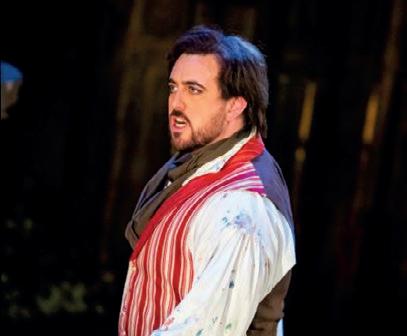
Will Heilpern (WW 06-11) is Political Adviser to the Shadow Foreign Secretary David Lammy.
Richard O’Grady (MH 08-13) has spent the last four and a half years in Berlin, working for Le Wagon, a tech education company teaching computer programming. He has been playing for one of the 72 cricket clubs in Germany, mostly linked with the Asian community.

Theo Dodds (WW 08-13) has been awarded the Royal Navy’s Young Sportsperson of the Year in December 2021 for his performances with the Navy’s rifle shooting team.
Ben Jeffries (SH 09-14) has been listed by Forbes Magazine as an ‘under 30 European media and marketing moguls of tomorrow’. His company Influencer translates media strategies into influencer campaigns for key brands like Starbucks and Superdry.

Liam Porritt (WH 09-14) is a trainee solicitor at Clifford Chance but has become better known for his YouTube channel sharing career advice and lifestyle tips for junior lawyers. He has over 100,000 subscribers and is known as a ‘Lawfluencer’.

Richard Calver (MH 10-15) is moving from Bryanston School to teach maths at Haileybury. His degree subject was in classics but he switched to maths teaching after a year at Bryanston.

Ben Earl (FH 11-16) has been voted Gallagher Premiership Player of the Year. He has been playing in the Premiership for Saracens after being loaned to Bristol Bears in the previous season. Luke Wallace (MH 04-09) and George Head (FH 12-17) have both made appearances for the Harlequins 1st XV in the 2021-22 season. Luke made his debut for Harlequins in 2010 and George in 2019.


Harry Redding (HS 11-16) has been playing Jem Finch in the much-acclaimed West End production of To Kill a Mockingbird at the Gielgud Theatre, starring Rafe Spall.
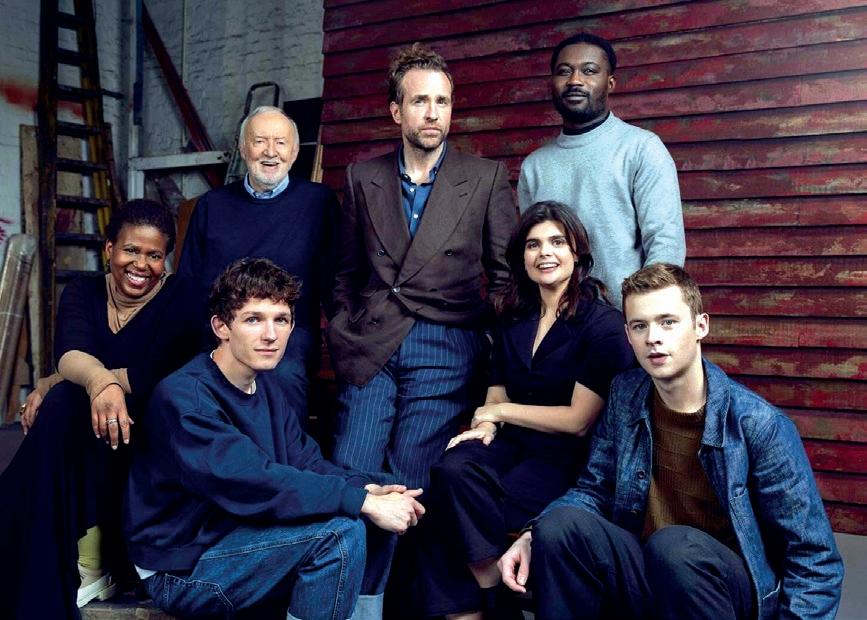

Zak Crawley (WH 11-16) has been playing for England in the Test series against New Zealand. He also played in Test series against Australia and West Indies during the winter.

Marcus O’Riordan (FH 11-16) and Toby Pettman (WW 11-16) represented MCC in an international cricket tournament in Spain in December 2021. Marcus plays professionally at Kent CCC and Toby at Notts CCC. Toby is probably the only current county cricketer with a double first in Classics from Oxford University.


Ed Hyde (FH 11-16) is President of the Hawks Club at Cambridge University and was Vice Captain of the cricket club in 2021. He has also taken over the responsibility of running OT cricket.
Alex Moen (FH 13-18) is Captain of Cambridge University Cricket Club. He is also Captain of the rackets club and won a hockey blue this year after playing hockey in previous seasons for Old Holcombeians, a National League club. Magnus Sesodia (CH 14-19) also won a hockey blue, for Oxford, who won the game 3-1.
David Wilkinson (OH 2012-17) played at fly-half in the winning Oxford rugby side against Cambridge at Twickenham in March. He was in the Tonbridge XV which won the Champions Trophy in 2016.

Alex Barone (JH 14-19) competed in the Moth Class at the World Sailing Championships on Lake Garda in summer 2021 after winning the UK National Junior title. He is a student at Cardiff University studying mechanical engineering and is in the university’s high performance sport programme.
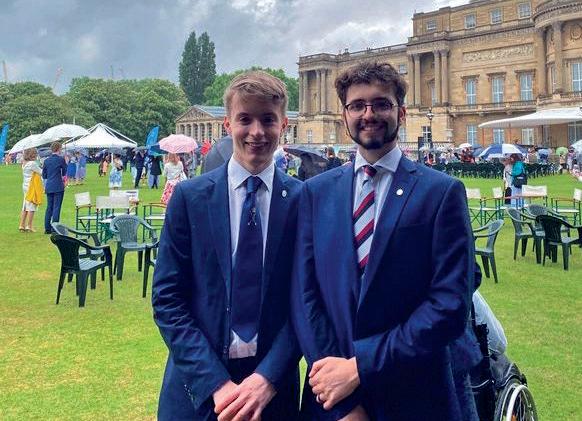


Alex Bamford (JH 16-21) is on a football scholarship at Marshall College, West Virginia, one of the best college football teams in the country.

Alex Cheuk (Sc 82-87) reports that the Hong Kong OT Christmas was back with a bang after two years. He believes it was the largest OT Christmas gathering so far with 38 OTs coming together for a reunion in Hong Kong. The alumni guest list comprised a broad spectrum of age ranges from Martin Clinch, Manor House, Class of 1956 to Calvin Cheng, Parkside, Class of 2020 and every age in between. The dining tables at the venue were aptly named after Tonbridge Buildings: Barton Science Centre, Smythe Library, Skinners’ Library and Old Big School.
Alex has managed to arrange OT drinks on a quarterly basis for the past five or six years (except sadly last year due to COVID) the purpose of which is to bring back old memories, enhance ties with Tonbridge School and to gather a group of senior and junior OTs to share their experiences, to mingle and to network. There are many professionals in the group and the more junior OTs can glean experience and information from the more senior ones.
After the Christmas dinner, further gatherings were hit by Hong Kong’s tough Covid restrictions. Meanwhile there is news of individual OTs working in Hong Kong:
David Wong (MH 93-95) is working as Head of North Asia Banks at Fitch Ratings. With travel curtailed, David has been busy exploring the quieter side of Hong Kong with his wife and three young children, aged three to ten, adding a RYA Yachtmaster Offshore (theory) and marine radio licenses to his Divemaster qualification.
Simon Roberts (SH 72-79) is Chairman of Sheffield Haworth, Asia Pacific. He relocated to Hong Kong in 2009 to become head of Sheffield Haworth’s Asia Pacific platform. Simon focuses on senior roles in Corporate & Investment Banking, M&A, Coverage, Capital Markets and Private Equity across Asia Pacific.
Dennis Chen (PS 95-00) is currently working as an Executive Director of Equity Delta One Sales in UBS in Hong Kong. After Tonbridge he studied Accounting and Finance at the London School of Economics and then worked in a number of global investment banks in both London and Hong Kong.

Daniel Ng (MH 01-06) is a partner in the dispute resolution team of the Hong Kong office at Norton Rose Fulbright (a global international law firm). His wife Citrine has recently given birth to a baby boy.
Cecil Kwong (MH 97-99) is a partner of law firm Kwok Yih & Chan in Hong Kong. After Tonbridge, Cecil studied law at the London School of Economics and then became a lawyer in Hong Kong. He was appointed by the Government of Hong Kong to several governmental bodies.
Ed Moncreiffe (HS 96-01) is the CEO of HSBC Life (International) Limited and is the Chairman of the Hong Kong Federation of Insurers. He was recently appointed as the Chairman of the Matilda International Hospital, one of Hong Kong’s most prestigious private hospitals.
Christopher Wong (PH 97-01) is an Executive Partner of Gall, a leading disputes resolution law firm in Hong Kong. He has received numerous accolades and internationally recognised awards for his work in the legal industry.
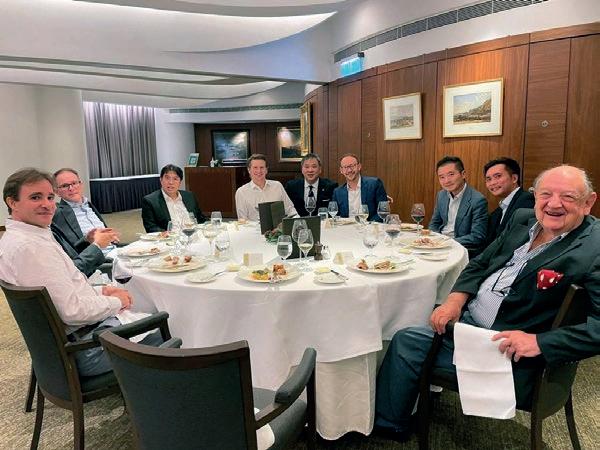

Dominic McMullan (PH 92-97) writes about a sunny Sunday in Brooklyn in May, a strange backdrop to be remembering a dinner from the depths of November last year. A reflection, perhaps, of my administrative capabilities but also arguably the right headspace to look forward to more, less complicated gatherings of the US Chapter of Old Tonbridgians. For those of you not familiar, the first US OT Dinner took place in 1989 in New York City. Since then and for the following 25 years it was ably (and admirably) organised by Ian Hooper (Sc 55-59) and Chris Parkinson (Sc 56-61).
While it has always been a smaller affair than the annual dinner in the
UK at Skinners’ Hall, Ian and Chris wanted to ensure it reflected the spirit of the UK event – it was a black-tie affair and the New York City venues that hosted us were venerable. With that said, the US OT Dinner has always been a more inclusive event than the one in the UK, so partners have always been welcomed. Your correspondent even brought his mother to one dinner. As you would expect, she was warmly welcomed.
Typically, we have been joined by a representative or two from the School for the event. The Headmaster, James Priory, joined us in 2019 and Andy Whittall has been a regular for several years. Recent guests also included
the School’s previous headmasters, Martin Hammond and Tim Haynes as well as David Tennant and Kay Moxon from Common Room.
In 2016, your correspondent, alongside Ignacio Jayanti (Sc 81-86) took over the responsibilities for hosting the dinner. Since then, we’ve essentially kept the format the same though given up on the black-tie dress code (perhaps a comeback in 2022 is in order?). We’ve also hosted dinners at a variety of new locations including The Crosby Street Hotel. We were forced to cancel in 2020 due to the pandemic but we were able to organise the event for 2021. So, on Friday 5 November, the US Chapter of the Old Tonbridgian Society gathered in the Copa Room, at Avra Madison Estiatorio in midtown Manhattan. Google tells me it’s an upscale Greek seafood eatery with fresh fish by the pound, villa decor and expansive outdoor seating. I don’t remember the outside seating but the rest sounds pretty accurate (to be fair, it was six months ago!). Much like the UK OT Dinner, drinks flowed, the food was very tasty (though no welsh rarebit for dessert) and the conversation was invigorating. We had a jolly good time. So much so that those in attendance totally forgot to take the obligatory picture to commemorate the occasion!
Now well into its third decade of existence, the mission of the US OT Dinner remains reassuringly unchanged: to bring together a group of folk from across this enormous country, that are bound, for better or worse, by their shared educational history. We’ve welcomed OTs (and their partners) from the west coast, upstate, down south and all those bits in between. This year’s dinner will be no different. We welcome anyone that is either here permanently or just passing through town. This year’s venue is still to be confirmed but for those who like to plan ahead we are shooting for Saturday 15 October.
Sir Tim Waterstone (JH 52-57) returns to Tonbridge
In March one of Tonbridge’s most distinguished alumni, Sir Tim Waterstone, returned to the School for the first time in many years to be interviewed in Big School by James Priory, as part of the Tennant lecture series. The published title was ‘Can the Book Survive?’ but the interview covered a wide range of Sir Tim’s life experiences.
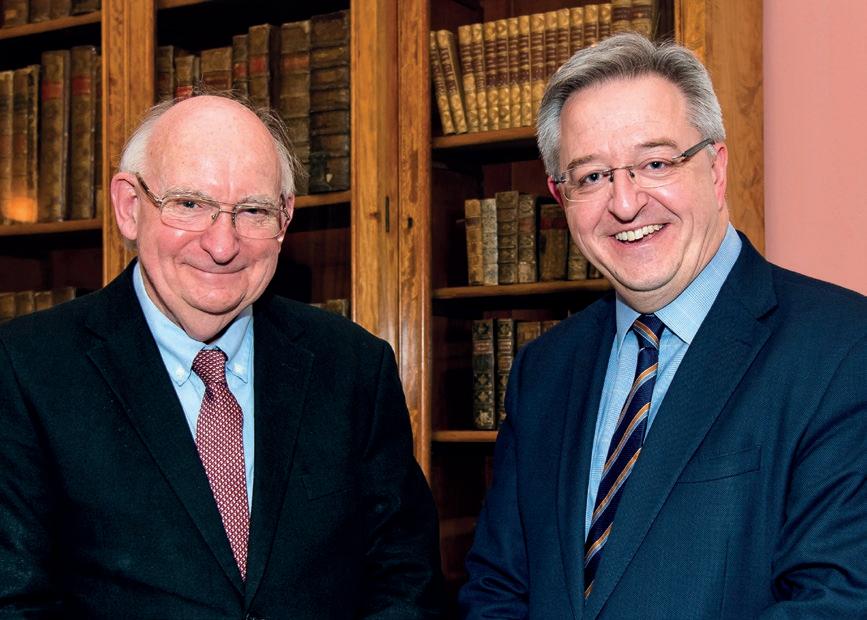
It was 70 years since Sir Tim had come as a boy to Tonbridge and the occasion was certainly special. James began by asking him what it felt like to be back at Tonbridge and the answer was wholly positive, as his memories of school were happy ones. He was amazed at the development of the campus, characterising the main
changes since the 1950s by comparing the ‘Olympic-sized pool’ in the Sports Centre with the old outdoor pool off the Shipbourne Road where he remembered having to cope with rusty metal poles, chipped tiles and a total lack of health and safety. He also wistfully recalled his housemaster’s report: ‘Not, I think, a boy of advanced ability, and mildly subversive, but he does perfectly well.’
Born in 1939, Sir Tim was a wartime baby, with a father away in the army, making it difficult to establish any close relationship with him, a difficulty which persisted. In 1946 his parents went back to India to run a tea plantation, Sir Tim aged six seeing them off at Tilbury on the boat and then being put into an indescribably
‘The value of a physical book is that it is something lovely to give as a gift, and they are like old friends in your own home too.’
awful prep school run for the confinement of colonial boys like himself. His parents did not come back until 1948 and settled in Crowborough, then a small town of about 2,000 people. Here Sir Tim, now aged nine, and in a home largely without books, discovered ‘The Book Club’, the local bookshop run by a lady who loved literature and taught him how to read and what to read. He ran delivery errands for her on his bicycle and this relationship sparked his love of books and bookshops.
This passion continued at Tonbridge where he was well taught in English and won the Floyd Literature Prize. His light bulb moment came in the one-on-one inspirational literature tutorials he had with Valerie Austin, newly down from Cambridge, and particularly when she gave him a short story to read by D.H. Lawrence, The Odour of Chrysanthemums, questioning him exactingly about its meaning. For a term after leaving school, he loved teaching English at Gresham’s in Norfolk, where Logie Bruce-Lockhart had just gone from Tonbridge to be Headmaster, and he then went to Cambridge to read English. Here his visits to Heffers bookshop gave him the vision of wanting hundreds of such shops more than 20 years before such concept came to fruition.
After university, he worked in marketing, latterly for WH Smith, where he became Marketing Director. In 1981, at the age of 41, he was fired from the company ‘for not being a team player’, and this was the opportunity for him to embark on making his Cambridge vision a reality. He already had his business plan written for establishing a chain of bookshops, but he had only his redundancy payment of £6,000 and a huge number of other financial obligations, including school fees. He managed to find financial backers via helpful banking contacts and set up his first Waterstone’s store in Old Brompton Road, London, in 1982. His intention was to get big very quickly and ten years later Waterstone’s had grown to be the largest bookselling chain in Europe. He admitted to following the Marks and Spencer model, believing they had a similar

profile and opening stores wherever M&S had gone. The number of stores in 2022 has now climbed to over 300.
This process was based on much financial risk but also a shrewd understanding of how to make a new business grow. A key element of this understanding was cultural. Sir Tim saw a sector ripe for revolution, its general standard ‘abysmally low’ apart from some beacons of excellence in university towns, like Blackwell’s in Oxford, and with WH Smith dominating 40 per cent of the book market. Yet that book market was showing consistent growth and he modelled his plan on what he had
Sir Tim saw a sector ripe for revolution, its general standard ‘abysmally low’ apart from some beacons of excellence in university townsSir Tim takes questions from the audience at the end
of histalk
seen in New York, where the standard of bookselling was much higher – big bookshops packed with lots of stock, open long hours and every day, and mainly staffed by young people straight out of university whose enthusiasm drove the business forward.
Persuading publishers to let him have enough stock was a challenge until Penguin took the first big risk, giving him a very high discount, long lines of credit and heavy loads of stock. Their initial successful punt persuaded other publishers to follow suit. The 1980s did not have much in the way of literary festivals, but that decade saw the emergence of a host of brilliant
new writers like Julian Barnes and Martin Amis, and branch managers were encouraged to hold their own mini-festivals and book signings to encourage interest, part of the cultural revolution in reading and book ownership which Waterstone’s helped promote.
The interview moved on to the future of the book in the digital age. Sir Tim recalled that things looked gloomy 15 years ago, with the book business looking likely to go the way of the music business. But e-reading on Kindle and other devices has actually declined over that period from a high of 25 per cent to 8 per cent, and the physical book has recovered across the world. Partly he puts this down to screen fatigue with ‘people spending so much of their lives looking at screens that it is a relief to turn to a physical book’, but also publishers ‘have made books beautiful again … with lovely boards for covers, really good quality paper and illustrations. The value of a physical book is also that it is something lovely to give as a gift, and they are like old friends in your own home too. E-books just don’t give the same joy.’ Amazon poses a serious challenge to Waterstone’s, but it does not offer the opportunity properly to browse, and, when people browse, they end up buying more books. The excellence of the British publishing sector has helped the book market stay healthy, but challenges continue, not least how the decline of the High Street threatens the footfall in Waterstone’s shops.
In his recently published memoir, The Face Pressed Against a Window, copies of which Sir Tim later signed for his audience, he reflects on his childhood and what inspired him to follow the career path he took. An insightful moment in the interview revealed how Sir Tim was persuaded by a financial backer to use the name ‘Waterstone’s’ rather than the ‘Chelsea Stores’ which he had originally chosen, perhaps demonstrating at last to a distant father that the name really meant something. For his audience, and Tonbridgians more widely, it was an occasion to savour and a reminder of how that name ‘Waterstone’s’ has helped improve the cultural lives of many people. ■
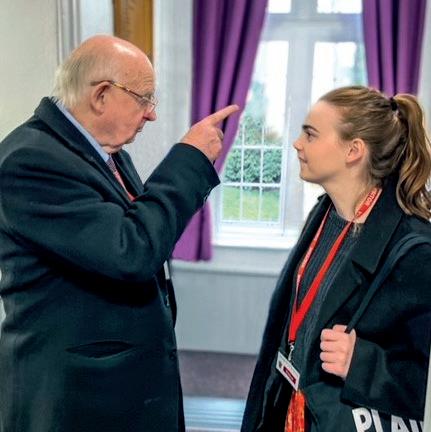

David Kemp, who gave so much to Tonbridge as boy and man, is remembered by David Walsh (CR 1972-2009)
David Kemp died on 23 September 2021, at the age of 92. David was born in Bromley in 1928 and went to Bickley Hall prep school before coming to Parkside in 1942.
For the next 79 years, Tonbridge was where he made his life, except for a short period at Oxford and in London. In the wartime school, his life was shaped by austerity, with rationing of food and most other necessities of life, which gave him a lifelong dislike of extravagance and profligacy. He flourished academically and made the most of the sporting opportunities at the School: he was in the Cricket XI in both 1946 and 1947 alongside Colin Cowdrey, played for the 1st XV in the 1946 season, and captained the Squash team in 1947. He also took the lead role in the School production of The Mikado, giving him what his family recognised as a lifelong obsession with Gilbert and Sullivan. His stellar school career culminated in his appointment as Head of School by Eric Whitworth, the Headmaster, who David idolised for the rest of his life. Whitworth gave, in his Skinners’ Day speech in July 1947, a tribute which could apply to the whole of David’s life: ‘Kemp has adjusted himself and his use of time with perfect judgement to his work, his responsibilities and his recreations’.
After leaving school, he did two year’s National Service in the Duke of Wellington’s Regiment, and then went up to Brasenose College, Oxford in 1949 as a Smythe Exhibitioner. Here he played cricket for Oxford’s second team, the Authentics, and came close to a squash blue. He took his BA in 1952 in Jurisprudence, joined a firm of London solicitors as an articled clerk and was admitted a solicitor in 1956. In this period as a lawyer he worked for Sidney Bernstein, when he was setting up Granada TV, and Sidney could never understand why David decided to change careers.
In the summer of 1956, his life took that different turning when he went to watch the Tonbridge v Clifton match at Lord’s and was persuaded by Lawrence Waddy, the headmaster, to return to Tonbridge as a teacher, two years incidentally after his great friend Mike Bushby came to Tonbridge. Tonbridge was a much smaller school in 1956, just 500 boys and 39 teaching staff, so young bachelors like Kemp and Bushby took on a multiplicity of roles. David threw himself into the life of the School –teaching classics, house tutor in Ferox and master i/c hockey, but also coaching squash, rackets and cricket, and taking charge of both the horse-riding club, and the motor transport section in the CCF.

In 1966 he married Marion and they had three children – Anthony (now deceased), Will and Peter. In 1969 he and Marion moved into Park House, where they were to remain for a full 15 year term until 1984. Chris Cowdrey, who was a boy in Park House and David’s godson, recalled him as a Housemaster: ‘David had a natural empathy for boys’ individual strengths. He knew how to get the best out of every boy and exerted discipline, when necessary, with a reassuring calmness. He did not need to raise his voice or threaten anyone. In fact he did not like to issue punishments at all if it prevented a boy from progressing in school life or, even worse, missing a sporting fixture.’
David loved the cut and thrust and banter of the classroom. His academic record shows that he was a strong classicist, and his law option was always oversubscribed, but he enjoyed most that pastorally valuable role of novi form master, treating all boys as individuals, with tolerance, humour and insight. He was also very much the master of the red herring, whether planted by his pupils or more often by himself, and usually involving cricket. There was, for instance, a competition initiated by David to see who could bowl crumpled bits of paper most accurately into a waste bin. He was also very kind to
those who struggled, suggesting that they must have what he called ‘strengths in other areas’.
At the heart of David’s strengths as a schoolmaster was a sure instinct, an innate understanding of the hopes and anxieties of vulnerable adolescents and an unshakeable belief in the maintenance of those standards which had always stood him in good stead. You never heard from him a word of malice, but many of quiet wisdom and of support in the good and the bad times, and this continued as Second Master when Robert Ogilvie appointed him to that position in 1971.
It would be unthinkable today, in this era of ever larger senior leadership teams, to have a Second Master like David who continued as a boarding housemaster, teacher of a full timetable and sports coach in all three terms.
David’s own recollection of his interview with Robert Ogilvie about his appointment as Second Master included being told that the role and responsibilities would not be demanding, and that the Governors would not allow any increase in his salary. He much enjoyed working with Robert, but there was no such thing as a job description in those days or anything on paper about the Second Master’s set areas of responsibility. ➽

David was very much the master of the red herring, whether planted by his pupils or more often by himself, and usually involving cricket
His partnership as Second Master with Christopher Everett from 1975 to 1989 represented the peak years of his career, to be crowned with his appointment as Acting Headmaster for two terms between Christopher’s departure and Martin Hammond’s arrival. Christopher found himself in constant dialogue with David on every aspect of school life and his own ideas were shaped by David’s deep knowledge of the School, its aims and values. David’s long membership of the Skinners’ Company, and the respect in which he was held by powerful senior governors, also helped when big decisions had to be taken such as the sale of the Fifty or the building of the new School House. David was a supreme tactician behind the scenes, his ear close to the ground within the School and outside. In cricketing terms he was the master of the quiet nudge into the legside to keep the scoreboard moving or sometimes the solid forward defensive to resist an unwanted proposal.
In the educational world David had this ability always to see the wider picture. He had a capacity for making multiple lasting friendships with colleagues in other schools who kept him well informed about ideas he should be considering at Tonbridge. Whenever one met a senior
figure from another school at an away cricket match or somewhere, the question would always be, ‘how is old Kempy?’. His was the schoolmastering era of the carefully crafted letters rather than email or text, common sense rather than regulation. The era of multiple school policies only accelerated after David retired, but he was a walking, talking book of policies in himself, and always shaped to the individual situation. His legal training meant that every decision was carefully weighed, so he was calm, took his time and always came up with a kindly and humane solution. It is an irony that he retired one year after the Children Act became law in 1989, putting the welfare of the child as the paramount concern for schools. For David the welfare of the child had always been paramount and no statute was needed to keep him to that mark.
His time at Tonbridge achieved its consummate moment for the two terms in which he was Headmaster in 1990, a perfect, brief episode when he could emulate his hero, Eric Whitworth. It showed that he should have been a headmaster for many years, if he could have torn himself away from Tonbridge – decisive, approachable, conciliatory and it all seemed so natural. Staff were

confident in his judgement and comfortable in his and Marion’s generous hospitality. He had that instinctive understanding of teachers and boys, non-teaching staff and governors, the nuts and bolts of how Tonbridge worked. When he preached in Chapel, he revealed the quiet and understated certainty of his faith, which brought him to Chapel on such a regular basis. At the end of his final term, he received a vast outpouring of gratitude and emotion.
After David retired, he found plenty to do in cricket, in school governance, in local service and in the activities of the Skinners’ Company. He became President of the Tonbridge Civic Society, and a member of the Tunbridge Wells Health Authority. He governed Tonbridge, Judd and Claremont schools, but his most remarkable period of governance was his 34-year term at Marlborough House prep school in Hawkhurst, 24 of them as Chairman. He joined the Livery of the Skinners’ Company in 1954, became a member of the Court and Renter Warden in 1992, and Master in 1997, involving himself not only in school governance but every other aspect of the company’s business. His outstanding attributes are recalled as calmness, attention to detail, modesty, quiet sense of humour and his capacity for friendship across the whole range of the Company and its staff. In his own way David contributed much to keeping fresh the relationship between the Skinners’ Company and the School, as the governance of the School became more devolved. He also became fully involved in the activities of the Old Tonbridgian Society as its President and was
present at virtually every OT event and meeting in the past 50 years. Engagement with the young was why David came into teaching, and the ever-widening pool of former pupils with whom he kept in touch kept him sustained and renewed through his 30-year retirement.

Cricket was the game which he loved most. At school he had two years in the 1st XI, described by Peter Bathurst as ‘a solid careful opener, not vastly productive but always staying around while useful runs were scored’. He played plenty of good wandering cricket for clubs like the Band of Brothers, Free Foresters and Yellowhammers, but it was Old Tonbridgian cricket which most came to absorb him and he was a member of the committee which set up the Cricketer Cup in 1967, serving as a Vice President of the competition until his death. He took delight in the phenomenal success of the OTs in this, often scoring for them in his clear, neat hand.
In 1992 he became President of Kent County Cricket Club and then its chairman from 1994-98, presiding over success in the Sunday League, high places in the County Championship and ensuring the business affairs of the club were in good order. These were voluntary unpaid roles, driven by his strong sense of duty and responsibility, and his love of cricket.
A memorial service for David was held in Chapel on 20 November 2021, attended by more than 400 people, to thank him for his life of dedicated service to Tonbridge School and many other institutions of which he was part. Eulogies were given by David Walsh and by Chris Cowdrey, and there were readings by Peter Kemp, Christopher Everett and James Priory.

■
He had that instinctive understanding of teachers and boys, non-teaching staff and governors, the nuts and bolts of how Tonbridge workedDavid Kemp, Colin Heathcote & Mike Bushby Colin Cowdrey & Anthony Hudson with David Kemp
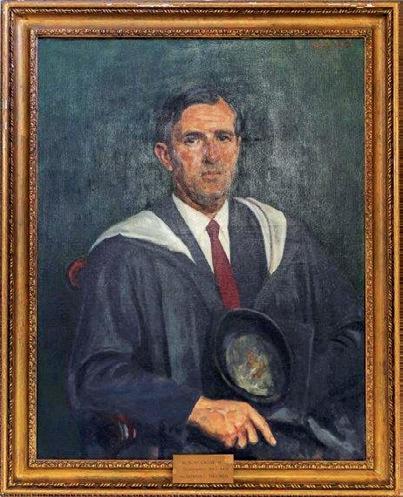
David Walsh asked me to provide some reminiscences of my schooldays for the OT magazine. Sorting through the box files that chronicle my life, I came across the following, written on my last day at Tonbridge in 1968. I offer it here exactly as I wrote it together with some concluding observations:
And so it is all over. Suddenly and finally, with the last verse of ‘Lord dismiss us’. Experiences, places and events once strange and puzzling have become familiar and commonplace – only to recede into obscurity again. Those Big School gatherings at the beginning of every term, the Monday morning routine with its one man Bible bashing or sermonising followed by the complaint for the week. Chapel –boys pouring in and pouring out, staring at each other across the aisle; the masters’ gowns with their red and white hoods with here and there a flash of green or purple revealing a less exalted academic pedigree. ‘If we say that we have no sin we deceive ourselves and the truth is not in us’. Fiddling with service sheets,
surreptitiously doing last night’s prep, ‘Dearly beloved brethren’, whispering, rustling, soon to be drowned by the organ and the alleluias.
The classrooms with their hard, backbreaking, attention forcing desks. The sound of chalk and talk, chalk grinding on the board, talk falling on the bored. The bell –merciful bringer of respite and release – and then the rush, ferdies bulging and falling apart at the seams, to another classroom to more talk. Break: a time for chewing (but only round the Grubber), talking, walking, reading notices, notices, notices: ‘the following will report to the Niven room…’, ‘the following will see me…’, ‘the following will read their notices…’.One hour’s gardening, a thousand words please, circuits, units, cold showers. You’re cutting periods, you’re cutting exercise, you’re cutting Chapel, CUT YOUR HAIR! Rules and regulations: leaves off and leaves for, order forms and formal orders. ‘All roofs are out of bounds without special written permission’.
Sport: the long wait to go in to bat in J3 and the 30 seconds at the wicket before heading back again; the Head on a summer’s evening, the sun throwing shafts of light across the green turf. Rugger on the Fifty (‘it’s jolly hard work and it’s jolly good fun’ – actually it isn’t, especially in the scrum); rows of barges lining the pitch, their occupants shuffling in the cold wind. Oars cutting through the Medway; the smack as glove
meets ball in the fives courts; house vests flying past in the 220 yards. Over at Yalding they’re hoisting the mainbrace. The Corps: parade advances in review order with webbing, boots and gaiters, shirtsleeve orders and arduous training. And so we run, jump, skip and march our way through the afternoon.
Back to the houses and their corridors with cubies, studies, dormies and more corridors. Beethoven’s Fifth mingles with The Rolling Stones, Test Match Special with Ionesco. Ping pong and prep rooms, bathrooms and billiards, posters and pin ups, rows of tooth mugs, rows of barges, rows of rugger shirts, row after row after PADDLE FIRM. Snakes and ladders with tutors, discussions on renaissance portraiture until the early hours, debates and concerts, societies and frolics, and prep.
And at the base of it all is the School itself, that great rambling gothic labyrinth with all its nooks and crannies: the history room –haunt of scholars and smokers –the Signals’ Office (‘Hello 2, this is 3, radio check, over’); the library with its sinking foundations and beneath it the School press with its smell of blanket wash mixed with water molleton; Big School with its muffling curtains; the Chapel, resting like a battleship in smooth water, ‘fastened to the rock which cannot move, grounded firm and deep in the Saviour’s love’.
But now the vastness of the place has become its smallness. The mystery has gone – the Niven Room, once a holy of holies, is now an ordinary little room with a smell of stale beer and old milk. The obsession with the colour of socks and the type of shoe now seems a petty irrelevance. Things that were so important no longer mean anything. The faces that stared that first day are faces no longer, each one of them has a character, a personality, a story to tell. The last Skinners’ Day and the last chance to belt out that stirring and markedly Unitarian School hymn in which we thank God that beauty springs from the soil of duty (does it? Our young left wing history master certainly doesn’t think so and politely declines to sing that line).
And here, at the end, one realises how transitory it all is – like everything temporal, it passes away. Those whose separate existences were suddenly thrown together into this one community have just as suddenly been torn apart, each to pursue his individual way. For teacher and taught touch hands and part, but the School, the school remaineth… farewell, mother of sons.
What strikes me reading this now is the centrality of the Chapel in my recollections of Tonbridge – a fair indication, I think, of the lasting impact it had on me. It provided the experience for which I think I am most grateful to the School – daily exposure to the great hymns of the English church – and also the one of which I am most ashamed, when as a house prefect imbued with that obsession with correct dress that I mention above, I gave a boy a 1,000 word essay on ‘Cleanliness is next to Godliness’ for the crime of wearing a coloured shirt.
I think I was rather hard on the teaching and the classroom experience. My happiest moments at Tonbridge were spent in the Lower Sixth history and English lessons taken by Dick Bradley (no relation) in his room in the Lower Memorial corridor. He gave us ‘men’, as he called us in his wonderfully clipped ex-Royal Marine accent, a real esprit de corps – we would cheerfully have gone over the top with him – and was at the same time an amazingly sensitive, perceptive and encouraging teacher. I owe him a lot.

The Signals Section of the CCF figures prominently because it was where I found a happy billet, never happier, indeed, than when I was sitting in a shed surrounded by radio equipment and field telephones, co-ordinating and presenting the commentary on sports days and fulfilling my childhood ambitions (later fulfilled) in BBC outside broadcasting.
I didn’t mention Michael McCrum in my last day stream of consciousness, but he was of course a dominant, somewhat remote, austere and, in all senses, magisterial presence throughout my time at Tonbridge, as I imagine he was for most of my contemporaries. My most enduring memory is of him breaking down in tears while reading the last four pages of James Joyce’s Ulysses to the members of the Upper VIth. We boys, unmoved and embarrassed by the lengthy description of Molly Bloom’s orgasm, did not know where to look as the headmaster left the room, totally overcome. There was a deeply sensitive soul and a romantic heart beneath the somewhat forbidding exterior.
■
Owen Hopkins (Sc 98-03) is an architectural writer and curator, who is currently Director of the Farrell Centre at Newcastle University. Here he writes about his journey from Tonbridge to his current career roles.

Looking back, I find it striking how my memories of Tonbridge are refracted through its buildings: the dusty echoes of footsteps and voices in the maths corridor during the frantic five minutes between classes, the part homely, part institutional feel of stepping into School House the first day back after holidays, and that glorious view looking back at the School from across the Head. Striking because it was only later on – at university and then during my subsequent career – that I realised I was interested in buildings – why we build them, the ideas and circumstances that shape them, and what they mean, to whom and how this changes over time.
My initial career thoughts had pointed me towards medicine, but, despite good grades, I received no university offers (the interview panels clearly saw something I couldn’t).
At something of a loss about where to turn next, my art teachers, James Cockburn and Charlotte Chisholm, suggested I think about art history. I knew next to nothing about the subject or what it would entail but was persuaded by my teachers’ enthusiasm and the fact, as they saw, it would leave my options open. Arriving at the Courtauld Institute of Art in London, it took some time to find my feet, until by
chance I took a course on English Baroque Architecture. Discovering the work of Christopher Wren, John Vanbrugh and especially Nicholas Hawksmoor was like a switch turning on in my brain. So much so that the first time I saw images of Hawksmoor’s great churches in a library book, and with even more amazement learned that they stood just a few miles down the road, I immediately jumped on a bus to see these vast masses of brilliant white Portland stone in person.
After graduating I embarked on an MA and then a PhD – both at the Courtauld and both focused on this period of English architecture. In need of some money to help support the PhD (still unwritten), I got a job as an assistant in the architecture department at the Royal Academy of Arts. I was taken on less for any architectural knowledge I then possessed and more for some experience I had of helping run public lectures, which included, it seemed most critically at interview, being able to fix a projector.
Where the Courtauld had been academic and historical, the Royal Academy (RA) was public and contemporary. Getting to work with some amazingly talented colleagues and, through the talks and exhibitions we put on, meeting some of the world’s most eminent architects, my professional and intellectual horizons expanded rapidly. And though my role was initially administrative, the growing number of creative opportunities that came my way saw it expand, over the eight years I was at the RA, into a curatorial one.
During this time, I also began to write about architecture. My first book came through one of our lecturers at the RA who’d been asked to do a book by a publisher, but, not having the time, generously recommended me. I’m pretty certain that without this early break I’d have found my subsequent book projects – including one on Hawksmoor in 2015 – rather harder to get off the ground.

In 2016 I moved to Sir John Soane’s Museum to run its exhibitions and learning departments. Going from being a small part of a large organisation to a big part of a small one was a major cultural change. And from a curatorial point of view, the task of weaving a layer of contemporary programming into the extraordinarily congested, jewel-box like spaces of the Soane Museum was extremely challenging, yet, when we got it right, highly rewarding too.
By this time I had a clearer sense of where I was headed and in 2019 I was appointed founding director of the Farrell Centre – a new public centre for architecture and cities at Newcastle University. New city and new institution – it was a big leap, yet an extraordinary opportunity to play a decisive role in shaping somewhere from the ground up, whether this was acting as client on a £4.6 million building project, or conceiving the programmes that address local audiences while speaking to global concerns.
I sometimes wonder if I’d had a clearer sense of where my career would take me at an earlier stage, at university or even at Tonbridge, I’d have done anything differently. But at the same time, I’ve always been slightly sceptical of those peers who had their careers completely mapped out. Ultimately, a career is not about where you get, but how. And it is often only later, by looking back, that things fall into place. A plan, to my mind, is only useful if it is being constantly remade. ■
What made you want to be a rugby writer, they often ask. Good question. It was certainly not an obvious option when we were frogmarched to those careers’ events at School. I was pretty average at writing (B in English Lit) and much the same at rugby.
Iactively disliked rugby when I went to Tonbridge in 1985. I’d never played, and I was in a sulk that I couldn’t carry on with football.
When the questionnaire came round to sound out each of us about our feelings towards the sport, I ticked all the boxes that made clearest my distaste for the oval ball. So they put me in Bantams 4, the bottom game of the School.
Insofar as I achieved anything in rugby at Tonbridge, it was that I made it to the Fifty, the top game, three years later. Alas, two years on the wing for the Second XV was as far as I reached. For my final year, a dude in the year below turned up from Dulwich College for the sixth form. He said he was a decathlete, then reeled off his PBs in the ten events. They were all school records. He ran the 100m in 10.7 sec. He was 6ft 3in and built like
a Greek god. And he was a nice bloke. The bastard. He also represented the way things were going.
The Second XV may have been the limit of my achievement in Tonbridge rugby (we were unbeaten in my final year, though, which is more than can be said for the Firsts – ha!), but it did mean we had a crack sprint relay quartet that summer. We ran together only twice (delicate decathletes being the way they are) but broke the School record the first time.
Next it was off to Bristol University. First XV status was something I could only dream of there. Kyran Bracken was a contemporary. You pretty much had to be a student international to get into that back division.
By then, I was hooked on the sport, and my writing had improved. One day I volunteered to write about life at the club for the student paper, which meant

that by the end of my time in 1995 I had a cache of articles to hawk to the national newspapers on players like Bracken, who were about to benefit as the game turned professional that year. The Times offered me work when I left acting school (my other great love) in 1996.
My housemate at Bristol, Matt Singer, signed professional terms about then with Saracens (as did Bracken). He suggested I write a book about life at an upwardly mobile club at the dawn of the professional era. We secured permission from Nigel Wray, the owner, and I spent much of the next two years doing everything bar take to the field with the players. The Red and the Black was published in 1999. A year later, I was offered a job at The Observer as rugby editor. I’m still with the Guardian group now.
What was easy to miss, as I watched up close and personal the glory (Saracens won the cup in 1998) and harrowing uncertainty (most of the players’ contracts ran out in 1999) of life in those early years of professional rugby, was the quiet toll being taken on the players’ health. The scale of the problem suddenly became clear when a lawyer contacted me in the summer of 2020 to say he had a client who was a former rugby international diagnosed with early-onset dementia at the age of 40 and nearly a hundred other former players reporting symptoms, many of whom have since been diagnosed. There are now more than 200 on his books across both codes of rugby.
The story that followed of the lawsuit these players were pursuing against the sport consummated concerns about concussion that had been gathering in rugby for decades, but particularly so over the 2010s. These cases of dementia tallied with findings in American football, that other collision sport on a narrative arc a few decades ahead of rugby’s. The key event seemed to be that leap to professionalism in the mid-90s. The players diagnosed were from the first generation to have played a full career in the sport.
Worse still is the hardening conviction in neuroscience that concussions, however arbitrarily they are defined, are not actually the
problem. They do not help, of course, but the real threat to players’ long-term health is the sheer number of blows they take year after year, decade after decade. It is very difficult to see how this can be mitigated without either changing the sport or, even more unrealistically, somehow forcing the players not to be so fast, fit and powerful – not to be so good at rugby, in other words.
This all starts at school. In the late 80s we caught the tail end of the amateur way. In 1997, I covered schools’ day at Twickenham for The Times two school finals followed by England Schools v France, featuring, among others, Jonny Wilkinson and Tonbridge’s own Tom May (England won).
It sounds ridiculous now, but in my article that day I made the observation that when I was at school only a few years earlier we didn’t even wear matching tracksuits. We had oranges, not Gatorade bottles. Our coaches on the Fifty were hauled out of the classroom – teachers who happened to like rugby.

Tonbridge had only just introduced some multigym equipment on the mezzanine floor above the old gym. The extent of our use of it was to see which of us could bench press the maximum (120kg, from memory). My nemesis from Dulwich probably trained (he went on to compete in the
Commonwealth Games), but not one of the rest of us, firsts or seconds, so much as touched a weight. Even Kyran Bracken will tell you, he didn’t touch one until he started turning out for Bristol’s club side in the early 90s. There was a quantum leap in culture in that decade. And who can argue with it, for it is no more or less than the right of everyone to make the most of themselves at any particular discipline. The problem for sports like rugby is, the more players improve, the more dangerous they become to each other.
I worry about rugby’s future. It is in schools where this will play out. Another right of adults, at least, is to decide for themselves which risks they want to take in life, but that doesn’t work for the children. The vast majority of kids who play rugby (and my son, 14, is one) will not play nearly enough to heighten their risk of neurodegenerative conditions in later life, but for those who do play for decades – and those who turn pro – the toll of their years in the junior game could tip the balance against, especially now it is so much more serious a pursuit.
What society does with this, I don’t know, but one would have to say that Health and Safety tends to get what it wants in the end. Rugby, even at schoolboy level – particularly there –is a very different beast now from its 1980s equivalent. Whether it can survive the impending campaigns against collision sports in schools, which are surely on the way, is a very real question. Bantams 4 in September 1985 suddenly seems a long way away. Even the Fifty in the late 80s from this distance glows as an innocent time. ■
Paddy Butler (Sc 78-83) recalls School House, its characters and foibles
Under the benevolent stewardship of the diminutive classicist, Jack Ind, School House thrived in the 1970s as a pot-pourri of all-comers who had failed to impress on the Novi Visit. In 1978 School House held one trophy – a mostly wooden cup awarded for singing loudest in Chapel, which was, frankly, a numbers game.
Jack was firm, fair and consistent –to which the hotch-potch generally responded. Ably assisted by his house tutors, Mike Duncan and Mike Bishop, Jack tried to contain the boys in a ‘house’ that spanned the top floor across the entire length of the main School buildings in a hockey-stick formation curling towards the Smythe Library. However, there were many ways in and out of School House – it was no Colditz – and we took full advantage.
The Novi occupied small dormitories above what is now the Lowry Room and which then served as School House dining room and general assembly point. Years 4 and 5 occupied a giant dormitory situated above the classrooms of Messrs. Kemp, Smalman-Smith and Bushby, about 24 smelly youths loosely partitioned in units of six. There was little privacy and basic amenities, only the shared studies at the other end of the school building providing somewhere to express oneself.
Moving up, or along, the advancing years lived in a giant loft-space of ‘cubies’, like paper-thin horse-boxes, with a bed, desk and cupboard. These were originally open to the void, and so privacy was maintained by draping any old curtain, blanket, or sheet donated from home across the top resembling a refugee camp. This was bristling with health and safety issues, so the
drapes were eventually replaced by wood, which provided a modicum of sound and heat insulation, but prevented clandestine movement across the roof tops, when people would regularly ‘drop-in’.
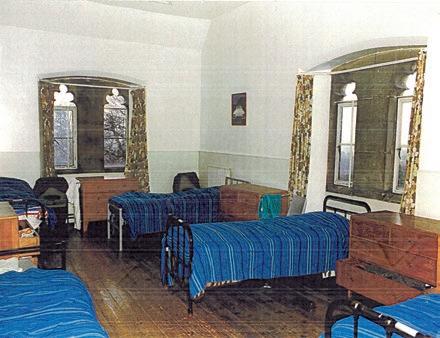
This long corridor of hormonal humanity was floored in linoleum that served as an early-warning system with every squeak and squelch of the shoes of an advancing master, or matron, to impose discipline. As Jack squelched from one end to another after lights out, fags were extinguished, record players unplugged and lights dimmed until a sole crooner, rendered unaware of Jack’s approach

by his disinhibited guitar simulation to the strains of AC/DC at full throttle, would find himself in the punishment book.
The punishment book, filled in by the praes (prefects to the uninitiated) should be published as a social history – it contains some classics, such as: “Staveley: one Unit for eating in the dining room”, “Baron and Fenton; two Units each for summoning up the devil – AFTER LIGHTS OUT!”
The Unit was a fading nod to corporal punishment. Beating was largely consigned to history, but making boys take cold showers, or run around the Head three times at dawn, were still just about permitted.
However, School House was a generally kind and happy place. It found its own pastoralism through the variety of people, backgrounds and nationalities in its populace. There were some difficult characters, and genuine eccentrics, but people looked out for one another, both horizontally and vertically, creating a strong community, more like the snug of a pub than a boarding house. It was a time of heavy metal, punk rock and mod revivals – all exercising social rebellion to which we tried to align ourselves. We weren’t sure who we were fighting, or why, but fight we must. We each had record players and stereo cassette recorders were beginning to arrive – volume was everything. LP discs came with posters, or posters could be bought in town, in record shops or at the market, and so every cubie or study was decorated with pictures of hairy rockers grinding their axe, sneering punks, Debbie Harry, or that enticing tennis player scratching her bum. Hair was worn long, as were sideburns, and it was cool to be scruffy, very scruffy. Lots of us smoked and when the price of bitter went up at the Stag’s Head (where
Jerry Minchin topped the Darts league), we started to brew our own.
Amid the chaos, the real power behind Jack’s throne was wielded by Grolive (Olive Myrtle Grigson), the indefatigable Welsh matron, who was the only adult on site at night, and who strode the length of the corridor with a rolling gait that spelled real, terrifying, purpose and with her obese corgi, Angharad, in constant attendance. Grolive understood boys – and we understood Grolive – she had seen it all before, from exploding testicles to nits, but mostly shirkers. She knew that the Cras was universally unpopular and that some rugby practice was pointless for some people, but she also understood her duty was to deliver lambs to their slaughter and so flushed out the real illnesses from the imagined afflictions by prescribing two Victory V lozenges to anyone who needed to be signed off-games. If you took the lozenges then you really were ill and would be sent to the Sanatorium under your own steam, a mile up the Shipbourne Road, for immediate treatment – the rest of us trudged off to our fate. ■

Sheila Hoole’s death on 16 February 2022 at the age of 108 brings closure to a remarkable life and Tonbridge story.
Written by David Walsh (CR 1972-2009) from the memories of Peter (WH 58-63) and Richard Hoole (WH 65-70)
Sheila first came to Tonbridge in 1944 to act as a housekeeper for Gilbert Hoole. Gilbert, who won a Military Cross on the Western Front in 1918 while serving with the Royal Garrison Artillery, had taught at Tonbridge since 1922. In 1939 he was appointed Housemaster of Park House, only for the house to close in April 1940 as pupil numbers dropped and Tonbridge became threatened by German invasion and bombing. In early 1944 he was asked to re-open the house that September and realised, as a lifelong bachelor, that he needed someone to help him, so he advertised for a housekeeper.
Sheila had been married in 1936 to a tea planter in Ceylon, Stewart Hincks, but she came back to England in 1941 with her very young son, Henry, as war with Japan loomed. Stewart joined the Ceylon Rifles but sadly died of cerebral malaria in 1943. Sheila lived in digs in Tonbridge while driving Italian POWs to work in the fields. For a widow with a small child, the Park House housekeeper vacancy was an opportunity not to be missed, especially as it came with accommodation. She was also ideally suited to it, with a background in nursing and training at ‘Miss Randall’s School of Domestic Economy’.
As Gilbert watched the skilled, practical and sensitive way in which Sheila helped prepare Park House for the new intake, he realised that he had found himself a considerable treasure. He proposed marriage, was accepted and they married in May 1944, going on to have two sons, Peter and Richard, who became Tonbridgians themselves. Gilbert and Sheila ran Park House successfully for fifteen years. Housemasters’ wives of today would find it hard to recognise the role which those of Sheila’s generation took on, with total responsibility for all the domestic arrangements of catering, cleaning, gardening and hiring of all the staff. Sheila’s training, and obvious enjoyment of what she was doing, meant that she excelled in this, ensuring that Park House boys were well fed and within budget. Many of those who passed through Park House in this period kept in touch with Sheila until her death.
Gilbert retired from Park House and teaching in 1959. He remained on the staff as Librarian until 1969 and was therefore in post when the new Smythe Library opened in 1962. He and Sheila moved first to Yardley Close and then The Ridgeway, devoting time to many local organisations, including the Civic Society and NADFAS, and playing bridge. Gilbert died in 1995 aged 98, when Sheila moved to a flat in Chiltern Way. She continued to keep very busy with gardening and flower-arranging among other things and remained projectionist for NADFAS lectures until she was well into her eighties. The last chapter of her life was spent in Hawkhurst where she lived with her son Peter and his wife Jane, until she moved into a home when she was 105.
Sheila remained in close touch with the School and the younger members of its community all through her retirement years. Jonathan and Gillie Smith lived next door to her in The Ridgeway and remembered her as the best of neighbours – kind, practical, direct and always reliable. She knew how to get things done and Jonathan even remembers being inveigled into cleaning out her gutters. Those young men who came to teach in the 1950s like Mike Bushby and David Kemp were taken under her wing and they remained devoted to her. A lunch was held in the Park House dining room for her 100th birthday and she enjoyed remembering by name all those OTs who helped celebrate the occasion. When she was 102, she even managed to attend the reopening of the Smythe Library by Princess Alexandra, having attended the original ceremony.
Sheila was a fine and enduring embodiment of her remarkable generation, devoted to Gilbert and loved and revered by her ever-growing family of children, grandchildren and great-grandchildren.
For Tonbridge School, and generations of Tonbridgians, staff and boys, it was the greatest good fortune that she answered that advertisement in 1944 and went on to 78 years of duty, loyalty, friendship and fun. Sheila will be much missed. ■
Sheila’s training, and obvious enjoyment of what she was doing, meant that she excelled in this, ensuring that Park House boys were well fed and within budget
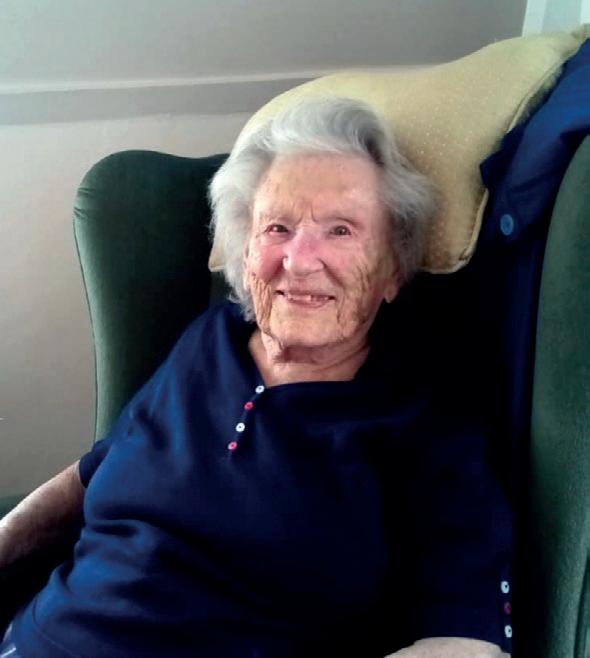

Is it strange being back?” is the standard question I have had to negotiate whether with boys, parents or colleagues. The truth is that I had the good sense to wait a long time before being brave enough to step foot on Tonbridge pastures again, safe in the knowledge that the Housemasters and their fiefdoms of yesteryear were no longer present.
I was still surprised though, but delighted, to find a generous sprinkling of Common Room who had taught, coached or even been my Senior Student Housemaster previously, Dave Makey (rackets and basketball) David Williams (Beech Lawn) Adrian Schweitzer (hockey) and undoubtedly my area of least successful performance Nick Lord (Beech Lawn and Maths), were all significant features of my time at Tonbridge though I hasten to add that the poor maths performance was entirely my fault. The simple answer though is “no, not at all.” It is not only the names and faces but the School as an institution that is unrecognisable from the Tonbridge of my experience in 1982-1987. Richard Evans reflected in his piece last year on the impact of the pandemic on our teaching and experience of Tonbridge life. This has been another feature of why a return to Tonbridge has been different to any pre-conceptions I may have had. The fact that the pandemic has coincided with my return to Tonbridge (more correlation than causation I feel) has certainly made the experience of teaching and housemastering more
unusual than at any other time in my career, but that cannot be attributed to a return to Tonbridge alone.
The most significant reason for the ease of the transition is the simple fact that the School is so different from the Tonbridge of my schoolboy experience. More importantly I would struggle to think of any way in which it is not better too. At face value there are some simple demographic changes: 10 houses are now 12. The split between houses is now seven boarding and five day houses which seems to suggest a significant shift – even to my limited mathematical prowess. Boarders are as likely to spend the weekend at home as at School, though as I write 14 of the 16 boys in the School House Upper Sixth are spending the weekend at School as they prepare for the final week of their A level exams. Those boarders come from Kent, Sussex, Surrey as before but also London increasingly and further afield from Bucks and Berkshire too. This means that boys have the opportunity to relax at home overnight at the weekend, usually after a fixture that their parents have attended. Parents are as likely to be in School during the week now for concerts, plays, Parents’ Arts Society events though one pandemic induced innovation of online parents’ evenings has proved very popular and may not ever revert to in-person meetings. One can only hope that travel restrictions will ease or be removed so that our overseas parents are able to visit more easily and feel an even stronger affinity to the Tonbridge community.
Academically the School flourishes in extraordinary fashion. The simple truth is that boys in Tonbridge are on the whole much brighter and work much harder than their OT fathers – or maybe that is just me? OTs spluttering over their coffee in indignation will no doubt point to the academic prowess of individuals in their year – Kieran Winn and Tim Greenwood in my cohort being two striking examples of academic brilliance – but, whilst these academic giants were few and far between then, we are now constantly regaled with tales and reports of Maths Olympiad and iGCSE triumphs placing Tonbridgians amongst the finest brains in the country and on occasions in the world. The range of questions asked and the interest displayed in seminar lectures, science projects and Athena presentations that the boys attend and complete is remarkable.
There might be some concern that this has happened at the expense of the breadth of the co-curriculum. The reality is that there are undoubtedly tensions between the two for boys, parents and staff but these are not new. The suggestion that sport, music, drama, CCF or any other nonacademic offering is suffering at Tonbridge are readily and easily put to bed by a glimpse at the calendar, an observation of Field Day or the enjoyment of the outstanding and convincing victories against Harrow witnessed yesterday on the cricket field. The absolute confirmation of this for me came in last term’s Orchestral concert and performance

of Beethoven’s 3rd Symphony, the Eroica, in Chapel which was simply outstanding, marred for me only by the fact it was almost certainly where I contracted Covid, having foolishly thrown caution to the wind when attending without a mask. The pre-release blurb from the Director of Music promised playing and musicianship that was really quite something and how correct he was. This was in the week before boys went off to perform impressively at the Rosslyn Park Sevens and Queen’s rackets in the Easter holidays, take their ABRSM music exams, attend house theatre trips and travel to the South Downs for their Silver and Gold Duke of Edinburgh expeditions. Oh, and did I mention the English Schools Cross Country, Public School Fencing, Fives, Football, Hockey, Basketball, Bath Cup
Swimming at the Olympic pool in Stratford, the astonishing CCF Inspection Day parade, Feva Sailing training for the World Team event, the Sixth Form Bake Off Final and House General Knowledge all in the final few weeks of the Lent Term? It is an astonishing place. The glossy magazines and prospectuses hint at the scale of the ‘production’ but the reality is that we are still a relatively unknown gem hidden in the Weald. It used to be ‘where do you go to school’ but now ‘where do you teach’ that prompts exactly the same response which used to frustrate me 20 something years ago. “Tonbridge” I say already anticipating the response – “ah is that Tunbridge Wells?”
I suggested initially that there was very little that I could think of that was not better in Tonbridge but one thing

appears consistently positive and that is the nature and quality of the relationships within this community. It seems to me that parents are largely willing to trust Tonbridge to do what it does so well, as my parents did, whilst variously resident and working in Zambia and the USA while I was a pupil here, only writing to my housemaster to apologise for my various failings. Boys and staff co-operate and collaborate relentlessly whether as seen in the co-curricular list or at the very fundamental level of the day-to-day grind of lessons and activities. ■
“So is it strange to be back? I can honestly say no it is not strange. It is fantastic to be back.”
 By Katharine Campbell (Biteback Publishing 2021), reviewed by David Walsh
By Katharine Campbell (Biteback Publishing 2021), reviewed by David Walsh
Marshal of the Royal Air Force Lord Douglas of Kirtleside (DB 1908) reached the highest rank his service has to offer, an eminence shared, in Tonbridge history, only with his near contemporary, Field Marshal Lord Ironside (DB 1893). A recent book, written by his daughter, Katharine Campbell and researched in part at Tonbridge, reveals the triumphs, trauma and controversy which marked his life.
Sholto Douglas was brought up by his mother, his parents having divorced when he was only five years old, and there was not much money to spare. His mother moved to Tonbridge from London and sent Sholto and his brothers to the quaintly named Mr. Darling’s Preparatory School, which occupied Clare House above Martin’s. There were insufficient funds for him to board, so he came to Tonbridge as a day boy, leaving as a school prae in 1913 with a classics’ exhibition to Lincoln College, Oxford. His time at Tonbridge saw success in
the classroom, playing for the 1st XV and prominence in the debating society, but he was aware of his family’s lack of money in comparison to most other pupils and this made him determined to prove himself.
After only a year at Oxford his university life was shattered by the coming of war, which saw him first with a commission in the Royal Field Artillery and then transfer to the Royal Flying Corps in 1915. His successful career in this service (by 1917 he was commanding his own fighter squadron) was balanced by what his daughter believed to be the beginnings of ‘post-traumatic stress disorder’ (PTSD) or ‘combat fatigue’ as it was called at the time. He suffered the pain of losing his younger brother Archie (DB 1910) who was shot down and killed in October 1916 as an observer with another OT as pilot, Valentine Hugill (FH 1907). ‘All my life,’ Sholto later wrote, ‘I have been conscious of the way in which I have missed the warmth of the relationship which Archie and I had enjoyed.’
The inter-war years, and then the coming of war, saw Douglas rise rapidly up the ranks of the RAF. By 1939 he was Assistant Chief of the Air Staff, became C-in-C Fighter Command in October 1940, C-in-C Middle East from 1942-44 and ended the war commanding Coastal Command. At the end of the war, he became Military Governor of the British Zone of occupied Germany, responsible for signing the death warrants of Nazis condemned at Nuremburg. Leaving the RAF in 1947 with the highest rank, he was ennobled and sat as a Labour peer, becoming also Chairman of British European Airways from 1949-64 during a period of unprecedented expansion of air travel. His last years were troubled by increasing dementia until his death in 1969.

Behold the Dark Gray Man is a fascinating and admirable book. Part biography and part psychological insight, it cannot have been easy for a daughter to write about her father. Katharine Campbell was only eleven years old when Douglas died. Her most vivid memories are of the downward health spiral and dementia of his final years, which she, as a neuro-scientist, put down to the undiagnosed consequences of his PTSD. Almost all the senior commanders in all the services in the Second World War had been junior officers in the First and the

kind of traumas suffered by Douglas were common to them all. It is hard to escape the conclusion that they were a damaged generation, with consequences for the critical decisions they all had to make in the Second World War. Campbell does not shrink from making clear that Sholto Douglas was a controversial figure as well as a distinguished servant of his country. Douglas wrote himself about his time as a young and decorated pilot in the First World War that ‘we had scarcely begun to know what living meant, but we knew all about dying, and for many the experience was so disturbing that it was to leave upon some minds the deepest of scars. We were young in years but, in other respects we were indeed old before our time’.

Douglas does not feature in the Tonbridge histories written by David Somervell and Barry Orchard, and he seems to have had little or no contact with his old School after he left.
Ironside on the other hand was often here inspecting the OTC, presiding over the OT Society and much involved at Skinners’ Hall. It may be that Douglas’s leftish political leanings caused him to remain detached, but his achievements deserved to be equally as recognised and fêted by Tonbridge as those of Ironside and that is an omission to be regretted. ■
Jonathan Smith’s (CR 1967-2002) 80th birthday was celebrated at Tonbridge in April 2022 with a lunch party attended by former pupils and colleagues, along with family and friends. Two of those former colleagues give appreciations below – John James (CR 1989-1993) of Jonathan himself, and Joe Davies (CR 1980-1994) of the lunch event.

It’s not hard to understand why so many friends have gathered to honour and celebrate Jonathan’s 80th birthday. He means so much to all of us. He has reached out to so many people through his life as a teacher, a writer and, above all, a uniquely kind and generous human being. I think one of the most important things Jonathan taught me is not to create hard borders between myself as teacher and the life that I live beyond that. The man who taught in the room at the top of the stairs in Ravenswood – I’m sure we all remember walking through the guard of honour of writers’ portraits – is the same man who walks on the cliffs in Pembrokeshire, or chats over a pint in a Devon pub, or sits quietly in an orchard or garden mulling over ideas for a new book or play. All that he is – and that is so much –goes into everything that he does. Jonathan shows us that the life of a teacher has to do with personality, intellect, experience and love as well as, probably more than, so-called professional skills. But don’t underestimate his human skill and what it has meant to those who have worked with him as pupils, friends and colleagues when they receive a little written note about a play or writing project; or when he shares a small observation on a walk around Penshurst, or a hilarious comment about a pupil or colleague’s idiosyncracies, and occasionally idiocies.
In The Learning Game Jonathan warns about the dangers facing a teacher who relies too much on that elusive quality called charisma, but he also shows how teaching is an art where personality matters, but selfdiscipline and self-deprecation is also part of the armoury.
I would love to have been taught by Jonathan because he would have listened and would have tempered generosity with incisive judgement. I don’t think you can get away with bullshit in his presence.
During the lockdowns he and Gillie joined our online poetry study group in Deal and it was such a joy to see Jonathan listening so acutely and hear him making such telling, funny and understated observations on the poems. I’ll finish by referring to one of Jonathan’s favourite poems, The Tuft of Flowers by Robert Frost because it seems to say so much about him. A man is working in a meadow, turning the grass cut by an earlier mower: ‘But he had gone his way, the grass all mown, / And I must be, as he had been – alone’. Jonathan loves solitude and recognises, like Frost, that humans are at one level alone, “Whether they work together or apart”. But the poet finds ‘A leaping tongue of bloom the scythe had spared’, left by the earlier mower, which a butterfly has also discovered. This brings him close in sympathy to his fellow worker so that the other man comes alive for him and he feels ‘a spirit kindred to my own’. The poem ends with this tentatively affirmative couplet:
“Men work together,” I told him from the heart, “Whether they work together or apart.”
I’m sure all Jonathan’s friends, men and women, who have moved on from Tonbridge, and other places in Jonathan’s life, will recognise that feeling that he has in a sense always worked together with them. John James (CR 1989-1993)


I couldn’t find any evidence of it on Google. A school holding an 80th birthday party for one of its best ever teachers? This is what James Priory decided to do for Jonathan Smith. James very sensibly delayed the celebration for four months after Jonathan’s actual birthday on 1 January. Well over 60 of us gathered in the Lowry Room – family, friends, ex-colleagues and most importantly many Old Tonbridgians who had been taught by Jonathan. What a stellar cast! Before I get to them, let me mention sartorial appearance. JBS was always one of the most elegantly dressed of teachers, linen suit rather than scruffy elbow-patched jacket. We all tried this time to measure up to Jonathan’s exacting standards but most failed. Not only was he typically suave but easily outdid us all with a snappy silk scarf carefully wrapped loosely round his neck – to keep him warm or to keep us in our places?
Back to the stellar cast of attendees. In April 1962, JFK hosted a dinner in the White House to ‘honour’ the USA’s living Nobel Prize winners. He welcomed them thus: ‘I think this is the most extraordinary collection of talent that has ever been gathered together at the White House with the possible exception of when Thomas Jefferson dined alone’. Well, the School House gathering wasn’t quite that, but it was a real privilege for the humble teachers among us to dine with such a wonderfully talented group of Tonbridgians. Vikram Jayanti (double Oscar-winning filmmaker), Peter Fincham (erstwhile Director of ITV and Controller of BBC1), Sir Anthony Seldon (educationalist and public intellectual), numerous England cricketers including Richard Ellison (Ashes winning bowler from 1985), Ed Smith (Jonathan’s son and former selector of the
English Test team) and Chris Cowdrey (Captain of England in 1988), All these have been absolutely inspired by Jonathan’s teaching. So too, Christopher Reid (poet) and Tony Little (former Head of Eton and a Tonbridge teaching colleague). If it hadn’t been for travel difficulties, we could also have had Vikram Seth (author of A Suitable Boy), Tim Rice-Oxley (rock star and member of Keane), and Dan Stevens (actor). Can any teacher ever have left such an impression on such a range of talents? Vikram Jayanti said Jonathan left a permanent impact on his work with his mantra “Less is More”. Anthony Seldon was still smarting from Jonathan grading Anthony’s first A level English essay as a D. No doubt this pushed Anthony to aim for the stars. Peter Fincham recalled Jonathan’s lesson on Philip Larkin’s recently published poem The Old Fools. As a boy of 16 at the time, Peter thought Jonathan’s exposition was an interesting account of old age. Now, having lived with the poem for over 50 years, Peter saw it as frighteningly true: ‘It’s more grown up when your mouth hangs open and drools...and you can’t remember who called this morning’. After so much adulation JBS, wonderfully selfdeprecating, told us about the last five minutes of the very last lesson of his teaching career (1966-2002). It ended with them asking him to stop as one of them had something to say: ‘Sir, we just want to say how much we’ve enjoyed this year with you and how much we’ve learned from you, Mr Evans’. Thud! Jonathan deserves every compliment in the book. He was truly a brilliant inspirer – for me – to up my intellectual and academic game as a teacher. What a day this was! What a teacher! I’d take JBS rather than Thomas Jefferson, any day. Joe Davies (CR 1980-1994 ) ■

Rory Forsyth (MH 98-03) writes about a project which he helped to set up with Sir Anthony Seldon (HS 67-72), and with Amanda Carpenter, wife of Peter (CR 1992-2021). Rory is the CEO of the Western Front Way.
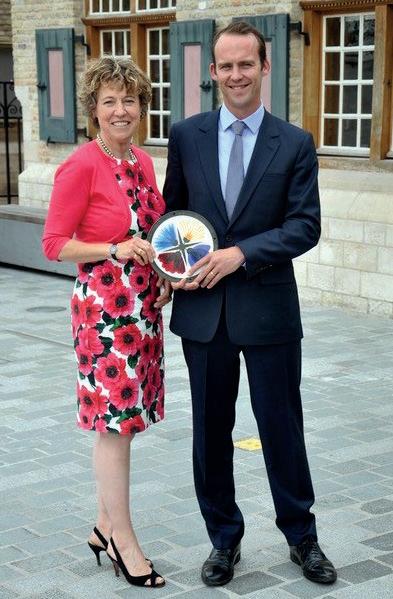
When I wrote to Anthony Seldon in 2016 about ‘The Western Front Way’, a grand vision of a path for peace along the length of the First World War front line, little did we know it would become the largest commemorative project in the world.

While researching their book Public Schools and the Great War in 2013, Anthony and David Walsh discovered a letter written from the trenches in 1915 by Douglas Gillespie to his headmaster at Winchester. This letter created a vision of what might be done after the war ended, a ‘Via Sacra’ following the line of the Western Front along which ‘I would send every man, woman and child on pilgrimage so that they might think and learn what war means from the silent witnesses on either side’. Gillespie was killed shortly after writing it, and for nearly
a century the vision lay dormant. A radical idea at the time, some thought it impossible even in 2016.
What Anthony and I saw, helped by Amanda Carpenter as Development Director and Trustee, was a means to make a change so great it would affect not just the way those who use the walking and cycling paths remember the fallen, but the entire face of commemoration. With no surviving veterans and the centenary of the Great War done, how could we modernise commemoration, ensure its lessons are still heeded, and make it internationally appealing? We had to appeal far more broadly than just the First World War, so this path is for all nations, all ages, but also all conflicts and, as it journeys through somewhere so deeply affecting, it can only leave users thinking what war really does cost.
Marking a cycling and walking path the equivalent length of Brighton to Inverness is no mean feat, and with Brexit, COVID and the multiple levels of diplomacy to overcome, it took us four years to take it beyond an idea to a living and breathing concept embraced by the host nations. Belgium is now marked and open, and France is marking too. We are currently building an app to accompany all users with audio, video and in app tools to guide, inform and enliven the discussions to be had about the experiences felt along the 1000km. Anthony and David also took part in the Chalke Valley History Festival in June to give further publicity to the project.
My time at Tonbridge ensured I would never shirk a challenge, and as CEO I now hold the strings of a vision
shared with the world. Along the journey there have been many moments of serendipity, but the greatest of all remains the Tonbridge link. One of the two men who found the letter was my housemaster, while Amanda Carpenter, who helped found the charity with me, is the wife of my old English teacher. We all were given hope when leaving Tonbridge that fate would guide us, and I remind myself daily that fate has intervened here, so it is up to us to finish this important and emotional project.
(Editor’s note: In 2021 Anthony Seldon walked the whole length of the Western Front Way and has recalled the experience in a book to be published in November 2022: ‘The Path of Peace: Walking the Western Front Way’). ■
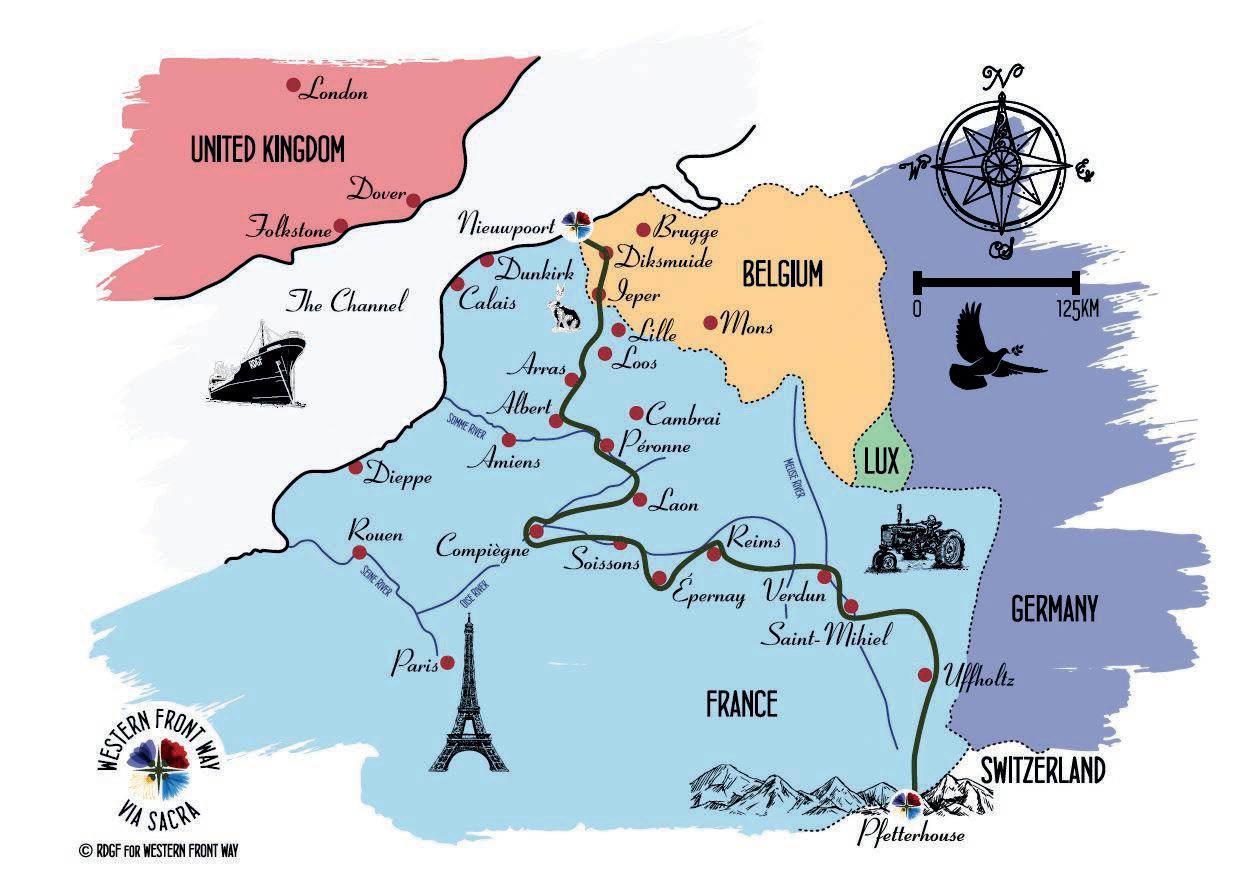
Donations can be made via our website: thewesternfrontway.com



A celebration of the life of Mike Bushby (CR 1954-1991), who died in February 2020, was held on Sunday 24 July 2022 in the Orchard Centre.

About 200 people gathered to remember Mike, including his family, OTs, colleagues and friends. A particular group comprised over 40 OTs from Ferox Hall, where Mike was Housemaster from 1966-81. The gathering enjoyed tea and reminiscing about a much-loved schoolmaster, against the background of a cricket match on the Head featuring the Yellowhammers, a club for which Mike played and of which he was a Vice President. Speeches were given by Jim Bushby (WW 84-89), Nick Nugent (FH 63-67) and David Walsh (CR 1972-2009), and others stepped forward to give their own memories including Stephen Nelson (FH 76-80), Jonathan Arscott (PH 83-88), Paul Box-Grainger (MH 67-72), David Tennant (CR 1983-2018) and Mike Duncan (CR 1968-2000).

A full obituary of Mike was published in the 2020 edition of OT Magazine and can be found on Tonbridge Connect: https://www.tonbridgeconnect.org/news/deathsobituaries/309/309-BUSHBY-Michael



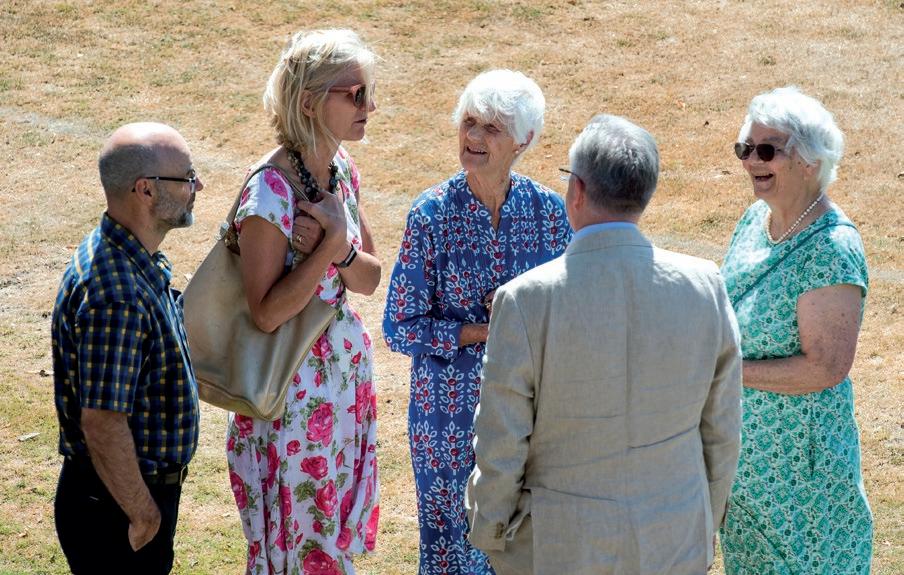


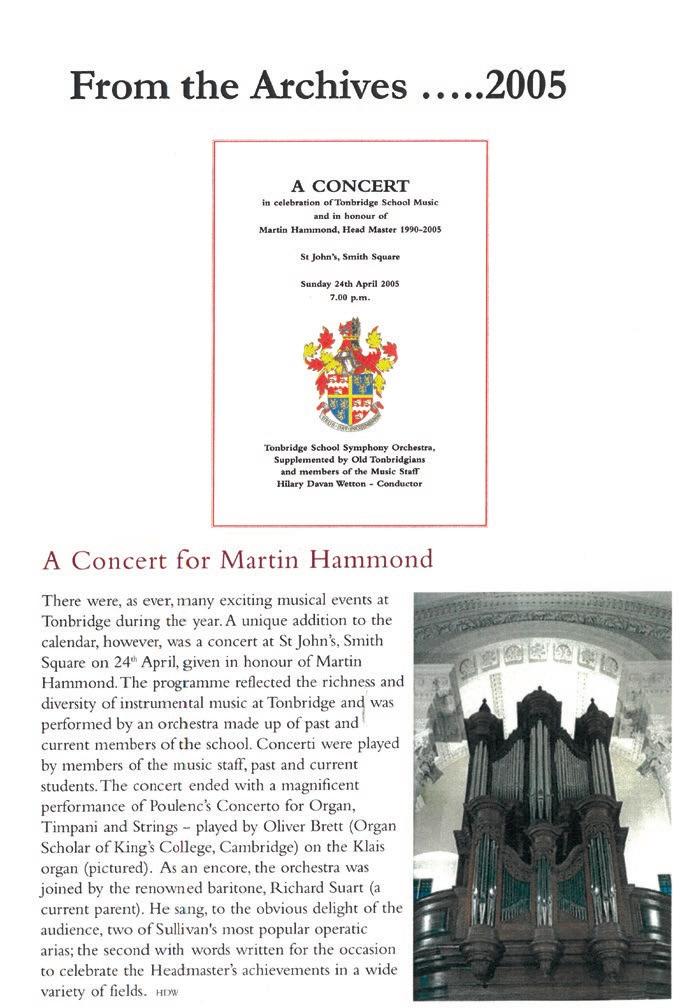
Tonbridge’s Archives and Heritage comprise nearly 475 years of the School’s history in the form of artefacts, books, written documents, letters, newspaper cuttings, film and oral recordings photographs and much else. These are maintained by Bev Matthews, as the School Archivist, helped by David Walsh as a voluntary archivist.
There are many reasons why the School’s history should be treasured, one of which is certainly to provide memories of their time at School to Old Tonbridgians at events, and online. The digital archive can be accessed for this purpose via Tonbridge Connect, where can be found, for instance, every back number of The Tonbridgian, photographs of many aspects of School life, and ’50 Objects’ highlighting Tonbridge’s history. This digital archive is regularly being added to as we scan in more material.
In this edition of the printed magazine we give you the following snapshot memories of Tonbridge’s cultural, sporting and pastoral past:

The ‘Novi Bumph Test’ was given to all novi in their first few weeks at Tonbridge. It consisted of about forty questions of school detail which had to be learned and correctly answered to house praes. Used sensibly, it helped novi acquaint themselves with Tonbridge customs, names and people, but it certainly could be misused in the wrong hands and was eventually discontinued. This is a written example from the mid-1980s:
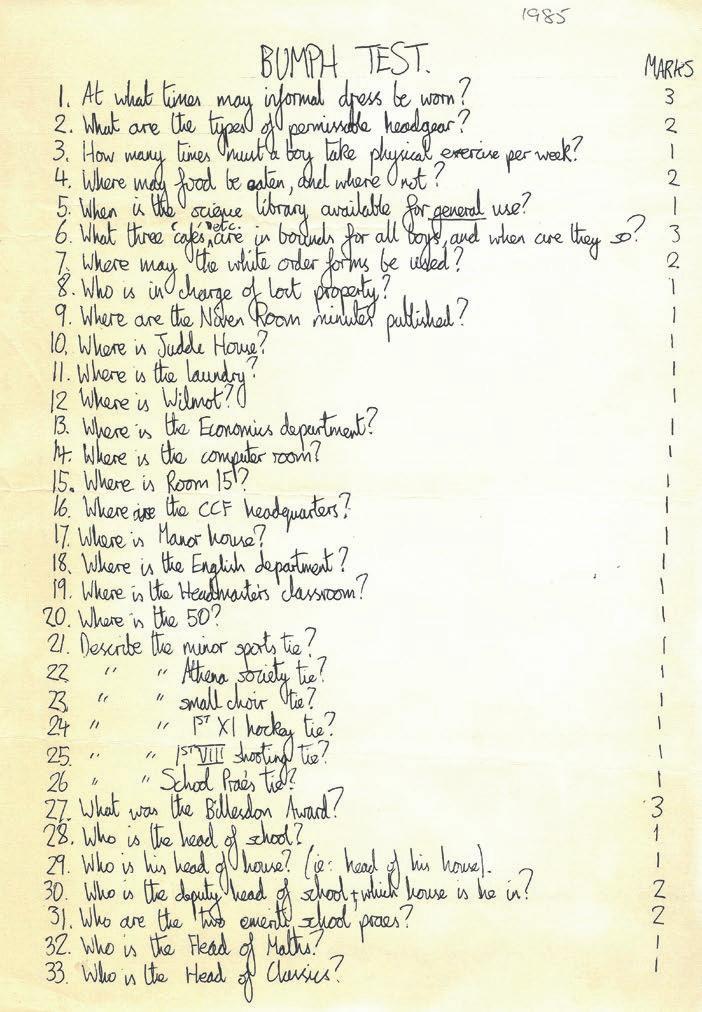
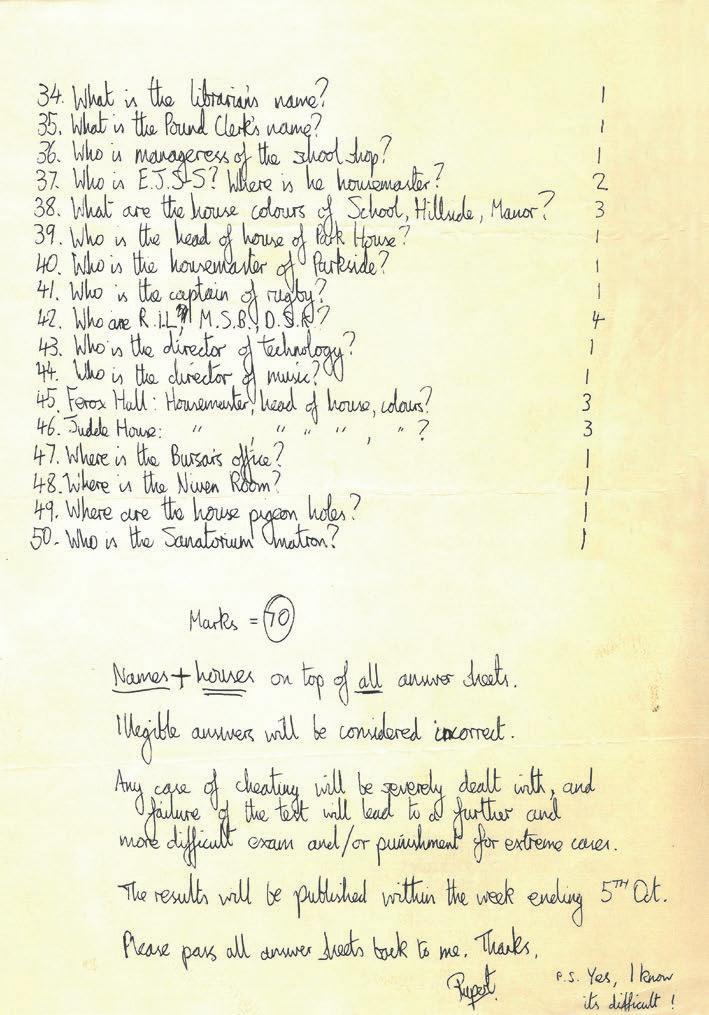
We are always looking to improve the collection, so please consider donating any memorabilia from your time here at Tonbridge, whether academic, extra-curricular or sporting – and especially photographs (named if possible!). If you are not ready to let items out of your hands, they can be scanned and safely returned to you.
Please contact Bev Matthews who will happily help you with any request: beverley.matthews@tonbridge-school.org
Paul Fincham (Sc 72-76) tells us about a late change of career from the City to composing music.
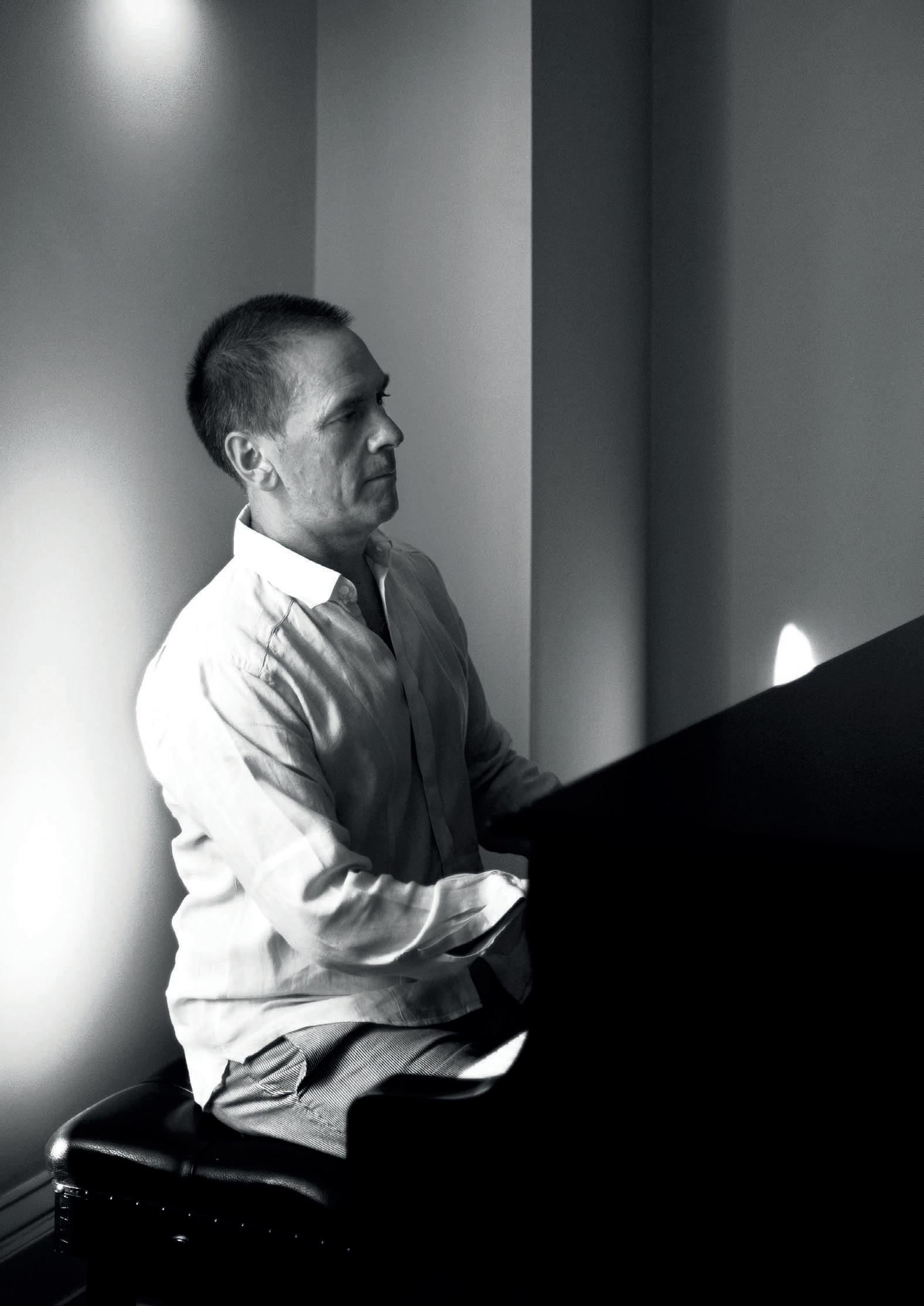
All our destinies are shaped at least in part by the random opening – or closing – of sliding doors. The door onto my second career, as a composer, was opened when I found myself sitting next to Jonathan Smith at my godson’s 21st birthday dinner in 2012.
Funding for the feature film of his novel Summer in February had just been confirmed. We talked about that and I dare say we talked about music too. I mentioned in passing that I had some regrets (though by no means unqualified) that I had not pursued a career in music. Jonathan would no doubt have remembered that I had composed a rock opera whilst at School House, Daniel, based on the biblical story of that name, premièred at the School House concert and repeated at the request of Christopher Everett, Headmaster, in lieu of a Sunday morning chapel service, a popular decision! I also said to Jonathan – in passing – that I had always felt I had it in me to compose a film score. And that I loved his novel.
Jonathan ran with this and, working closely with him and latterly with the film’s director, I worked up a film score which I thought, especially considering it was my first attempt, wasn’t too bad. Others thought so too, but in post-production risk aversion held sway and the score was ultimately handed to an established composer who, unlike me, had composed a few film scores before. This, though disappointing, was not entirely surprising. But I had caught the bug and maybe I felt as well that I had something to prove. This feeling was in no way diminished when at a School House reunion I was chatting to a contemporary who had sung in Daniel. He asked me what I was doing –well, you know, nothing very interesting to be honest, solicitor, working
in the City, not a bad life but not wholly fulfilling blah blah. He promptly announced (magnanimously I think): “We were all convinced you were destined to be the next Andrew Lloyd Webber”.
One thing led to another. I set up a home studio and put together –for promotional purposes, but to be honest, more just for the hell of it –a CD of short compositions, featuring a dozen or so superb session musicians. I got an agent. I dabbled in other film/TV work and notched up an award-winning score for a successful low budget film (more recording sessions in my home studio). I wrote a Christmas carol called Ring the Bells, commissioned by the London Philharmonic Choir and premièred by it in the Royal Albert Hall in 2017. I was then commissioned by Garsington Opera to compose a youth opera with librettist Jessica Duchen, The Happy Princess, premièred at Wormsley Park in 2019 and is destined to be performed next summer in what is believed to be the world’s longest established music festival.
So I feel I have had some modest success but there is certainly more to do and some interesting potential opportunities in the pipeline. My composing stalled a little during COVID times as I finally committed to taking a piano diploma. This required me first to pass Grade VIII piano and I suspect I am the only person in the country who took over 40 years to progress to grade VIII from grade VII which I had taken whilst in the lower sixth.
Let’s go back to that subject of regrets. Was I wrong to abandon music, at least as a career, after Cambridge? I am only 63, of course it’s far too soon to say. ■

Nick Lord (CR 1983-) has taught maths at Tonbridge to generations of boys for nearly 40 years. Here he shares some of his memories of triumphs, red herrings and even cricket coaching on Bantams 3.
It has been lovely to receive email messages from OTs and former colleagues after I was profiled (complete with an action photo!) in the 2021 Impact Report from Tonbridge. In the following, I shall reflect further on mathematics at Tonbridge, how it has changed over the years, and why it is currently enjoying something of a purple patch.
Mathematics continues to occupy its familiar classrooms in the Memorial corridors, but it has now also taken over three classrooms in the basement (which, at various times in the past, were occupied by Welldon, Economics and a Sixth Form bar). Following the redevelopment of the Science Department the Mathematics classrooms have been given a matching makeover with extensive redecoration, large smartboards, and whiteboards on every wall which makes for a much more flexible work environment.
The structure of mathematics courses has yo-yoed over the years: GCSE has oscillated in difficulty (and is currently in quite a hard phase!) while at A level, the modular courses of the 1990s and 2000s have been replaced by linear courses more reminiscent of those of the 1980s and
earlier. In the end, the greater holistic possibilities of a linear course were felt to trump the greater flexibility of modular courses. But modular courses were kind to mathematics: numbers doing Maths and Further Maths soared, and numbers continue to be high in the new linear dispensation. STEP remains as an entrance exam for Maths at Cambridge, but there has been a recent burgeoning of university entry tests for maths-related courses as well. There has been a steady increase in the number of Tonbridgians studying Maths/Computer Science at university – hopefully encouraged by the recent study showing that careers in these areas are among the least likely to be taken over by robots and AI.
The most exciting development recently has been the growth in enthusiasm among boys for the various mathematics contests – some UK based and some international. If you visit the maths classrooms after lessons, you will find huddles of boys of all ages excitedly discussing hard maths problems. Three current Tonbridgians were at the 2021 International Mathematical Olympiad. These unprecedented achievements make this an unforgettable time to
be involved with mathematics at Tonbridge: we really are teaching some of the very best students in the world!
What else do I do? I remain a tutor in Ferox Hall although I am rapidly approaching the age of the cedar tree in the garden. In the Michaelmas and Lent Terms, I assist with the interviewing of boys applying to Tonbridge, often seeing sons of boys I have taught. In the Summer Term, I continue to help with Bantams 3 cricket, presumably on the basis that the most experienced (oldest) coach should be paired with the least experienced team, although I am mindful that correlation does not imply causation. Indeed, my track record of three wins with the U14F team in 40 years may leave something to be desired. The first was an epic win against Eton, won by a scrambled single off the very last ball with a close run-out call and a team so unused to winning that, at the end, they said, “What do we do now?”.
Have I changed? Apart from the obvious ravages of time, I think I have mellowed and am now more sympathetic to those who find maths tough. There are no magic bullets: on
a bad day, teaching maths can seem like feeding worming tablets to a reluctant cat, but these are more than compensated by the good days when boys surprise you with their insights. And then there are those halcyon lessons where I sense that I have got my words in the right order, where time has stopped, and you know the class has fully grasped the beauty of a formula such as the unforgettable connection between e, pi, 1 and 0. But my classroom memories are not wholly mathematical. Having ascertained in a late afternoon November lesson that a second year boy was about to sing Sound of Silence in a concert, while the rest of the class claimed never to have heard of Simon and Garfunkel, circle theorems were put on hold while we had a magical impromptu rendition of Hello darkness, my old friend with the lights off as dusk descended outside.
Before coming to Tonbridge, I had envisaged that I might have taught at university level, but I am sure that I have had just as much fun teaching at Tonbridge and just as much intellectual stimulation from sharing ideas with colleagues and boys. I have tried hard


active: so much of maths is about how you react to being stuck and this is just as important for teachers as boys.
I referred at the outset to the pleasure of receiving news and reminiscences from OTs, many of whom were kind enough to say how much they had enjoyed and appreciated the mathematics they were taught at Tonbridge. As I approach my final terms at Tonbridge, I cannot wish for a finer encomium. ■
to keep my own maths
The most exciting development recently has been the growth in enthusiasm among boys for the various mathematics contestsNick Lord with Mike Clugston Nick Lord umpiring
THE
RE-DEDICATEDDavid Walsh’s fascinating account of what he described as the ‘spectacularly joyous and unforgettable re-dedication of the chapel of St Augustine’ following the ruinous fire so captured my imagination as to prompt me to ask him if a video recording existed. I had previously feared that the service might have flopped somewhat having read in the national press that there had been a problem getting the incense to light. I clearly need have had no concern. Alas there was no video, David replied. Today of course there would have been a livestream and recording.
25 years or so on, it is perhaps possible to offer some reflections on the relative merits of the old and new buildings. The original chapel was an outstanding Edwardian church. I wonder if it was the biggest. Not many churches were built in the first decade of the 20th century after the Victorian glut. No doubt like all OTs I was shocked and saddened to learn of the fire in 1988. The following year I first viewed the melancholy charred remains from the vantage point of an OT cricket match on the Head.
I prefer the new church notwithstanding my attachment to and generally positive memories of its predecessor. Much could be said but I will pick out three features.
First and readily apparent, the replacement of most of the stained glass by clear panels has transformed the whole feel of the interior at least in daylight hours. It is notably light and airy and somehow seems bigger. The old glass and the portraits of Kentish saints served as quite a good distraction from the odd tedious homily, but I am not sorry to see them go.
Secondly there is the new Lady Chapel immediately to the left of the chancel which doubles happily as a Blessed Sacrament chapel. This replaces a rather poky chapel little more than an annex under the organ loft at right angles to the main altar. Generations of Tonbridgians might have hurried in and out of chapel without ever really noticing the small altar with its reredos
comprising a framed copy of one of those familiar renaissance Annunciation scenes. I used to serve in that small space the 7.15 Tuesday mass celebrated by one of the chaplains, Martin Francis and Edward Turner. On one occasion neither turned up and I was surprised and impressed to receive an apology with the candid explanation that he had overslept. So far as I recall the only regular member of the tiny congregation was George Gilbart-Smith. I was disappointed on a recent visit to the Chapel to find no mention of weekly celebrations of the Eucharist.
Thirdly, the high altar. Reflecting the new norm which became established quickly after the Vatican Council in the early 1960s the altar has been detached from the East end to allow for Westward celebration that is the priest facing rather than turning his back on the congregation. The altar itself is relatively short and this new arrangement has made for a spacious sanctuary well fitted for any liturgical celebration. In many churches moving the altar from its original position has compromised the architectural integrity of the original design but here it works better.
But how about the inevitable losses? I will mention one perhaps almost quirky and the flip side of my third point. I am sorry to see the end of the riddel posts and hangings which enshrined the high altar. These were much in vogue when the original chapel was built, having been favoured by one school of the Oxford Movement and recently promoted by Pearcey Dearmer’s The Parson’s Handbook the first of many editions of which appeared in 1899. I don’t suppose many OTs remember them at all but I thought them an attractive and interesting feature.
By way of a small historical footnote, Michael Nazir-Ali, the Bishop of Rochester who presided at the re-dedication, and James Bell, the Chaplain, have both since become Roman Catholic priests. Anthony Fincham (SH 68-72)
We welcome letters on any matters raised in this edition or others relating to the School or OTS.
I wanted to tell you how much I appreciate getting this magazine. It is very well produced, full of information about people and activities, and obituaries which is usually the only place I come across somebody of similar age to myself. I am also writing to you because there is very little news of OTs in this part of the world probably because there aren’t many around here. There may be more, but I only know of one other in New Zealand.
When reading the OT Magazine, I am always interested in the obituaries and to catch up with what happened to anyone I knew. I was in Judde House just after the war from 1946 -1951 when the housemaster was D.C Somervell. He was followed by Alf Foster. In my last year I was Head of House and in the same form as Colin Cowdrey who was Head of School.
After Tonbridge I served in the Oxfordshire & Buckinghamshire Light Infantry and then worked in several businesses in many countries, mostly with large well known international companies such as Unilever, Nestlé and Mars, in varied marketing and general management roles.
In 1966 I decided to emigrate to Sydney to work for Nestlé, and then in 1972 for Mars before starting my own branding and research consultancy. In 1986 I moved to Auckland, partly for the trout fishing, but also to run first a pet food company, then a bread company and finally my own consultancy. At close to 90 years old, as I look back on all these years, I feel I have been lucky to have an interesting and enjoyable working life.
Jon Ibbotson (JH 46-51)
Dick Longley (CR 1969-2005), together with his wife Helen, planted a cherry tree and a Gingko tree in the School grounds in March as a 60th wedding anniversary present from their children (Jeremy, Jonny, Jacquie and Jenny).


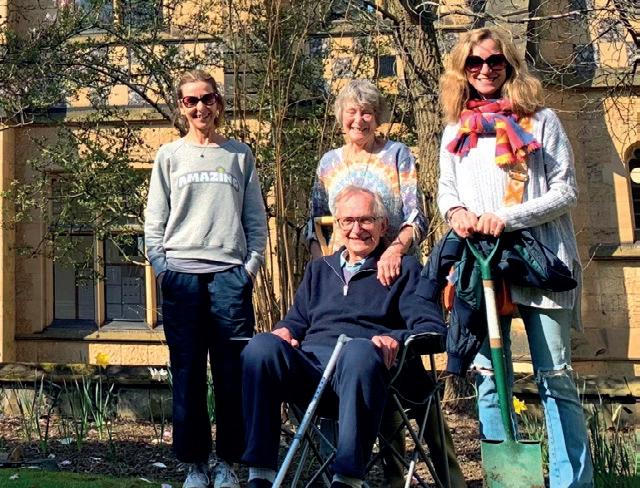
Dick was Head of Physics for many years and introduced IT and computers to the School in the late 1980s, writing, with Mark Farmer, all the programmes for the IT system.
Dick joked about how the Common Room concluded that ‘all this new-fangled nonsense would never take off’. Helen taught in local schools and helped with many drama productions at Tonbridge, as well as bringing up four children, with Jeremy and Jonny coming to Tonbridge in the 1980s.
Helen thanked James Priory and the School: ‘It was the perfect gift for us: Dick enjoyed many years at Tonbridge, while I have a passion for caring for God’s creation and a favourite book is The Hidden Life of Trees. It was a great pleasure to meet with the gardeners Stephen and Chris, planting a cherry tree – beauty – and a Ginkgo tree –endurance! The Ginkgo tree was the only living thing to survive the bomb dropped on Hiroshima. I hope it might encourage others to contribute to tree planting, as part of The Queen’s Green Canopy initiative to mark her 70 years as Queen. 60 years doesn’t quite make the cut, but I guess we’re on our way!’
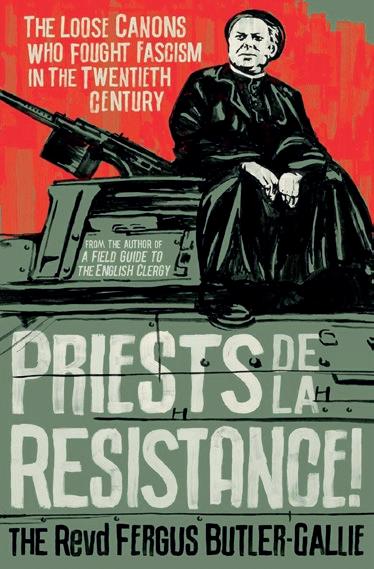
Whoever said that Christians had to be meek and mild hadn’t met Father Kir – parish priest and French resistance hero, immortalized by the Kir Royale. And they probably weren’t thinking of Archbishop Damaskinos who, when threatened with the firing squad by the Nazis, replied, “Please respect our traditions – in Greece we hang our Archbishops.”
Roger Knight (PH 58-62)
Leading naval historian Roger Knight examines how convoys ensured the protection of trade and transport of troops, allowing Britain to take the upper hand. Detailing the many hardships these ships faced, from the shortage of seaman to the vicissitudes of the weather, Knight sheds light on the innovation and seamanship skills that made convoys such an invaluable tool in Britain’s arsenal. The convoy system laid the foundation for Britain’s narrow victory over Napoleon and his allies in 1815 and, in doing so, established its naval and mercantile power at sea for a hundred years.

Chris Henley (FH 70-74)
A feel-good celebration of all that is great about teachers and teaching – and an exploration of the difference teachers make and how they do it.

Authors Gary and Chris link real-life case study stories to what educational research and cognitive science tell us, examining exactly what it is that makes such an impact on the lives of young people – and point the way for all teachers to adopt, adapt and develop these effective strategies and approaches in their own practice.
Wherever fascism has taken root, it has met with resistance. From taking a bullet for a frightened schoolgirl in Alabama to riding on the bonnet of a tank during the liberation of France, each of the hard-drinking, chainsmoking clerics featured in Priests de la Résistance were willing to give their lives for a world they believed in –even as their superiors beckoned them to safety.
In this spellbinding new collection, the Reverend Fergus Butler-Gallie presents fifteen men and women who dared to stand up to fascism, proving that some hearts will never be conquered.
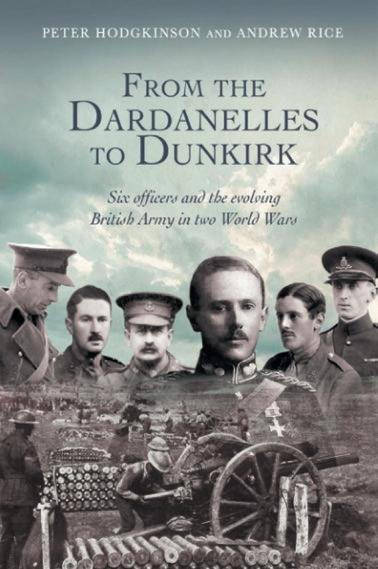
This book traces the development of the British Army Officer from 1880 to 1945 through the careers of six soldiers from the Rice family. The lives of five brothers who attended Tonbridge School are told in moving detail – Joe (JH 08-12), Neil (JH 09-13), Tommy (JH 12-16), Dick (JH 15-18) and Edward (JH 24-28).
The problems within the officer corps 1880-1914 are seen through the career of the brothers’ uncle, Lt-Col Hugh Rice, Essex Regiment, who commanded on Gallipoli.
Changes in the officer corps during the First World War are reflected in the career of Major Joe Rice whose captivating diary and letters help us to understand the evolution of the artillery.
The reversion to type and failures in the inter-war years are then assessed, followed by the changes necessary during the Second World War, viewed through the career of artillery officer Lt-Col Dick Rice. His diary of the BEF in 1940 vividly describes that disastrous campaign.
Get Off the Couch Before It’s Too Late – All the Whys and Wherefores of Exercise Hugh Bethell (FH 55-60)

This book explains exactly how exercise affects our bodies and its crucial role in preventing and treating many of the conditions that beset us as we advance in age – obesity, heart disease, stroke, diabetes, high blood pressure. At a time when the previously steady increase in life expectancy across the nation has stalled and the period of poor health and dependency at the end of life has lengthened, this book gives a strong signal for every one of us, young or old, to understand the importance of an active lifestyle.
The Covid pandemic has thrown a stark light on the vulnerability of those who take too little exercise. Most of those who have become very unwell or died have been overweight, unfit and/or suffered one or more degenerative diseases of old age – all the long-term results of being inactive. Making regular exercise a part of our daily lives, we can not only help prevent the onset of disease and frailty, but also increase longevity and allow ourselves to look forward to a healthy and enjoyable old age.
Tall conical and pyramidal buildings, topped by white cowls or louvred vents, are a distinctive sight on the farms in the villages of Kent, East Sussex, Herefordshire, Worcestershire, Surrey and Hampshire. In these buildings, hops were dried, pressed, and bagged for despatch to breweries. In Kent and Sussex, they are called ‘oasts’ or ‘oast houses’, and in other counties ‘hop kilns’. Oasts and hop kilns are testimony to a specialised and important rural industry, and for hundreds of years, they were a defining feature of the countryside. By the late 19th century, there were as many as 8,000 hop kilns and oast houses in England. This book is the first comprehensive account of the history of oasts and hop kilns in England and includes a comparison with hop drying buildings in Continental Europe and the USA. The 400-year evolution of the kilns and their machinery is pieced together from surviving buildings, books, archives and local lore. In this richly illustrated volume, the charm of oasts and hop kilns on the countryside is captured in sketches, diagrams and photos by the author and others.
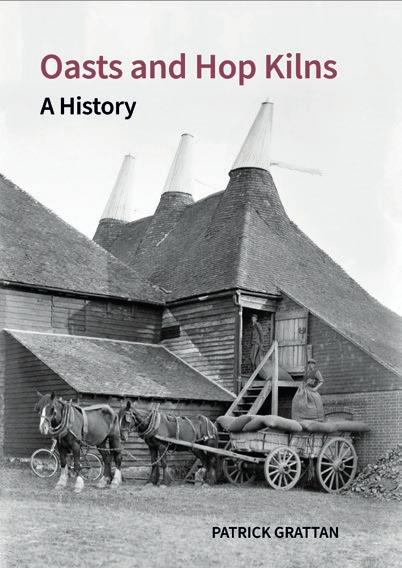
Therapy in the Age of Neuroscience: A Guide for Counsellors and Therapists Peter Afford (PH 67-71)
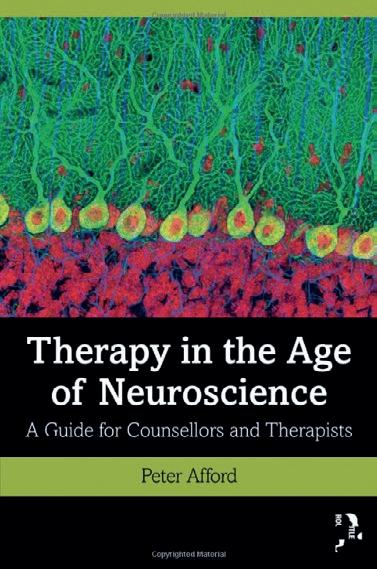
An essential guide to key areas of neuroscience that inform the theory underlying psychotherapy, and how they can be applied to practice. Laying out the science clearly and accessibly, it outlines what therapists need to know about the human nervous system in order to be able to engage with the subject.
Chapters cover the neuroscience underlying key aspects of therapy such as relationships, emotion, anxiety, trauma and dissociation, the mind-body connection, and the processes which enable therapists to engage deeper aspects of mind and psyche. This book responds to the need for counsellors and therapists to have an accessible and comprehensive guide to how contemporary neuroscience views mind and body.
Therapy in the Age of Neuroscience will appeal to psychotherapists, counsellors and other mental health professionals who wish to learn more about how to integrate neuroscience into their work.
Exponential: How Accelerating Technology Is Leaving Us Behind and What to Do About It Azeem Azhar (Sc 85-90)

As technology accelerates, the human mind struggles to keep up – and our companies, workplaces, and democracies get left behind. This is the exponential gap.
Now, a leading technologist explains how this exponential gap is rewiring business and society. Exploring corporations and the workplace, diplomacy and big tech, Exponential makes sense of a period of dizzyingly fast change – and reveals how we should respond.
Azeem Azhar is the creator of Exponential View (exponentialview.co), one of the world’s leading platforms for understanding the impact of technology on society. His weekly newsletter is read by 200,000 people from around the world, and his chart-topping podcast has featured guests including Yuval Noah Harari, Tony Blair and Reid Hoffman.
The founder of a number of tech companies, Azhar is an active start-up investor and has advised the World Economic Forum, McKinsey and Accenture. He is a contributor to publications including the Financial Times, Wired and the MIT Technology Review.
Core Techniques in Flap Reconstructive Microsurgery: A Stepwise Guide Dariush Nikkhah (WH 97-02)
This book provides a practical, step-by-step guidance on modern workhorse flaps for plastic and reconstructive surgeons in training or in their early career. The 50 chapters cover everything from surgical fundamentals to preconditions of microsurgical techniques, but also covers pre-operative planning, steps of microsurgical dissection and management of complications in a straightforward, explanatory style, and are supplemented by over 600 clinical illustrations and cadaveric images. Specific notes on common reconstructive challenges and complications, this book offers a valuable reference tool and would be unquestionably an integral reference guide for every surgeon interested in reconstructive microsurgical techniques, especially during their early microsurgical career.
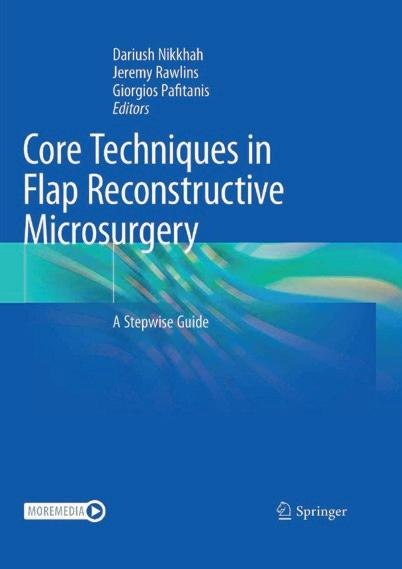
In September, we welcomed more than 100 Old Tonbridgians to the 145th Annual OT Dinner which was held at Tonbridge School for the first time in over a hundred years due to Skinners’ Hall having a major renovation.

The President of the OT Society, Sir Sherard CowperColes, was present as was the OTS Chairman, Richard Hough as well as the Headmaster, James Priory and the event was well supported by OTs of all ages.
Champagne was served in the Barton Science Centre on arrival and then OTs made their way past the Chapel to the Orchard Centre dining room for a delicious three course meal prepared by the Tonbridge School chef.

Prior to eating, OTs were invited to hold a minute’s silence for the late David Kemp, who had been hoping to attend the event, but had sadly passed away five days earlier. They were also treated to a recital by the School’s string quartet.

Speeches were delivered by Sir Sherard Cowper-Coles, James Priory and Jonas Freeman (Head Boy), before OTs moved to Skinners’ Library for coffee and port, visiting Old Big School on their way to view the Anthony Whishaw (MH 44-48) exhibition From Tonbridge To Tate. Carriages were at 11.30pm with reports of a good time had by all.
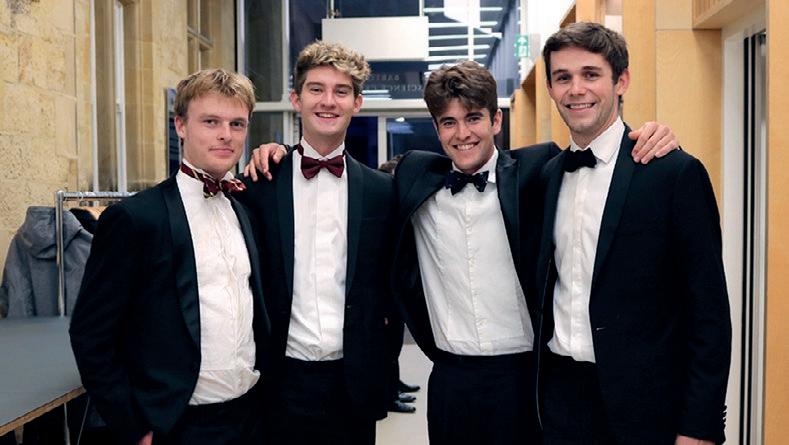
The OT Reunion took place in November 2021 for those who joined the School between 1973 and 1984, and was attended by over 100 OTs despite a late change of date in order to accommodate David Kemp’s memorial service, and the arrival of Storm Arwen which necessitated a rare red weather warning for strong winds by the Met Office.

The agenda followed the established format and for those able to arrive close to 9am started with the opportunity for a tour of the School, followed by a service in the Chapel and the chance to hear the magnificent Marcussen organ. Can it really be 26 years since the Chapel was restored? After a reception in Old Big School, we enjoyed lunch in Big School where we heard from the Headmaster, James Priory, and the OT Society President, Sir Sherard Cowper-Coles. The Headmaster spoke proudly of the latest A Level and GCSE results and how the School has maintained its elite position near the top of the latest academic tables, which was good to hear, though it was equally
reassuring to hear him also speak about the importance of the overall Tonbridge experience.
After lunch, when many were wrapping up to brave the weather to watch the First XV play Radley on the 50, several of us who had missed the 9am tour felt that the First XV could manage without our support for the first half and took ourselves off on an unofficial tour of the School. It was good to see how the facilities have improved since our time, with enlarged central classrooms where School House used to be, a new grubber and School Shop, the EM Forster Theatre, the new sports hub, the refurbished and enlarged Smythe library, and of course the impressive Barton Science Centre. The improvements in the facilities and pace of change have been both continuous and remarkable. And yet, somehow, it was equally enjoyable to find the parts of the School that hadn’t changed and to reminisce.
Braving the weather for the second half of the Radley match proved worthwhile. The 1st XV had dominated much of the game but against the run
of play found themselves behind as the game drew towards a close; deep into added time, and following a period of sustained pressure, Tonbridge took their opportunity to score the winning try which delighted the crowd and sent everyone back to their houses for tea in good spirits.
The last part of the official day, tea in our old houses, was possibly the highlight for many. A group of my contemporaries in Ferox had made contact with each other through social media prior to the reunion such that nine Old Ferocians from my year attended, several of whom had not seen each other since we left the School, which really added to the enjoyment of the day and we are now discussing a reunion in London for a wider group of 50 or 60 people.
Colin Jones (FH 74-79)




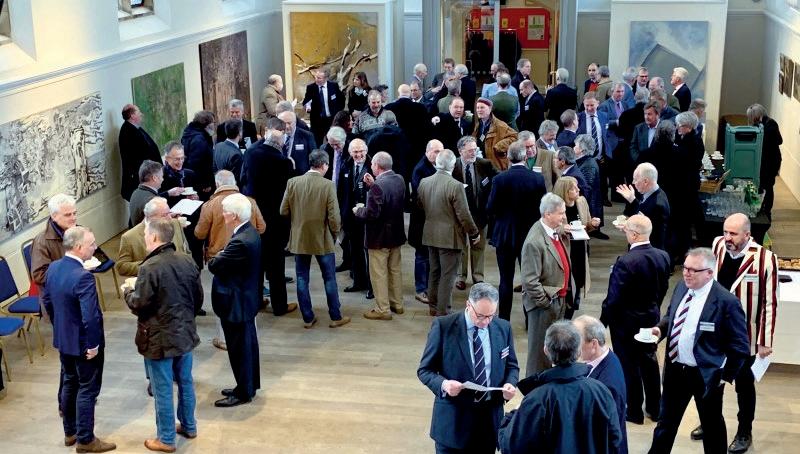
The Class of 1996 remembered their time together at Tonbridge by gathering in a pub in central London to celebrate 25 years since departing the School.



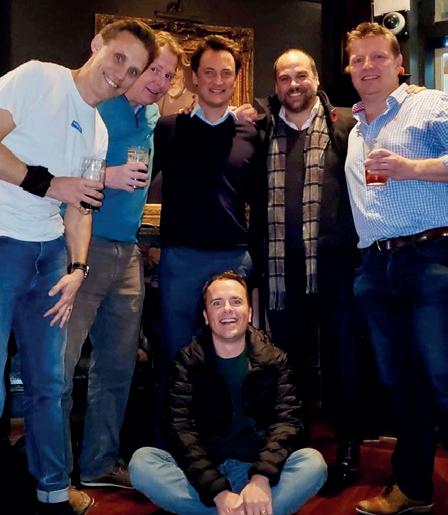

Over 30 OTs were able to attend, along with Tonbridge icon, John Gibbs, and it was a fantastic opportunity to catch up with old friends and share reminiscences, especially after the return of several people from time spent living overseas, and in one case, recovery from serious illness.
Regrets were sent by several OTs still living outside the UK, such as Piers Ashfield (HS, Washington), Jeremy Lovelace (MH, Sao Paulo), Achal Kapila (Sc, Nairobi) and Robbie Aarvold (PS, Singapore) and a glass was raised to Chris Crooks (Sc) who sadly passed away in 2018.
There is now an active WhatsApp group up and running and future reunions are planned. If you left the School in 1996 and would like to be involved, please email Duncan Elliott on duncanelliott77@ gmail.com
If you would like to publicise or need assistance getting contact details for a smaller local reunion for a year group, a small group or a club, we are here to support that event, just email: tonbridge.society@tonbridge-school.org we would be happy to assist.
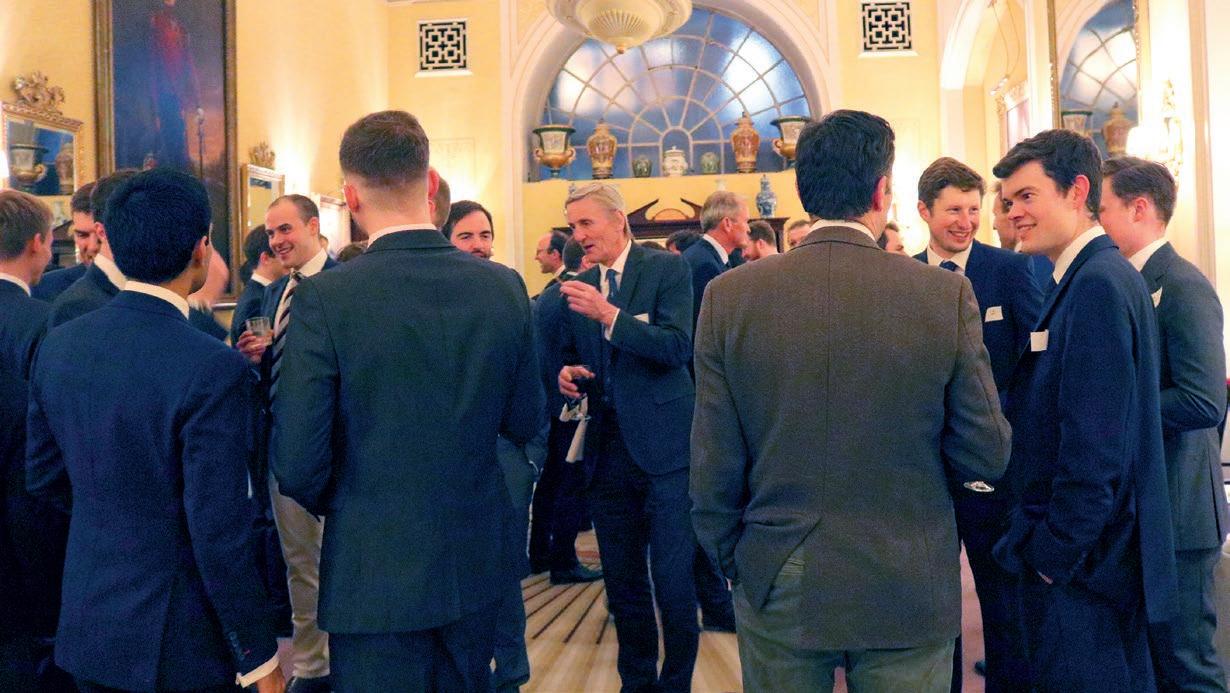


This event welcomed over 60 Old Tonbridgians to the East India Club, London for all leavers of 2010 & 2011. The OTs enjoyed drinks and nibbles and were reunited with various former housemasters and teachers. From the volume in the room it was evident everyone was having a great time catching up again. Please keep an eye on Tonbridge Connect for any upcoming reunions and OT Events.



More than 90 Old Tonbridgians attended the event at the East India Club, for their annual 5 & 6 Year Reunion, for all leavers of 2015 & 2016.

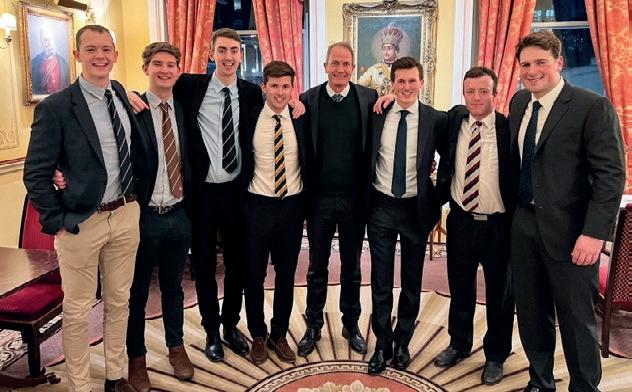
As well as offering OTs a chance to reconnect, it also reunited them with their housemasters: Chris Henshall, John Bleakley, Colin Swainson, Will Biddle, Richard Burnett and Andy Whittall as well as two of their house matrons, Clair Miller and Wendy Challis. We were honoured to be joined by the President of the Old Tonbridgian Society, Sir Sherard CowperColes, the Chairman, Richard Hough as well as some other OT Committee members.
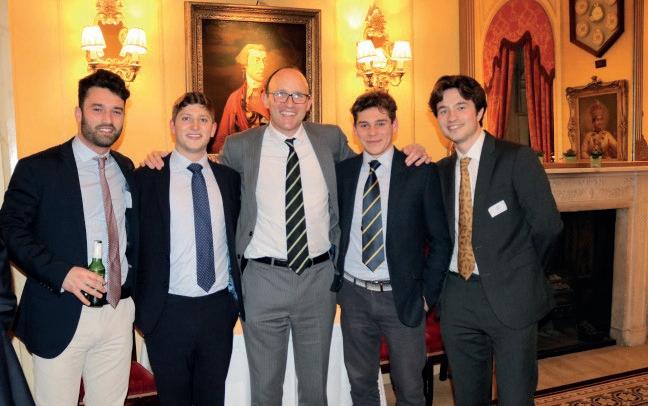
John Gibbs joined them with others from the Tonbridge Society Team: Lucy Tipler and Catherine Duncan. It was a very enjoyable evening.

On a beautiful sunny Saturday in May, the School welcomed Old Ferocians from 1943 to 1961, years in which Paddy McNeill was Housemaster, and their partners, back for a lunch splendidly organised by Tara Biddle of the Tonbridge Society.
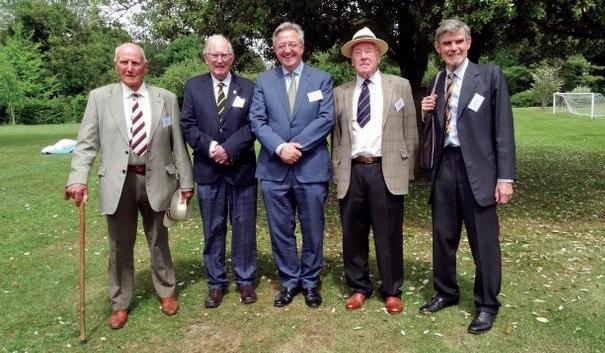


The idea was conceived by the late Martin Colvill (FH 54-58), Chris Cotton (FH 55-59), Michael Somers (FH 56-61), James Stewart (FH 56-61), the group naming themselves the ‘Ancient Ferocians’. All had once been under the care of the great Ferox Housemaster, James McNeill (Paddymac), who had instilled such integrity and honesty during his time at Tonbridge, and wanted to gather once again at Ferox to reconnect and remember good times past.
The event was well attended, some having travelled far to join us; Michael Gristwood from Johannesburg, Dominique Legrand and William Winter from France. We also had the great pleasure of welcoming back all three of the McNeill children, Anna Corbett, Patrick McNeill and Desmond McNeill, who dropped in from Oslo, as well as our most senior OF, Cmdr David Salmon (FH 43-47) and his granddaughter Natalie. James and Helen Priory, the Headmaster and his wife, were guests at the event. It was wonderful to witness the strong FH friendships still prevailing.
In honour of Martin Colvill’s memory, Martin’s wife, Linda, generously offered to fund the entire cost of the Reunion. We were delighted to be able to thank Linda personally for this magnificent gesture when she attended the lunch. On hearing about this magnanimous offer, many OFs decided to donate their event fee to the Ferox Hall Foundation Award, for which the School is very grateful.
The event began with drinks under the ancient cedar tree in the Ferox Hall garden and was followed by lunch in Big School. OFs were then invited to watch the Tonbridge 1st XI v Eastbourne 1st XI on The Head. Tonbridge were captained by Sam Hadfield, current Head of Ferox Hall, who led Tonbridge to victory by 5 wickets. Michael Somers (FH 56-61)
After a good lunch with Ben Welsh last year, we realised this summer we would have left school 40 years ago and set about rounding up our house year for a lunch. There were 18 of us in the year. Sadly we knew two of us had passed away, Rob Cave in 2014 and Andy Chapman in 2015. Ben and I were in contact with a few of the others and we set to work.
The end result was that on 10 June, nine of us sat down at the Garrick Club for a reunion lunch. Of the remaining 16, there is no trace of Giles Hardy, Pete Offord, Andrew Peacock or Chris Rennie.

We were already in contact with David Minchin, Henry Pollard, Graham Mackenzie who in turn rendered contact with Giles Ellerton, Richard Warren and Barney Mayhew. The OT Society was in contact with James Blake and I found James Curry on an internet search. One of the others found Geoff Sykes (who left in 1980 after O levels) and lives in Singapore, and Simon Smith turned up living in Thailand.
Simon joined us and was passed round the table on Skype, Geoff could not make it and neither could David Minchin who had a last minute work intervention. So, Jeremy Scott, Ben Welsh, Henry Pollard, Richard Warren, James Curry, Barney Mayhew, Giles Ellerton, James Blake and Graham Mackenzie all enjoyed a long lunch and catch up.
What struck me was the diverse lives we all lead. Being 57 or 58 we were all at or near the top of our chosen careers, and several of us were looking at retiring. Many of us had had a life of more than one career path. We were all bar one married, although one of us was a widower, only one of us had (step) grandchildren, collectively our children ranged from 31 to 13.
We all recalled happy times at School House, when it was the top floor of the main building and some ghosts were laid to rest. Some hitherto unknown nefarious acts were also admitted to. The years were rolled back and it was just like having lunch
with old friends, which is not surprising given the power of living in very close proximity to each other over a formative 5-year period in one’s youth.
I can’t think why we did not do it earlier, and we will not wait as long for the next one!
Jeremy Scott (Sc 78-82)146th OT Dinner
27 September 2022 – Lord’s Cricket Ground
OT Reunion
5 November 2022
Tonbridge School Carol Services 11 December 4pm and 7pm
5 & 10 Year Reunions February 2023
Sport has long been a strong source of fellowship and camaraderie among OTs, and the School has been kind enough to support these clubs in a number of ways.
The Old Tonbridgian Cricket Club is currently in a period of transition in terms of its fixture list.

As many OTs will remember, OTCC traditionally played Charterhouse Friars in a two-day fixture each summer, whilst also playing Old Cranleighans and entering the Sevenoaks Vine Six-A-Side tournament. These fixtures were in addition to the annual Cricketer Cup tournament each year. Unfortunately, much alumni cricket has dried up in the last few years, but we still believe there is a healthy appetite for OTCC fixtures amongst OTs. Hence, this season we are hosting an OTCC day on Sunday 31 July on The Head – this will take the form of a limited overs game starting at 1pm followed by a BBQ. We are also looking to reboot OTCC’s non-Cricketer Cup fixture list. Starting in the 2023 season, the plan is to enter an OT team into a Last Man Stands league (2-hour, 8 a-side, T20) in London. We would also welcome other suggestions for fixtures – please get in touch with Ed Hyde if you have any ideas!
There have been some personnel changes on the OTCC Committee. The current committee is: President, Chris Cowdrey; Cricketer Cup Captain, Olly Durell; Secretary & Treasurer, Ed Hyde; Committee Members, Jono Arscott, Hugo Snape, Tom Elliott, Ant Shales.
John Gibbs has stepped down from his role as OTCC Secretary and Treasurer. John’s contribution to OT cricket has been immense and without his insurmountable dedication, OTCC wouldn’t be where it is today. He has helped OTCC with so many things, from arranging matches and all the catering to go with them, driving players to away fixtures and often scoring the whole game in his inimitable neat hand. We were also very saddened to hear of the passing of David Kemp last year. David was also a huge supporter of OTCC, and he will be sorely missed at OT matches where he could invariably be found in the scorebox or walking round the boundary engaging all and sundry
in conversation. He played for Tonbridge himself just after the war and then on many occasions for the OTs and Yellowhammers on The Head, and he was one of the prime movers in the starting of the Cricketer Cup in 1967.
In 2021 we had two good wins in the Cricketer Cup over Hurstpierpoint and Radley, with Fabian Cowdrey scoring centuries in both games, but then lacked his services against Eton in the quarter-finals and lost comfortably. In the 2022 campaign we sadly lost by four wickets in the first round at Lancing after being bowled out for 130.
A number of OTs are currently involved on the professional cricket circuit. Zak Crawley (WH 11-16) and Marcus O’Riordan (FH 11-16) are currently playing for Kent, whilst Toby Pettman (WW 11-16) is contracted at Nottinghamshire and has had loan spells with Derbyshire and Kent in the past few weeks. On the university circuit, Alex Moen (FH 13-18) has been captaining Cambridge University 1st XI and Cambridge UCCE in the British Universities National Cricket League. Please get in touch with any cricket-related news! Contact Ed Hyde (FH 11-16), OTCC Secretary on 07794 787601
Following the ravages of Covid, OT Fives resumed this season with vigour and strong attendances, including the arrival of some completely new to the game (whom Neil Arnott amazed with his signature drop shots).
Season highlights included a highly competitive needle match against the jesters, which – after some warm-up, but definitely non-counting singles ended in a fitting draw (the OTs were represented by Messrs Harman, Lewis, Keyes and Oscroft; jesters were Mathieu, Jackson, Chai and Hale B). More exciting still was the fixture against the School (“the best team in 20 years”, so we were told), which included four singles and eight doubles, all closely fought. And remarkably this also ended in a 103-103 point draw!
Much beer and curry was then consumed by Messrs Oscroft, Keyes, Lewis and Mathieu, only one of whom is the right side of 50. Finally, the late season icing-on-the-cake was supplied in the shape of Martin Wilkinson’s victory in the National Grand Masters (over 75s) Doubles. Martin, ‘playing spirit-sapping reverse angles’, with partner Bev Boag triumphed over Bernard Atkinson & Mick Summerhayes (another OT) 4-11, 12-10, 11-6. Is this a record for an OT? Let’s hope it inspires us youngsters under 60!
Neil Arnott (MH 63-68)With the COVID situation at last beginning to ease, the OTGS was able to operate fully once again.
Our best golfers continue to set the standards in the competitions we enter. The highlights this year were:
2021 Senior Darwin (over 65s)
Pride of place this year went to our senior golfers (Jonathan Hubbard, Adrian Cooper, Ian Basden-Smith, Andrew Sims & Tim Jenkins), who won the Senior Darwin trophy at Woking GC, with a 2-1 victory over Clifton in the final, having beaten Malvern, Harrow and Rugby in the earlier rounds. This was the 4th time that Tonbridge have won this prestigious scratch Foursomes trophy.
Under new leadership, we had an exciting run in this years’ Hewitt, getting all the way to the final, where we fell just short, losing to defending champions, Loretto, by a whisker. Christo Lloyd took over the Captaincy and, after several trials and warm-up matches, selected a squad which was a good balance of youth and experience. In our run to the final victories were secured against Hurstpierpoint, Bedford, Glenalmond, Watson’s and Radley. None of these victories were straightforward and all the team stepped up at different moments to secure the key points.
Christo Lloyd (Capt.), Richard Partridge, Ed Richardson, George Taggart, John Spurling, Brian Ingleby, Jason Foster, Simon Rogerson, Nick Winder, Calum Mackenzie, James Norris.

The highlight of the OTGS golfing year is without doubt our Meetings (Spring/Summer/Autumn/Winter). All four were very well attended this year and everyone seemed to enjoy being back together again. The courses we played were most welcoming and in fantastic condition. This year we held two Spring meetings (due to a COVID postponement of our 2021 meeting) and in the first visited Burnham & Berrow GC and Weston-superMare GC in October. The weather was terrific, and the golf courses a pleasure to play. Hopefully we will return there again soon. In March we came back “home” to Royal St George’s GC and Royal Cinque Ports GC. Sadly, the weather was not so good on this occasion, and we got pretty much blown off the courses on days two and three of the meeting. However, we will return in 2025, which also happens to be our centenary year.
During the year we did lose some matches to COVID but in the end completed fixtures against the following societies:
• Old Marlburians and Old Shirburnians at the Berkshire
• Old Cranleighans at Royal Ashdown Forest
• Old Diocesans of Cape Town at Tandridge
• Old Eastbournians at West Sussex
Additionally, we played matches against Royal Ashdown Forest GC and Wildernesse GC.

Finally, after two consecutive COVID cancellations our annual match against the School resumed in April 2022. As ever, it was a closely fought contest but, on this occasion, the OTGS won to re-take the Chris Emms Trophy for the first time in a while.
The OTGS is in very good health and provides a great platform for all OT golfers, whatever their standard of play, to enjoy some fine courses and make great friendships with other OTs. We particularly encourage younger OTs to join us and we offer generous subsidies to make everything as affordable as possible.
If you would like to join the Society just visit our website: otgs.org.uk/ Johnny Allbrook (WW 75-80), Hon. Secretary
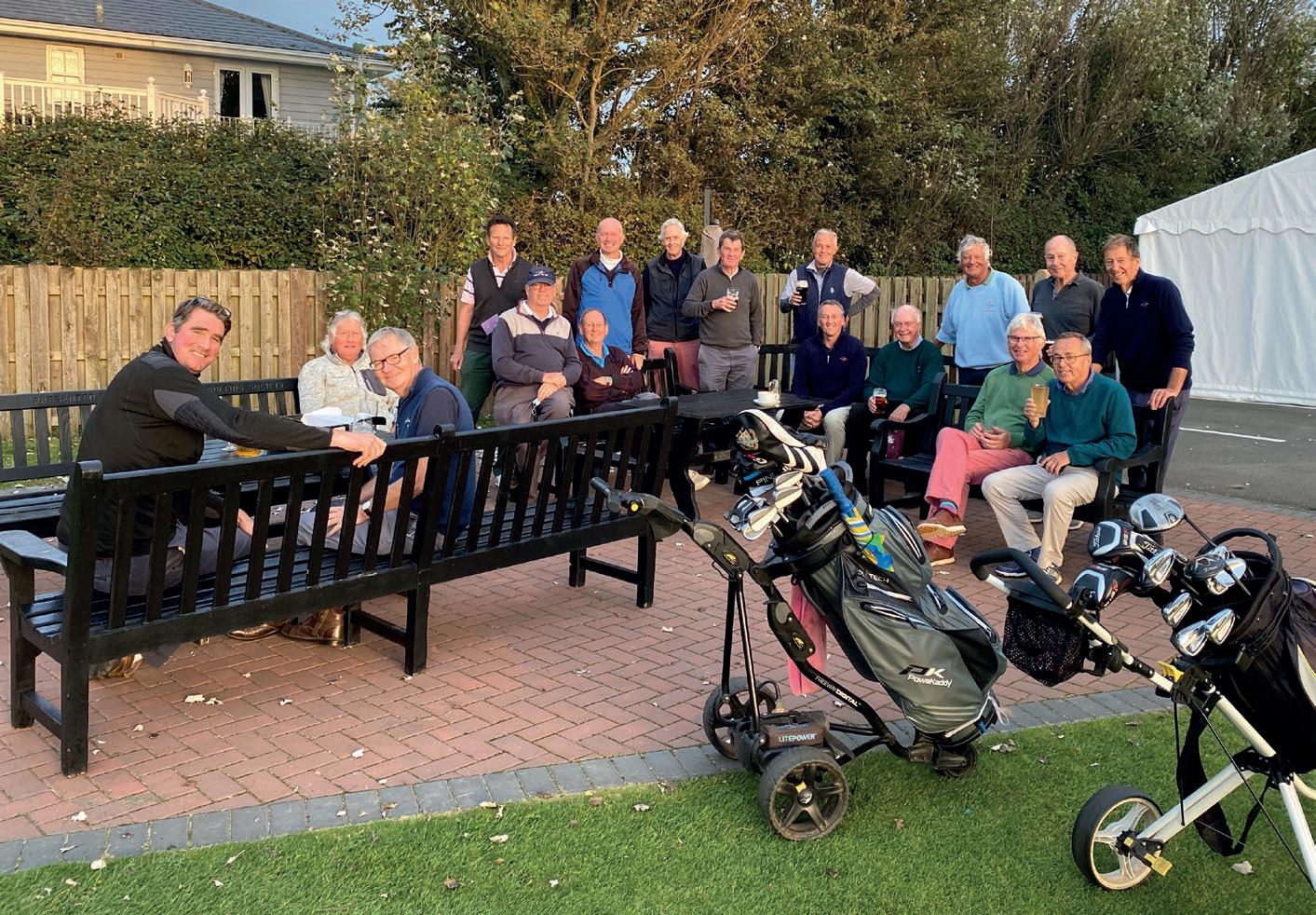
After two interrupted seasons due to Covid, the 2021/2022 season has been an historic one for OTFC as we were finally able to fully enjoy our new home pitch, Whitby’s. The 1st XI, 2nd XI and Vets have played all home games on the exquisite pitch this season and we are now the envy of other teams across the Arthurian League.
The 1st XI was led by Alex Holder (SH 07-12) this year and had a good season, finishing fourth in the Premier Division their second highest finish. Some excellent early season form at home, including a memorable 4-2 victory over Old Carthusians, meant
a title challenge was on the cards at Christmas. Unfortunately this never materialised and a few key losses in January brought us a respectable fourth place. Special mention to Michael Cotter (OH 12-17) who had a 100% playing record until the very last game when injury kept him on the side line.
In the Arthur Dunn Cup, a tough draw saw us heading to Essex twice – a 2-0 victory vs Old Foresters was followed by an agonising 3-2 loss vs Old Chigwellians in December. A second round exit was disappointing given previous cup runs but has made the squad hungry for success next year.
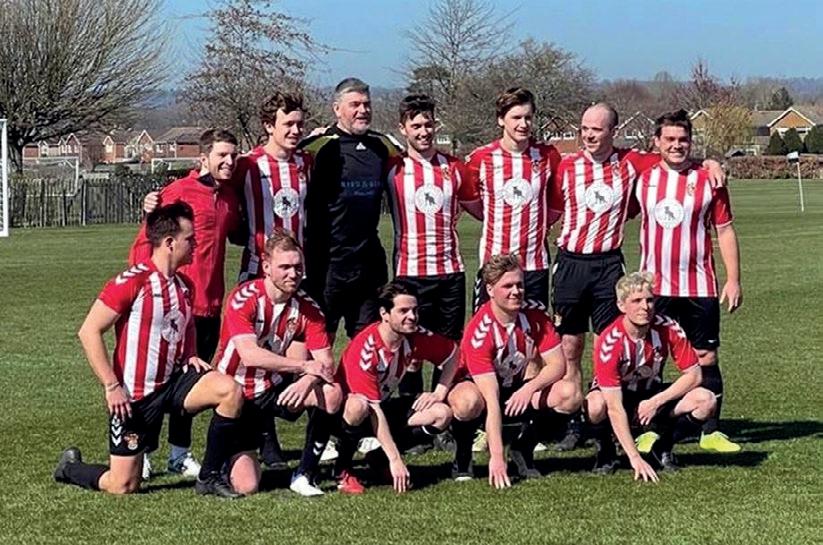
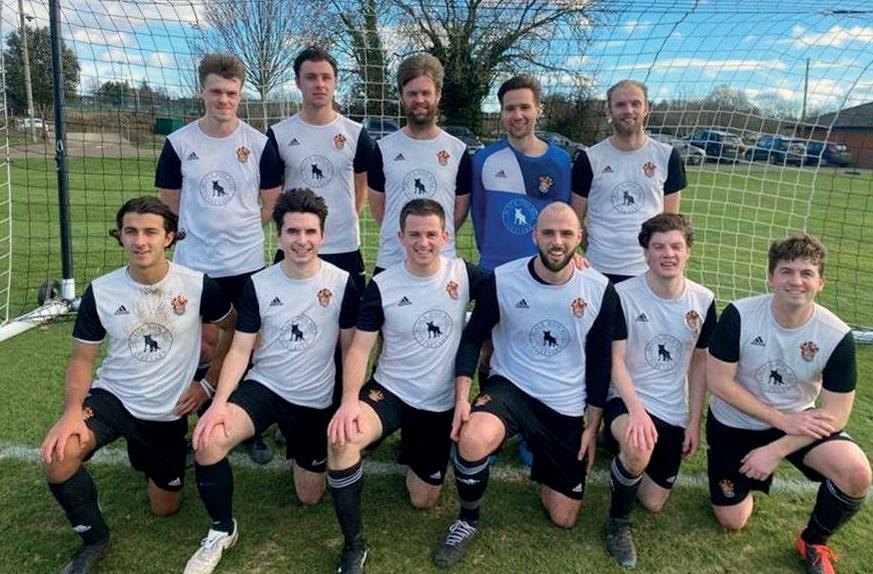
The 2nd XI also had a new captain this season as Nico Bryan (HS 13-18) took over the reins for the first time. Some tough early season form was put aside with back-to-back 4-0 victories including a scintillating performance at home vs KCS Wimbledon, a performance straight from the Bleakley playbook with high pressing fullbacks and a clinical edge in front of goal.
Frustratingly Covid wrecked any dreams of a cup run but a late season 3-0 victory at home vs Old Brentwoods gives the 2nd XI a good basis moving into next season.
Covid disruption meant there was no Veteran’s league this year, but the OT Vets did enter the cup competitions. A second-round penalty shootout loss vs Old Harrovians in the main cup meant subsequent entry into the plate. A 1-0 victory against Old Carthusians and a semi-final bye set up a final vs Old Wellingtonians. After being 1-2 down at half time, we made a gutsy comeback to win the game 5-2, James Lockwood scoring an excellent hat-trick.
A number of Vets played at the School again for the first time in many years and were hugely impressed with the setup and inclusive community feel in and around the Tonbridge School Centre. We are very grateful to the staff and groundsmen for their support and hard work.
Off the pitch, the Club have been reacquainted with the George & Dragon for post-match teas (so if any teachers are at a loose end at 2pm on a Saturday, please do join!) and attendance after games has been high, giving the Club a great social atmosphere. Social Secretary Seb Herran (OH 06-11) organised a very festive Christmas social and an off-season social is also booked in for the summer.
A memorable season for the Club and my thanks go to captains Alex, Nico and Dixie as well as the ever-present Club Chairman, James Mitchell, for all their hard work.
Charlie Adam (OH 08-13): cjnadam@gmail.com
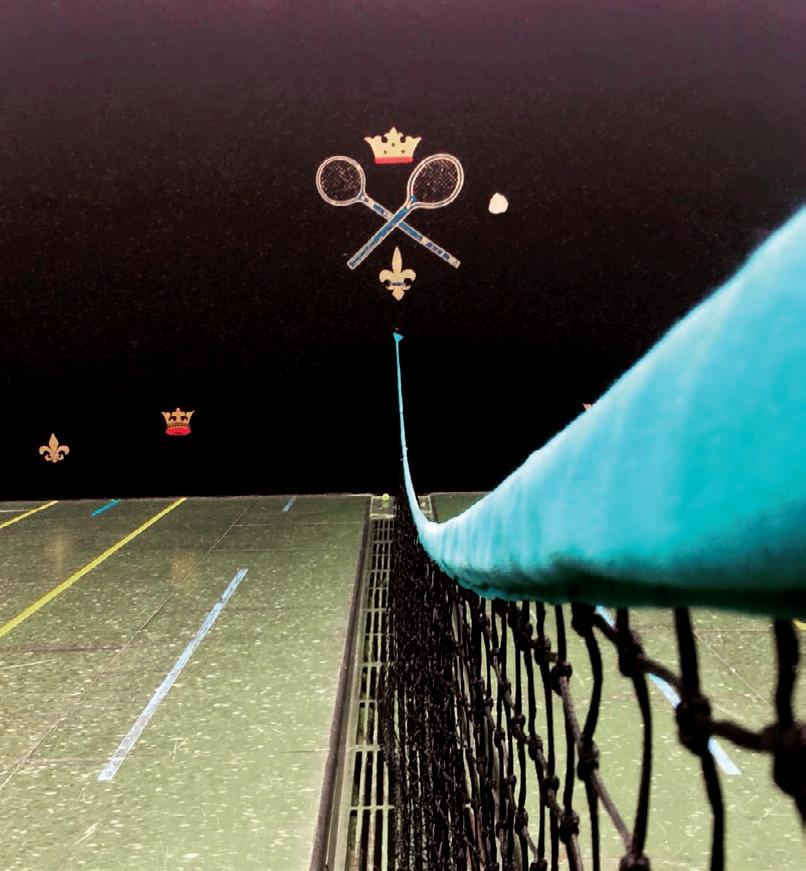
The OT Real Tennis club has emerged from the Covid doldrums in fine form. To get the season off to a strong start, Michael O’Dwyer and George Nodder gave a creditable performance in the Cattermul Cup at Middlesex, reaching the quarter finals – a task made all the more difficult by being the lowest handicapped team of the whole weekend.
From there we played our regular fixtures against the Queen’s Club (an honourable draw) and Petworth, with the latter an excellent hard-fought contest in which the OTs prevailed 55 games to 51 with some newer faces in Peter Gearing and Jack Shields providing excellent support to the club stalwarts of Richard Dalzell and Charles Fuente.
The club was able to field two pairs in the recent triangular played at Queen’s Club which also included Skinners’ and the Hong Kong Real Tennis club. In the first-string competition the OTs started with a draw against HK before falling short against a very useful Skinners’ pair – perhaps a sensible move given the presence of the former head of the School’s governors in the Skinners’ ranks. The second-string pair went one better, putting HK to the sword before also coming second to a strong Skinners’ pair.
We will continue to enter the Old Boys’ tournaments (both handicap and level) and enter pairs for the other major club tournaments. This provides opportunities for everyone to get involved from those with handicaps in the low teens to 60+. The sport lends itself to talented sportsmen from a cricket, rackets and tennis background and we are always keen to hear from anyone wishing to play.
George Nodder (PH 03-08)The Old Tonbridgian Squash Club is thrilled to return to the court after a brief hiatus over the last couple of years.
We returned in the 21/22 season with the usual friendly competition against the Old Salopians, The Wine Trade Society (followed by a more competitive wine tasting!) and were graciously hosted at the RAC for a mixture of singles and doubles. Suffice to say, we have emerged from the pandemic with vigour and are enjoying our team squash. We hope to rebuild the fixture list over the next few seasons, both the friendlies for the more socially minded squash player and for the more serious Londonderry Cup types.
On a more serious note, we were deeply saddened by the news that Gordon Aylward recently passed away. In his retirement Gordon re-invigorated the OT Squash Club, building a fixture list of like-minded teams in London and Kent. He started the club in 2006 and for 12 seasons took on the thankless task of organising matches and cajoling people into playing whilst retaining a sense of humour at each diary malfunction that resulted in an incomplete team. He was an everpresent force on the viewing balcony, always with a word of encouragement for the clueless or a shrewd tactical insight for those who might be talented enough to act upon it. He was able to make even the most mediocre squash performance feel worthwhile and will be sorely missed. OTs continue to benefit from the club that Gordon restored to its current form and we could not be more grateful.
We will always welcome OTs who are looking for some squash and are keen to keep the OT Squash Club growing.
Anyone keen to revitalise their squash career and get involved please contact Alex Mount (PS 05-10): alexanderspencer.mount@gmail.com
The courts are calling more OTs to get involved
OT Rackets Club have enjoyed a lively season.
In the Noel Bruce Doubles Competition (national doubles competition where you partner up with another player from your school), Tonbridge fielded nine pairs (second highest number of pairs). Tommy Shields & Nick Hutton and Olly Howick & Ed Hyde won their groups and progressed to the main draw – unfortunately neither pair could advance past the first round. The other pairs that represented Tonbridge were Alex Moen & Julian O’Riordan, Ben Robinson & Tom Astley, Olly Durell & Tom Elliott, Ed Springett & Eddy Gray, Tom Woodthorpe & Will Shields.
On Tuesday 5 October, the OTs took on the current School players in an afternoon of rackets. Matches were played between the OTs and the 2nd, 3rd and Colts A pairs on both courts over the duration of the day. The OTs were victorious in most matches, but the performances of the current boys illustrated the quality and depth of Tonbridge rackets this year.
On Saturday 27 November, the OT Rackets Tournament was held at Tonbridge. An enjoyable day was had by approximately 25 OTs and current School players. Many thanks to Dave Makey for organising the day. The results for the tournament were:


– ‘A’ Singles: Tommy Shields beat Ed Hyde 15-7
– ‘B’ Singles: Ed Springett beat Will Shields 15-6
–
Doubles: Jamie Rowe & Ed Hyde beat Ed Owen-Browne and Ollie Carr-Hill 15-12
A number of OTs were active in national tournaments in both the UK and US this year, with Tom Astley, Eddy Gray, Ed Springett, Ben Calow and Tommy Shields all playing in a number of tournaments.
Ed Hyde (FH 11-16)
The OTSA has had an excellent year’s sailing. We achieved our best ever result (3rd) in the Arrow Trophy Racing in October 2021, won the J/80 Spring Regatta at Queen Mary Reservoir in April 2021 and in June 2022 celebrated 70 years of sailing at Tonbridge with sailors of many vintages returning to Tonbridge to share their memories of sailing.
The club races in the Arrow Trophy on the Solent every year and this year’s race is on 1-2 October 2022, and last year we entered the J/80 regatta on Queen Mary Reservoir. We are always on the lookout for sailors who would like to do some yacht racing. In particular we are keen to give younger OTs a chance to sail and race yachts and the club can provide some subsidies for younger OTs to facilitate that.
Tonbridge takes 3rd place in Arrow Trophy Racing 2021
The OT Sailing Association achieved its highest place finish ever, going home with a trophy.

This was an eventful weekend. Top of the list was the fact that Tonbridge achieved its highest place finish since first entering the regatta in 2011. After the cancellation of all 2020 events, it was a joy to be back. Our crew, skippered by Peter Impey, sailed over from Portsmouth to Cowes in the gloom of Friday evening, giving us minimal time to familiarise ourselves with this brand-new yacht. Come the dawn we were ready; in the three scheduled fleet races Tonbridge notched up two second place results and one ninth, putting us third overall. But for an unfortunate tack at the final mark in race 2, it is possible we could have taken second place. Such are the fine margins of competitive sailing but, given the appalling conditions which confronted all of us on Saturday, we were limited to sailing with two reefs in and no spinnaker, so it was pleasing that we came through unscathed. In spite of the strong winds, rain and big gusts, it was genuinely competitive, with Bradfield and Uppingham making our lives difficult throughout. Indeed, the final placings saw Bradfield the winners overall, Uppingham second and Tonbridge third.
After victory at the ATYRA J80 Regatta in April of this year, where Tonbridge was
dominant, we were quietly confident of doing well in the bigger boats, though the Arrow Trophy can be a bit of a lottery with the weather. This year the 26 entrants were split into two separate fleets
to accommodate the new boats, which were significantly different to the Oceanis 37s. Given that the original intention of the regatta was to race in one-design yachts this seemed a reasonable compromise. OTSA was assigned one of the new Sunsail F41’s, Sunsail Zephyr, which our skipper described, with some understatement, as ‘uncooperative in race conditions’, making the job all the more tricky given that we had to get used to it ‘on the job’. Excuses aside, it was the same for everyone and undoubtedly we were pleased that conditions prevented us from having to hoist the spinnaker…
We were sorry that our Secretary and long-standing skipper, Alistair Impey, was unable to sail with us this year due to illness, but it was largely down to his energy and organisational skills that we mustered a crew and found a boat. We look forward to his return next time.
The 2022 regatta will be held on the weekend of 1st/2nd October. Please get in touch via Tonbridge Connect: tonbridgeconnect.org if you are interested in joining us, or alternatively via email on otsailing.sec@gmail.com
The OTSA also arranges participation in other events: Belvidere Cup and J80 Regatta in April and the Generations Cup/ Nick Turner Trophy in May. Please get in touch if any of these interest you. Nick Pointon (WH 84-89)
If you are interested in sailing with us, please get in touch with the Club Secretary at otsailing.sec@gmail.com
The OT Rifle Club had a good year, with prizes at Bisley last summer, a record number of full-bore practice shoots, steadily growing membership, and one of the Club’s members chosen for the GB Palma Squad for 2023.
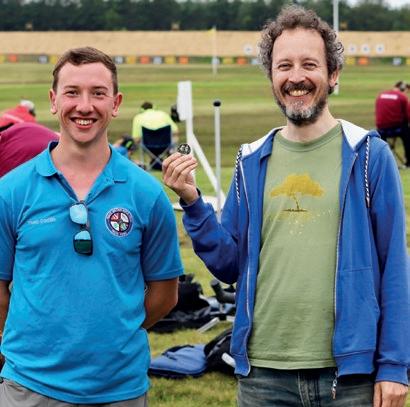
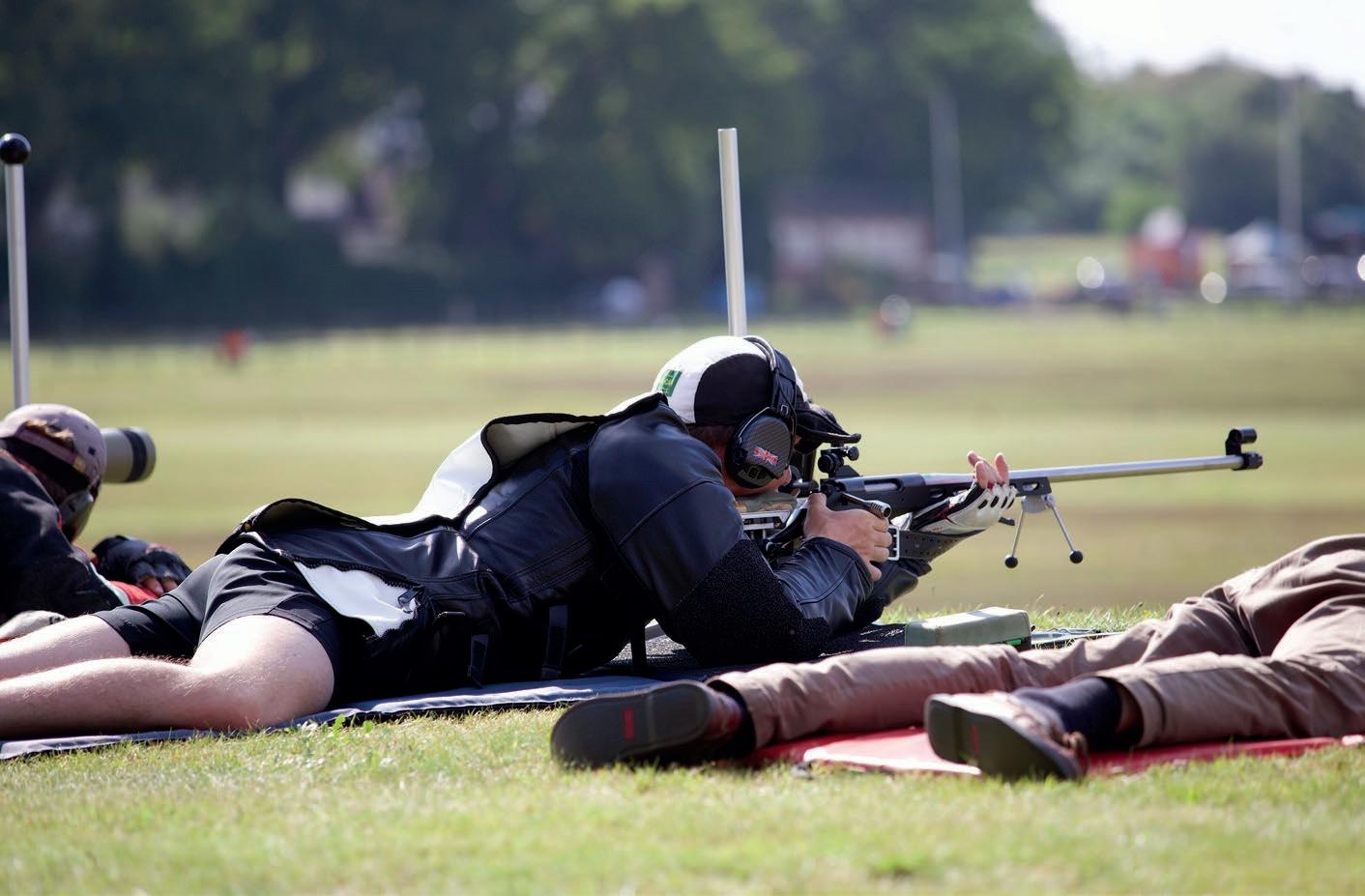
The Club’s star shooter is Theo Dodds (WW 08-13). Having joined the Royal Navy in 2020, last year was his first year representing the Navy at the main shooting event of the year, the Imperial. Held over eight days the Imperial brings together the best full-bore shooters in the UK (plus many from overseas), to shoot over ranges from 300 to 1,000 yards. Theo finished a very impressive fourth in the Grand Aggregate (his highest place to date) and took the top prize amongst all shooters from the Armed Forces. With a strong field from the Army this was a good result and later in the year earned Theo the accolade of Royal Navy Young Sportsperson of the Year. Having represented GB in the Under 21 and Under 25 teams, Theo has now been chosen for the adult GB squad, which competes internationally for the prestigious Palma Prize. He got things off to a good start with wins in
the annual Jersey Rifle Association Spring Prize Meeting in May this year, representing Wales (his mother Jo’s place of birth).
Theo’s shooting skills were honed at the School during his time there and demonstrates the importance of what to some are seen as minor sports at Tonbridge. The fact he now represents his country, whilst still finding time to coach OTs, is testament to the spirit of Tonbridge passing through the generations. Shooting develops the boy every bit as much as chasing a ball around the place.
The OTs had a successful Veterans Match in July last year. Sean Williams (FH 86-90) won a Bisley Gold Medal for scoring a ‘possible’ of fifty out of fifty. Theo scored a rare fifty with ten ‘V’, or inner bulls – the highest possible score. The OTs achieved their highest ranking in the competition in memory, placing a creditable 17th out of 41. Theo’s father Henry Dodds (PS 70-75) competed alongside him at the 2021 Imperial, enjoyed the competition, and even made it onto the prize list at 900 yards.
Normal shooting activities against the School were severely curtailed by
Covid restrictions but we did manage one small-bore match in March of this year. We were soundly beaten by both school teams but a good time was had by all. As ever, we were warmly welcomed to the School by Larry Thornbury, Tim Blackwell and Russell Freeman, to whom plaudits are due for the fine work they do.
Henry Dodds (PS 70-75)
After leaving Tonbridge in 1988, Jono studied Law at Magdalene College, Cambridge where, as well as a dash of work, he won blues for Cricket and Hockey and was President of the University’s student sports body –‘The Hawks Club’. Flirtations with law, investment management and self employment followed before Jono settled on a career in teaching, firstly at Ludgrove Preparatory School, then back at Tonbridge for 12 years running the Hockey for ten years and the 1st XI cricket for a while too. After three years at Marlborough, Malaysia Jono is now Head of Enrichment at the Cambridge International School in Bratislava, Slovakia.

In his spare time Jono has always taken a keen interest in the OTs and the School, captaining the OT cricket side for a number of years, regularly attending the dinner and City drinks and taking an interest in OTs of all generations. He is in his second stint on the Committee. He likes travel, sport, the outdoors, reading and theatre, and, to borrow and twist an OT phrase of some repute, connecting people.
Dominic was in Judde from 1980-85. After leaving School, he spent a year as an English-Speaking Union Scholar at The Hill School in Pottstown, Penn. He remained in the United States and graduated from Vanderbilt University, Nashville, Tenn in 1990, returning to London to work at Condé Nast on Vogue and GQ for six years.
After a year at Harrods as Marketing Manager, he joined the family PR firm in 1997 and became Managing Director in 2000, rebranding the business and relocating them to Bermondsey Street. He is now Founding Partner of ANM Comms, a partnership formed with similar agencies in 2018, and specialises in communications for high end and premium lifestyle brands around the world.

Dominic is also a co-founder and Director, with his wife, of JJ Corry, an award-winning luxury Irish Whiskey business based in County Clare and exporting to key markets around the world. He is also involved in the OT Football Club and has been part of the Tonbridge intern programme since its inception.
Chris was at Manor House between 1978 and 1982, and went on to Exeter University to study Economics. He is currently Chief Executive Officer (“CEO”) of Talbot Underwriting Ltd (“Talbot”), which operates within the Lloyd’s Insurance Market through Syndicates 1183 and 2019 and is a member of the Talbot Underwriting Board. Prior to joining Talbot, Chris worked for StarStone Group, where he was interim Group CEO, having previously served as CEO of International and Deputy Group.
A seasoned executive with extensive international leadership experience in insurance and finance, he joined StarStone in August 2018 as Executive Chairman before assuming the newly created role of President in October 2018 to lead execution and operational capabilities. Formerly, he was Group CFO for MS Amlin plc and previously served as Commercial Director and CFO at the National House Building Corporation, and prior to that as Group Chief Accountant at RSA Group.

Jeremy was at Hill Side from 1997-2002. After leaving Tonbridge, he read History at the University of Edinburgh, and also spent a year at McGill University in Montreal. He then worked as a solicitor in London and Tokyo for around ten years, specialising in EU competition law, before joining SSE, the energy company, in 2018 as a member of its General Counsel Team. Having grown up in the town, Jeremy now lives back in Tonbridge with his wife, Louise, and two young children so has seen the School develop and change from the immediate locale. He enjoys openwater swimming, dog walks with the family, and stand-up comedy.
Philip was in Parkside from 1984 to 1989. He studied Modern Languages (Spanish and French) at the University of Cambridge, before embarking on a career as a City solicitor. Since 2005 he has been a Partner at Travers Smith LLP specializing in cross-border mergers and acquisitions and is currently the firm’s Head of Corporate M&A and Equity Capital Markets. Philip lives in Sevenoaks and, when time permits, is a busy father, a literature enthusiast, a keen follower of rugby, and a determined runner.
Richard was in Park House between 1979 and 1984, under David Kemp and then John Gibbs. After Tonbridge, he studied Law at Durham University and then pursued a legal career in the City. He took articles at Allen & Overy in 1990 and has remained at the firm throughout his career, advising corporate clients on a variety of M&A transactions and other matters.



He lives in Effingham Common, Surrey Hills, and is married with three children. His two daughters went to Cranleigh and his son has recently left Tonbridge, with a better bowling average than his Dad. He plays golf at Walton Heath and his other hobbies include cycling, AFC Wimbledon, wine and holidays in Majorca.
After leaving School House in 1983 and a gap year teaching, Paddy studied law at the University of Manchester and then for the Bar. He was called in 1988 to the Middle Temple and in 1998 to the King’s Inn Dublin.
He has practised in London since 1989 specialising in commercial litigation, insolvency, sports law and reputation management at 3 Hare Court. In 2018 Paddy founded Leverets in Sevenoaks, a combined firm of Barristers and Solicitors.

Paddy lives in Kent where his daughters are in school and is an appointed Kent Ambassador as well as serving on the Committee of Kent County cricket Club.
Seb (PH 80-85), now with NATO in Italy, is a former British Army Colonel, leadership mentor, Defence Envoy and sports Chairman. He has a background in graduate development, teaching leadership at Sandhurst and at Cambridge University (where he currently mentors on Homerton College’s Changemakers Programme). He is a recent parent of two boys at the School (2012-20).
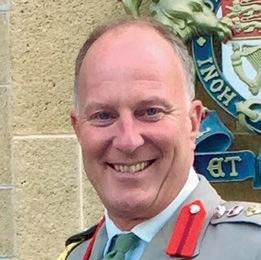
Hugo was in Park House between 2004 and 2009. He then went onto study Agri-Business Management at Newcastle University, which lead to seven years working for Craigmore Sustainables, a farming and forestry investment and asset manager based in New Zealand, where Hugo lived for a few years.
He now works for the Farm Energy Company, a renewable energy developer whose key focus is on decentralised power generation for large energy users. Hugo lives in London but spends a lot of time in Kent either playing cricket for the Shepway Stragglers or the Old Tonbridgians, or enjoying the countryside in many different ways.

Peter was in Manor House between 1973 and 1978. He is now a barrister in an independent practice. Having read History at Corpus Christi College, Cambridge, he began his career as an investment adviser at a leading City bank. He started in practice at the Chancery Bar in 1993 and now specialises in matters involving finance or property, in particular professional negligence claims against financial advisers and solicitors. Cases in which he has appeared include Dreamvar (UK) Ltd v Mishcon de Reya, the leading Court of Appeal authority on identity fraud in conveyancing transactions.
Aside from his practice, he maintains an interest in history generally and legal history in particular. In the field of legal biography, he has written articles on William Woodfall (OT), the original author of Woodfall’s Landlord and Tenant (the oldest English legal textbook still in publication) and Chief Justice of Cape Breton until his death in 1806.
Richard was in Parkside from 1982 to 1987. After university he initially embarked on a career in commercial property, working for a firm of Chartered Surveyors in the West End, but then joined the army and was commissioned into the 9th/12th Royal Lancers, seeing service in the UK, Cyprus, Germany and Bosnia. On leaving the army in 1998 he studied for an MBA at Cass Business School in London before embarking on a career in investment management. He now works for Argenta Private Capital, which advises investors at Lloyd’s of London.
In his spare time he enjoys taking part in OT golf and shooting fixtures. Richard is also a liveryman of the Drapers’ Company in the City and a trustee of the Officers’ Association charity. He is married with two daughters.

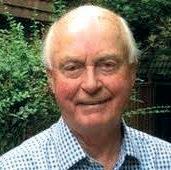
Richard was in School House from 1953 to 1958 but, despite being in the Classical Sixth, the end of National Service squeezed him out of a place at Oxbridge. He qualified as a Chartered Accountant and has worked in the financial services industry, before taking early retirement in 1993. He subsequently spent nine years as a regulator, ultimately with the Financial Services Authority, before retiring from paid employment. He was secretary of the OT Golfing Society for 28 years until 1995, and is a member of Littlestone, St George’s Hill and the R&A, where he completed eight years first on the Rules Committee and then the Championship Committee, refereeing at eight Open Championships. He has been a keen squash player and also enjoys real tennis, being a member of the Royal Tennis Court where he was chairman for six years. He has served on the OT Society Committee for 20 years and was honoured to serve as President in 2013/14.

The following deaths and obituaries section covers notifications that we were made aware of between 1 May 2021 and 30 June 2022. For more recent obituaries and notifications, please see our website at: tonbridgeconnect.org/news
PAIN, Barrie Reginald Kirby (SH 38-41)
Died peacefully at home, aged 97, surrounded by his family in October 2021. He will be sadly missed by his widow, Edith, two children and two stepchildren plus eight grandchildren.
GOODING, George Henry (HS 41-45)
Died on 13 August 2021, aged 94 after a few days in hospital. A devout Christian, he leaves behind his beloved son Robert, daughter-in-law Carole and grandchildren Tim and Emma. After National Service in the Royal Navy, George and his late wife Jean lived in Singapore and Malaysia for ten years before returning to the UK where he enjoyed a career in Credit Control.
MITCHELL, David Hunter (Sc 42-45)
Died on 21 February 2002, peacefully at home aged 93. Beloved husband of Charlotte, much loved father of Robert, Caroline and Hilary, proud Grandpa of Katie, Annabelle, Julie, Ellie and Fiona and great-grandfather of Emilia.
KEMP, David Stephen (PS 42-47)
Acting Headmaster (1989-90) Second Master (1971-89) PH Housemaster (1969-84)
Died on 23 September 2022, aged 92. Dearly loved husband of Marion, father of Anthony (deceased), Will and Peter, grandfather of Thomas, Emy, Ada and Freddie, and uncle. Dedicated schoolmaster at Tonbridge. A detailed tribute to David can be found on page 22 of this magazine.
GRAHAM, Andrew Alexander Kenny (Alec), The Right Reverend (WH/FH 43-47)
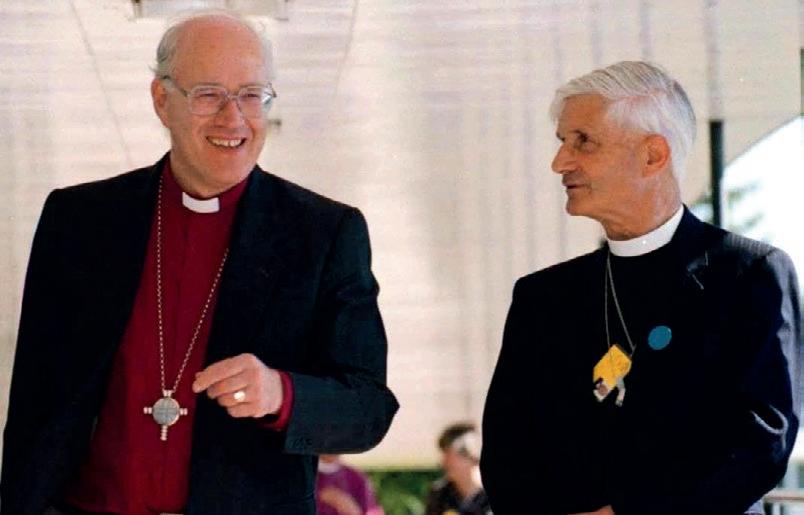
Died on 9 May 2021, aged 91. This obituary was edited from one published in The Daily Telegraph on Friday 14 May 2021.
Although he came to theology after studying Modern Languages and started with no more than the Oxford Diploma in Theology, Graham quickly made up for lost ground and on his retirement the Archbishop of Canterbury described him to the General Synod as “a theological polymath”. He had by this time been chairman of the Church of England’s Doctrine Commission for eight years and very successfully held together a group of professional theologians of sharply differing viewpoints. He was rewarded for this by the award of a Lambeth DD.
Andrew Alexander Kenny (Alec) Graham was born on 7 August 1929, son of Andrew Harrison and Magdalene Graham. After Tonbridge School and National Service he went up to Oxford as a Scholar of St John’s College. He prepared for Holy Orders at Ely Theological College and from 1955 to 1958 was a curate in Hove.
By the end of this time his theological learning had advanced to the point where he could be appointed Chaplain and Lecturer in Theology at Worcester College, Oxford, and two years later he became Fellow and Tutor of the College.
He proved to be an inspiring teacher and, although he valued the Catholic tradition of the Church of England, he was always open to new insights, provided they were sufficiently grounded intellectually.
From 1970-77 Graham was Warden of Lincoln Theological College and a Canon of Lincoln Cathedral. This
was a period of sharp decline in the number of men preparing for ordination, but able women, hoping that the way to the priesthood for them would not be barred indefinitely, were training to be deaconesses.
Graham welcomed them into the college, strengthened its links with Nottingham University, and provided both men and women with a rigorous and stimulating theological education.
In 1977 Robert Runcie, requiring a Suffragan Bishop of Bedford, nominated Graham and for the next four years he exercised a much valued ministry in the less fashionable part of St Alban’s Diocese. Small of stature, he none the less had a natural dignity and an authority derived from an acute mind.
In 1981 Graham became Bishop of Newcastle at a time when economic depression was taking a heavy toll of industry and community, and the morale of the clergy was sinking in the face of seemingly intractable parochial problems. Graham tackled this situation with great skill and commitment, and quickly won the confidence of all sections of the community.
Graham was someone to whom Archbishop Runcie often turned for advice, and in 1984 he became chairman of the Advisory Council for the Church’s Ministry – a key position for the selecting and training of future clergy. But after only three years in this post he was urgently needed for the chairmanship of the Doctrine Commission, he being one of the few diocesan bishops equipped for this role.
The most important task the Commission faced during the next eight years was liaison with the Liturgical Commission over the theological aspects of the revision of the Church of England’s worship, and Graham was ideally suited for this work – respected by the liturgists and at the same time not discouraging to those who were seeking to improved the quality of worship, especially its dignity.
Following his retirement in 1997 he became an Honorary Assistant Bishop in the Diocese of Carlisle where he gave much assistance in the parishes and indulged further his great love of fell walking. He was unmarried.
CATMUR, Richard Stucley (FH 43-47)
Died peacefully in his sleep in Denver, Colorado, on 3 October 2021, aged 92. The following obituary was written by Richard’s son, James.
Richard was born on 13 June 1929, in Handforth, Cheshire, England, to Norman Wilfred Stucley Catmur and Jocelyn Willsher Catmur [Weekes]. He was their second son, and only got involved in the family business, Catmur Machine Tools, after his elder brother’s early death.
Richard attended Tonbridge School and then, after military service, read Chemistry at Brasenose College, Oxford (1949-1952). He strongly valued both education and family, so he helped all 14 of his grandchildren get a degree and his nephews and nieces get a good education.
While at BNC he met his future wife, Paulla Johnson. Paulla and Richard married soon after coming down from Oxford. After leaving BNC he joined ICI and remained with them until his retirement, although by then he worked for what would become Astra Zeneca. His work resulted in the family moving locations every few years and Richard rose to become head of the company’s operations in Mexico and then in Spain. The nomadic life involved living at various times in Derbyshire, Kent, Somerset, Sussex, Mexico City, Barcelona, Pennsylvania and then finally Colorado, with a growing family of, eventually, five children and always a selection of dogs, cats, various farm animals and horses. Richard’s involvement with horses came through Paulla, and normally resulted in them living on a farm with many horses, dogs, cats, hens, and in some cases pigs and cows. Even when living in Mexico they kept a selection of horses at a stable, since owning a farm was not possible.
He was always a keen hillwalker and climber; he and Paulla developed their mutual love of climbing in both the Lake District and the Alps. A life-long family friend remembers climbing with them – they were making an ascent in the Ecrins and a flying stone hit Paulla on her eyebrow causing a deep cut with a lot of blood. She quite firmly refused to go down
and they went on to reach the summit. Such tenacity was a mark of their lives together.
He and Paulla were also ‘early adopters’ of skiing, and some of his children’s earliest memories are of arriving on the night-train in some snowy, cold, Alpine resort.
Richard will be remembered for his generosity, donating to many charities and good causes, including sponsoring a succession of young Polish refugees from the Ockenden Venture through the 1950s and 60s and supporting the Himalayan Foundation with educating young children from rural villages, especially girls who don’t always get an education. We remember him for the simple things, six-inch nails, harvesting olives, tending a vegetable garden, shelling almonds in the kitchen, walking the dog through the wild rosemary, hiking in the Montserrat, across Kinder, through the canyons of Utah.
He died in Denver, Colorado on 3 October 2021, and is survived by five children, fourteen grandchildren and eleven great-grandchildren (and counting!).
BIDDLE, Frank Anthony Fenwick (Tony), Dr (Sc 43-48)
Died peacefully surrounded by his family on 8 November 2021, aged 91. Dearly loved husband of Pam, father of Jo, Amanda, Johnny, grandfather of eight and older brother to David (Sc 45-50). He will be greatly missed by all.
CHARTERS, Roger Pemberton (HS 44-47)
Died at home on 7 June 2021, aged 90. Ornithologist, photographer, past Chairman of British Wildlife Sound Recording Society. Much loved husband, father and grandfather.
IGGULDEN, Michael James Louis FRICS (Mike) (WH 44-49)
Died on 18 December 2021 after a long illness, aged 91. Much loved husband of Susan and father to Sarah, Rebecca, Jennifer, Gregory and Nicolas. A chartered surveyor, Mike lived a full and active life. He will be greatly missed by his family and friends.
BASFORD, Colin Vickers George (Sc 45-49)
Died on 23 March 2022, aged 90. Much loved husband of Moira, father to Christopher (PH 76-80) and Nicola and grandpa of Evie and Rollo.
GREENWOOD, Julian Hope-Shaw (HS 45-50)
campaign against the Malayan Communists. Julian’s role was to fly his Dakota as low as possible over the jungle tree-canopy, while tannoy speakers fixed under the wings broadcast psychological war messages to guerrilla forces in hidden camps below. It was a risky operation.
He was demobbed shortly after these adventures, and by the end of 1956 he had his Senior Commercial Pilot’s licence. For ten years he worked in some of the world’s most attractive sounding locations: in Port of Spain, Trinidad, for British West Indian Airways; in Bermuda for Eagle Airways, and then in Hong Kong for Cathay Pacific.
ALLEN, Michael Robert (MH 45-49)
Passed away on 22 October 2021 aged 90 having suffered with dementia for the past few years. He leaves behind his wife, Jean, and his brother David, who also attended Tonbridge. He will be much missed.

FRANKS, Jonathan Harold (PS 45-48)
Died on 5 February 2021, aged 88. The following obituary is an adapted version of Julian Greenwood’s Eulogy.
Julian was seven years old when the Second World War broke out. He joined his brother and sister at Vinehall boarding school in Sussex and was evacuated to the relative safety of Devon. Julian’s next important formative experience was at Tonbridge after the war, school years that he greatly enjoyed.
There was a clear road map for Julian as he prepared to leave Tonbridge. It was expected that he would study at Cambridge, and join the Colonial Service, but before taking up his university place, he had to complete two years of National Service. Aged just 18, the RAF made him rear gunner on a Sunderland Flying Boat, and on the completion of National Service, the RAF asked for volunteers for training as pilots. Julian volunteered, leading to a long and distinguished career in the RAF and as a commercial pilot.
In two intensive years between 1953 and 1955, when he graduated to Flying Officer rank, Julian flew Chipmunks, Harvards, Meteors, Mosquitoes, Hornets, Vampires and Dakotas. For six months in Malaya, between November 1955 and May 1956 he carried out what his logbook lists as ‘Loud-hailer ops’. Loud-hailer operations were part of the British

Julian then heard that Britannia Airways, which operated out of Luton Airport, was planning to phase out its turbo-prop aircraft and move to jets. He had already been flying a Convair-880 jet for Cathay Pacific, and he was so much the ideal candidate for Britannia that it took only a single round of golf with their Deputy Chief Pilot to convince Britannia to recruit him.
We will fast-forward a few years to 1973, when Britannia Airways recruited a glamorous, vivacious, and very witty new flight attendant called Sheila Doyle. Sheila soon became aware of the man her colleagues called ‘The Gentleman Pilot’ – a pilot who was always considerate and courteous towards his crew. Julian could not fail to notice Sheila. They were married in 1983.
Julian retired from Britannia Airways when he reached 60, but worked for Air Seychelles as a Training Captain until the age of 65. His eventual retirement was as active as you might expect. He was now a father, to Francis. He played golf and bridge well and managed his garden with skill too.
Julian led a life that demanded high levels of technical skill and courage. But the Julian we will remember, and whom we will miss, is the man who cared deeply that things should work well; that living things and people should be looked after and should flourish. It has been said of Julian that his hallmark was a gentle kindness, and we are all a little better for having known him.
Died peacefully on 5 May 2022, aged 91 years. Beloved husband of Maureen and devoted father to Fiona and Juliet, son-in-law Douglas and granddaughter Alice. His gentle kindness and love will be greatly missed by all his family and friends.
FINDEISEN, Michael Sydney, Lt-Cmdr RN (Sc 45-59)
Died on 20 April 2022, aged 90.
BIDDLE, David Eric (Sc 45-50)
Died peacefully, with his family by his side, on 7 June 2022, four weeks before his 90th birthday. Much loved husband to Anna, father to Will (PH 76-81), Kate, George and Sarah, father-in-law and grandfather of twelve. Younger brother of the late Tony (Sc 43-48). He will be greatly missed by his family and many friends. The following obituary was written by David’s son Will (PH 76-81 and CR 2003 – current day).
After leaving Tonbridge, David completed his Royal Institute of Chartered Surveyors exams whilst doing his National Service and went on to work for RC Knight and Sons for the rest of his working life, starting in the Tonbridge office before moving to Suffolk and setting up in partnership in Stowmarket. David was a highly regarded Chartered Surveyor with a
large client base amongst the local farming community. He also auctioned cattle once a week, that would travel from as far away as Ireland, as well as ad hoc furniture sales and turkeys at Christmas!
He married Sonia Mary Mermagen (known as Anna) in 1961 and they enjoyed a long and happy marriage for the rest of his life based at Riverside Farm in Creeting St. Mary, Suffolk. These were golden years for the family who enjoyed hosting many visitors and parties. They had four children: William (PH 76-81), Kate, George and Sarah. Blissful family holidays were spent at Trevose in North Cornwall and in Northern France.
David had a great sense of community and social responsibility and trained as a magistrate, ending up as Chairman of the local magistracy and of the local Conservative Party.
David’s great love outside of work was golf. He was initially a member and later Captain at Woodbridge Golf Club before joining Royal Worlington and Aldeburgh. He was also a summer member at Trevose. He was a very good amateur player, being runner up in the Suffolk Amateur Championship in the 1980’s.
David was a regular attendee at OTGS Spring Meetings. He played in the Halford Hewitt from 1970 to 1974, was Captain of the Society in 1986/7 and President from 1994 to 2000. He also played in winning Bernard Darwin teams in 1980 vs Eton, 1982 vs Rugby and 1983 vs Malvern.
David was also one of the original founders of the Four Schools Cup, which was (and is still) played at his beloved Royal Worlington. The other schools are Uppingham, Gresham’s and Marlborough.
His companions report that David was a delight to socialise with. He was a lovely conversationalist and raconteur with a delightful selfdeprecating sense of humour. After a couple of beers he could be easily encouraged to tell one of his stories in his convincing Suffolk accent. He was great company.
Sometime after retirement, David and Anna moved into Bedingfield House, Needham Market where they continued to host friends and family. David suffered a stroke in 2019 and

moved into Park View Care Home. David died peacefully with his family at his bedside on Tuesday 7 June 2022, four weeks before his 90th birthday.
GILBERT, Richard John (PS 47-50)
Died on 22 November 2021, a few days before his 88th birthday.
O’MEAGHER, Luthfi Dennis Cian (PS 47-51)
Died on 28 January 2021, aged 87. Beloved husband of Lavinia O’Meagher.
TIVY, Peter Lawrence (MH 48-52)
Following a very adventurous life, Peter passed away on 13 April 2021, aged 87.
HADDOCK, Frank Nicholas Fraser (FH 48-52)
Died on 19 October 2021, aged 87, following a short illness.
CHRISTIE, Forrest Brian (Brian) (HS 48-51)
Died on 18 April 2021, aged 87, after many years with Alzheimer’s. An Orthodontic Consultant, specialising in cleft palates and other facial abnormalities, Brian was made an honorary member of the Craniofacial Society before his retirement in 2000.
HEAP, Geoffrey Marshall (Sc 48-53)
Died on 25 November 2021 aged 86. Much loved husband of Susie. Father to Graham, Stella, Kirsty, Kyla, Mantha, Will. Brother to Daphne and Annette.
ARTHURE, John Edgar, Dr (Sc 48-53)
Passed away in his sleep on Sunday 30 January 2022, not many days after his 87th birthday.
NYREN, Christopher Reginald John (SH 49-54)
Died in December 2021, aged 86. He will be sadly missed by his widow Julia, and sons Charles (SH 84-89) and Mike (SH 86-91)
MANDER, Michael Stuart
Passed away on 8 February 2022, aged 86 years. Much loved companion, brother and uncle. This obituary was edited from one published in The Times on Wednesday 16 March 2022.
Times Newspaper executive who tried to outmanoeuvre striking print workers in the Seventies by moving production overseas.
As a senior executive of Times Newspapers, the distinguishedlooking Michael Mander hardly expected he would be obliged to wear a cap and dark glasses to avoid being recognised. Yet that became necessary in 1979 when he was given the task of printing The Times overseas. The paper was in the midst of an 11-month shutdown as the management tried in vain to agree redundancies with the print unions and disputes procedures to forestall the wildcat strikes that had been costing millions of pounds a year. The chief executive, Marmaduke Hussey, decided a dramatic gesture was needed. He thought a revived international edition would boost morale but it was a naive misjudgment. Mander, Hussey’s slightly built deputy, was ordered to find a suitable foreign printer. After several hush-hush trips he came up with three possibilities, in Frankfurt, Miami and Virginia.
The Frankfurt site was preferred because it would involve less travelling time for the production staff. The plan was to fly a weekly 35,000 copies to 64 countries where The Times had been sold before the shutdown.
However, Mander was rumbled. Word reached the London unions three days before printing the first edition that Frankfurt was the location. Immediately before the presses were due to roll, an attempt
was made to blow up the plant. Mander said that, separately, a petrol-soaked rag had been found stuffed through an external vent into a pipe to the plant’s compressor. They printed 10,000 copies on the first day but the local police chief warned that, while he might be able to mobilise 500 policemen, the pickets could grow to 10,000 on the following May Day weekend. “What I didn’t know,” Mander said, “was that the Frankfurt region was then a hotbed of heavyhanded revolutionary organisations.” A few days later the plant owner’s car was machine-gunned on his way to the office. Although he was unhurt, Mander decided he could not put more lives at risk and pulled out of Frankfurt. Publication resumed in London in November that year, when the unions agreed redundancies and productivity improvements but the following July the National Union of Journalists began a strike over a 21 per cent pay rise. Enraged, the owner, Lord Thomson of Fleet, put the papers up for sale.
Michael Stuart Mander was born in London in 1935, one of three children of Stuart Mander, an executive with George Newnes, the TitBits, Strand Magazine and Nova publisher. Michael attended Tonbridge School. He did National Service with the Green Howards in 1954-56, serving in the UK, Cyprus and Egypt and becoming a lieutenant.
He won a place at Oxford but decided not to take it up. With the help of his father’s contacts, he joined Associated Newspapers, publisher of the now-defunct London Evening News, where he became executive director.
By 1970 high wages and growing competition for advertising revenue from television were imperilling the finances of many Fleet Street papers. As part of a reshuffle at Times Newspapers, Mander was recruited as advertising and marketing director.
After the sale of The Times and Sunday Times to Rupert Murdoch in 1981, Mander moved to the Thomson Organisation, joined the Thomson board and was appointed chairman and chief executive of Thomson Information Services. He later moved to New York to be a director of Thomson Publishing US.
In 1986 he started a City career as a director of the merchant bank Hill Samuel and then became director of corporate finance at another bank, Close Brothers. Mander was a chairman and vice-president of the Institute of Directors from 1993 until 2004, when the previously right-wing organisation was accused of cosying up to the Blair government.
A single man who had no children, he enjoyed photography, marine art, skiing and sailing. For many years he owned a boat, Mon Tour, based at Hamble on Southampton Water in Hampshire.
Michael Mander, newspaper executive, was born on October 5, 1935. He died from complications following a fall on February 8, 2022, aged 86.
TRINDER, John Frank Scott, Captain CBE RN (Sc 50-53)
Died peacefully at home on 23 March 2022, aged 85 years. Much loved widower of Rosalie, father of Lucy, Kate and Andrew and grandfather of Joe, Milo, Oscar, Benedict, Alfred, Julian and Nina.
WOODTHORPE, David John (SH 50-54)
Died on 2 May 2021, aged 84.
WHITE, James Richard (SH 50-54)
Died on 13 September 2021, aged 85. Late of Etchinghill, Folkestone. Son of Dicky and Cherry White.
ODELL, Peter Martin (PS 50-54)
Died peacefully at home 24 October 2021 after a long illness, aged 85. Much loved father, grandfather, great grandfather and friend to all who knew him in Bosham, West Sussex. The following obituary was written by Peter’s son, Tarquin and has been edited for this magazine.
Peter Odell, who has died aged 85, always looked back on his Tonbridge years (PH 49-54) with great fondness – particularly the time he played at Lord’s against Clifton. The chance to get to play at Lord’s was one of the main reasons Odell’s father sent him to the School. His first match was unremarkable; except for a catch he took on the boundary. It was almost
certainly going to be a six, but Odell lent back against the boundary ropes and caught the ball behind his head. His second outing against Clifton in 1954 was more exciting. He came out to bat and made 92 runs. “It was the highlight of my existence,” he said in later life. The copy of Wisden, which recorded the feat, remained a proud possession. That 1955 edition records that he opened the batting for Tonbridge in 1954 and over 14 innings scored 408 runs.
Peter Martin Odell was born in Banstead in 1936. His father Leslie designed radar aerials and during the war was in charge of Beachy Head radar. Later he ran the communications for the RAF and Navy for the D-Day landings. Peter’s earliest memories included the sight of the river Hamble chock-full of craft ahead of the invasion.
After Yardley Court he went to Tonbridge. Excelling at games, he was less successful at passing his exams, hampered by the prevailing attitude of the time that saw dyslexia as wilful indolence. National Service in the Navy followed. Odell was earmarked for a commission, passed the exams and reflected that he could have spent 20 years in the service, but in the end his father pulled him out after 18 months so that he could begin a diploma in electrical engineering at City & Guilds, part of Imperial College, London. At the end of that, IBM signed him up in 1960. He would work for IBM his entire career. An attractive receptionist, Gillian Mahony, at the Hursley headquarters caught his eye. They were married the following year. She predeceased him in 2007. With IBM there were postings to New York, California, Paris, the City of London, Edinburgh, and Cosham. In New York he worked on a Russian translation service that was strictly hush hush. In Paris, he helped prepare a bid for a top secret NATO air defence system that linked computers to radar.
Peter now moved from defence to product line banking manager. He discovered he wasn’t very good at managing people; his forte was designing and inventing new ways of doing things. An early project that helped to make a name for himself was demonstrating that you could
send data over a telephone line, 30 years before the internet came along. Another project he was proud to manage was a computerised machine mounted onto the outside of a bank that would let customers withdraw cash out of hours, a revolutionary idea and one that many in IBM didn’t want anything to do with.
In later life Odell lived in Bosham, West Sussex and in retirement he returned to his first love; ball sports and games. He set up the ‘Warren Croquet and Hosepipe Tennis Club’ while in winter the games continued inside, with shove ha’penny, shuffle board, and table football. In recent years Peter’s health declined as lung disease took hold. His mind was sharp to the end, aided by killer Sudokus and the works of Patrick O’Brien, which he read several times. He is survived by a son and daughter and two stepsons from Gillian’s first marriage.
THERKILDSEN, Lance Karl Hyde, Dr (PH 50-55)
Passed away peacefully at home on 27 September 2021, aged 84. Former Consultant Orthopaedic Surgeon at St Margaret’s Hospital, Epping and Princess Alexandra Hospital, Harlow.
MITCHELL, Brian Derek (FH 51-55)
Peacefully went to join his wife Hazel on 10 May 2021. Loving father and devoted grandfather, very much cherished and missed.
HICKMOTT, Edward Richard (WH 51-55)
Died on 27 May 2021, aged 83. Beloved husband of the late Greta, loving father of Eric, Tim and Robert and a much miss missed grandfather. Active Mason and Rotary member for over 60 years.
PLEWS, Timothy Edwin (PH 51-55)
Died on 23 January 2022, aged 83.
OLDCORN, Richard (MH 51-56)
Died peacefully on 1 June 2022 whilst sleeping in Abbotsford, Australia, following some four years of deteriorating health – a sad situation
for such an able sportsman. Richard learned to fence at Tonbridge, gained a blue for fencing whilst at Christ’s College, Cambridge, and fenced for the British & Northern Ireland team in the Olympic Games of 1964, 1968 & 1972. He was subsequently the captain of the sabre team at the 1980 games. The best position the sabre team achieved at any games was seventh; he did not achieve a top eight position individually, but he did win a Gold medal as a member of England’s sabre team at the Commonwealth Games in Kingston, Jamaica. He also gained a half blue for athletics (throwing discus) whilst at Cambridge. Brother to David Oldcorn (MH 48-53)
PAYNE, James Donald (JH 54-58)
Died peacefully in his sleep on 3 October 2021, aged 81. He was a loving husband, father and grandfather to his children, stepchildren, grandchildren and great grandchildren, and will be greatly missed by all.
LIVERSEDGE, Dick (FH 54-58)
trigeminal neuralgia. This inspired him to do medicine and after many more years of study he became a Facio Maxillary surgeon. In 1977 he was appointed consultant at the Middlesex Hospital and Edgware and Barnet hospitals. In later years he became honorary lecturer at the Royal Free Hospital. He was also postgraduate tutor. Not only did Dick work for the NHS until retirement but he also had a very successful practice in Wimpole Street. He was passionate about his work and helping patients, not retiring until 71.
Dick loved to live life to the full, he was a true adrenalin junkie. A modest man, he never boasted about his achievements; competing in three winter Olympic Games for luge: Grenoble 1968, captaining in Sapporo 1972 and Innsbruck 1976. He had the honour of walking behind John Curry, the Olympic ice dance gold medallist during the opening ceremony in Innsbruck. On retiring as a competitor, he was appointed to the medical committee for the Federation of the International Luge (FIL) with special regard to doping control, attending in this capacity at the winter Olympic Games in Lake Placid 1980 and Sarajevo 1984.He was also an active member of the Cresta Club, St Moritz competing in many races over the years culminating in his last ride down the run at the age of 75.
Passed away on 19 January 2022, aged 81. Beloved husband to Jenny, and inspirational father to Dominic, Annabel and Belinda, and 5 grandchildren. He achieved so much in his life: competing in three winter Olympic Games, representing the GB luge team and a successful career as a top maxillofacial surgeon. He will be greatly missed. The following obituary was written by Dick’s daughter, Annabel Keville. After leaving Tonbridge, Dick qualified with a dental degree from the London hospital in 1968. During training he saw a patient suffering from permanent pain due to

Never frightened by a challenge, on his sixtieth birthday he did a bungee jump at the Victoria Falls and white water rafted down the Zambezi. When at home, the slightly more genteel sport of croquet was what he truly loved and at which he excelled, for despite many years of trying, the game of golf eluded him!
He was a wonderful husband to Jenny, father and role model to his children Dominic, Annabel and Belinda. He was an energetic grandfather and always had time for each of his grandchildren, Leonora, Johnny, Cici, Poppy and Tilly. He instilled in them a love of life and a strong work ethic. He will be sorely missed.
Passed away on 4 March 2022, aged 81. Much loved husband of Linda. Brother to Bob (FH 55-60). Martin will be greatly missed by his family and many friends. The following tribute was written by Martin’s friend of 65 years, James Stewart (FH 56-61).
Martin boarded at Ferox Hall from 1954 to 1958 becoming a House Praepostor. After leaving school, he signed articles with a small Citybased firm of chartered accountants. Martin became an Associate Member of the Institute of Chartered Accountants in England & Wales in 1965 and a Fellow of the Institute, FCA, in 1975. During his accounting training Martin formulated his goals on his future career, which involved his twin loves of performance cars, with the independence and satisfaction of managing his own business. He built Lotus kit cars in his spare time becoming quite a Lotus expert. This drew him into motor racing, where he met racing driver and fellow car enthusiast, Bobby Bell, son of Dr. Heward Bell (Sc 16-21). Together in March 1970, they set up Bell & Colvill Ltd and built up a very successful business in specialist cars such as Alfa Romeo, Maserati, Saab and Subaru, but their specialty was Lotus. It is estimated that Bell & Colvill have to-date sold more Lotuses than anyone else in the world and Martin’s and Bobby’s knowledge of Lotuses became legendary. The company still bears their names today. Martin’s major enthusiasm was motor racing. His first race was at Silverstone in 1977. He ran an AC Cobra in his first championship in 1978, winning his class. Thereafter, Martin competed extensively across the UK, Continental Europe and the USA and after a series

of successes, qualified as a Full Member of the British Racing Drivers’ Club, arguably the most exclusive club in motor racing. The BRDC, when Martin joined their Board, used his accounting and business expertise to help with some difficult issues, following which, he was awarded Life Membership. Their tribute in March 2022 stated that “it is no exaggeration to say that Martin truly represented all that is best in BRDC membership.” Martin met his wife Linda, when she walked into the B&C showroom as a prospective customer. They married in 1980 and in the 41 years of their very happy marriage, Linda was by his side in virtually everything that Martin did and it was Linda beside his hospital bed during his final hours. While at Tonbridge, Martin developed a love of jazz and in time amassed a huge collection of CDs, vinyl records and 78s. He and Linda visited many jazz venues in UK and abroad, including multiple visits to New Orleans. Martin had his own recording labels and promoted many concerts and jazz events, including the Guildford International Music Festival. Martin remembered his time at both Tonbridge and Ferox Hall with great affection. He became passionately involved in providing educational opportunities for those from disadvantaged families and with fellow Ferocian Chris Cotton, founded the Ferox Hall Foundation Committee. In later years he became a Liveryman in the Skinners Company. He will be deeply missed by his wife Linda and by all who knew him, particularly in the motoring and jazz worlds.
KEATING, Roderic Maurice (PH 55-60)
Died peacefully on 8 May 2021, aged 79. He is greatly missed by his wife Martha, daughter Tamara, Alex and grandchildren, sisters Jen and Barbara, their children, and all his friends and family.
AYLWARD, Gordon Charles (SH 56-61)
Passed away peacefully at home on Saturday 26 March 2022, aged 79. Beloved husband of Sue, father to Charlotte, Sally, Mark (SH 89-94), Justin (SH 95-00) and grandfather to
Toby Lee-Amies (SH 17-22), who is the fourth generation of the Aylward family to attend Tonbridge. Founder of the OT Squash Rackets Club.
BOX, Anthony Maxwell, Lt Col (Tony) (FH 57-61)
Anthony served his country, retiring as a Lt Colonel in The Intelligence Corp. A brave, honest and truly remarkable man, greatly loved and missed by his wife Carole. The following obituary was written by Jeremy Lidstone, Tony’s best man at his wedding to Carole.
After a sudden and short illness, Anthony (Tony) died on 26 August 2021 of heart complications. His passing was all the more unexpected as he remained very fit. Born in 1944, Tony was an only child and lost his father at the tender age of two. Perhaps as a consequence of this, he became very independent, a character trait he took with him throughout his adult life, a trait that served him well during his military career. Tony won a scholarship to the School where he excelled at sport and took a keen interest in science. Carole knew that his education at Tonbridge School and his career had made him determined, adventurous, impartial and a remarkable man of great integrity. After commissioning into the Intelligence Corps and completing his Young Officer’s Intelligence Course at the Intelligence Corps centre in Ashford, Kent, where we met, Tony was posted to Northern Ireland in the early days of the ‘Troubles’. As an intelligence officer on the staff of the Brigade headquarters, he quickly won the respect of his colleagues for his keen and incisive mind and analysis of the situation on the ground. Shortly after this, he focussed on his love for science and

attended the Staff College at the Royal Military College of Science, Shrivenham where he graduated with a BSc degree in physics. Tony had a distinguished career in the army and was promoted to Lieutenant Colonel in 1986 becoming the Commanding Officer of the Intelligence Corps Centre where he started his career. A posting to Dhofar, Oman was the beginning of a lifelong love of the Arab people and Arabic culture. He served as a military attaché at the British Embassy in Beirut where he and his wife travelled extensively in the Lebanon and Syria. He served in the Ministry of Defence, where our paths crossed again, the Falklands (where he enjoyed driving a captured Argentinian Land Rover), Germany, and in the Gulf War as intelligence officer to Sir Peter De la Billière. On retirement, Tony continued to travel with his wife to Syria, Jordan, Egypt and Turkey, and took several holidays in Germany. They settled in Devon where Tony pursued his love of sailing. Tony liked nothing better than to sail miles out to sea with Carole, enjoying each other’s company and life on the ocean waves, perhaps taking with him a book on Middle Eastern Archaeology or a novel written in French or German. As a child, Tony loved to go on long adventures on his bike. In retirement, he was thrilled with his e-bike and had plans for many further adventures with Carole whom he adored. Full of energy and enthusiasm, with a quick and analytical mind, a sharp wit and so many amusing anecdotes, a determination to succeed and win, Tony was a friend who will be sadly missed by all who knew him. He would not want us to grieve but pull up our socks and get on with it!
OXLEY, Jeremy Richard (Sc 57-62)
Passed away on 16 December 2021 after a long battle with cancer. Jeremy was a Chartered Accountant and well respected businessman. He was a passionate golfer at the Scarcroft Golf Club in West Yorkshire. Brother to the late David (Sc 51-54) and Tony (Sc 54-58). He leaves behind his faithful wife Wendy of 49 years, sons Simon and James, their wives, four grandchildren and many friends.
HARDING, Richard John (HS 57-61)
Passed away peacefully at home in Cheshire on 20 January 2022, aged 77. Much loved father of Annabel and Andrew, brother of Wendy, grandfather of Yasmin and uncle of Joanna and Caroline. Richard will be greatly missed by his loving family and friends.

PETTMAN, Nigel Robert Anthony (PS 57-61)
Passed away on 18 February 2022. Very much loved partner of Anne and much loved father of Amanda and Clair. He made deep friendships and will be greatly missed by friends and family at home and abroad.
HEATHCOTE, Edgar Colin FRAeS (MH 58-63)
Died suddenly on 1 March 2022, aged 77. Much loved father to Millie and Alexander (MH 99-02), who was the fourth generation of the Heathcote family to attend Tonbridge. Colin will be greatly missed by his family and many friends.
PITT, Andrew William James (FH 59-63)
Died peacefully in his sleep on 19 December 2021, aged 76, having suffered with Alzheimers for a few years.
REYNOLDS, John West (WH 62-66)
Died peacefully in his home in Tonbridge on 11 December 2021, aged 73. Beloved brother to Valerie Le Marchand and Gill Smither. Much loved by his nieces and nephews and very good friend to many. The following obituary was written by John’s sister, Gillie Smither.
Born in 1948, John lived in Dry Hill Park Road with his parents LN (Tich) Reynolds OT and Eveline, and his two older sisters, Valerie and Gillian.
John joined Welldon House in 1962 from Hilden Grange Preparatory School. According to Andrew Mayer (WH 62-66), it was at Tonbridge that John honed his debating skills and was an active supporter of the Conservative Party when many young people tended to veer towards more left-wing parties. Standing his ground, John’s deep knowledge of the history of the Conservatives stood him in good stead. He became a Local Councillor in Tonbridge for many years, gaining the respect of representatives of other parties for his ability to discuss opposing matters in a respectful manner.
Gavin Argent (MH 63-68) commented that John’s skills as a conversationalist were legendary and his opinions on matters political were always well researched and stimulating and he made a great difference to the lives of the people of Tonbridge.
John’s career began in Hambros Bank London, for eight years, then to Crocker National Bank. In 1977 he joined Commerzbank London and four years with them in Paris, before returning to London. He was called “le Diplomat” because of his ability to speak French and German, enabling him to cope with awkward foreign clients. He made many
friends in those companies and of course, was a keen Europhile and anti-Brexiteer.
On retirement John was able to enjoy his wider family. Three nephews followed him to Tonbridge and one great nephew, and he much enjoyed hearing of, and seeing, their experiences of the School. He also enjoyed his varied hobbies walking, travelling and trains. He represented the Tonbridge Line Commuters until his untimely death on 11 December 2021, aged 73.
ASHBY, Richard Harrington (Sc 62-67)

Died peacefully on Saturday 14 May, aged 72. Richard will be greatly missed by his family and friends.
BURNETT, Daniel George (JH 67-72)
Died from Multiple System Atrophy at home in Devon, on 12 March 2021, aged 66. He leaves behind wife Jane, children George, Josephine and Charlotte, and elder brother David (JH 65-70). He is missed enormously and is now at peace.
VALENTINE, James Errol (Errol) (FH 69-74)
Died on 18 October 2021, aged 65. Now at peace.
SPACKMAN, Christopher Alan (FH 71-76)
Died at home of cancer on 10 July 2021, aged 63.
Kaupthing, the British bank Northern Rock and the New York investment bank Bear Stearns. “He was always quick to puncture pretension, not least his own,” Peter Sands, former chief executive of Standard Chartered bank and now executive director of the Global Fund, said. “Being cross-examined by Robin must have been terrifying.”
Died of cancer on 12 November 2021, aged 60. Leading light of the Bar who specialised in insolvency and restructuring law. This obituary was edited from one published in The Times on Friday 7 February 2022.
Robin Dicker QC, insolvency specialist, was born on 19 July, 1961. He died of cancer on 12 November, 2021, aged 60. Leading light of the Bar who specialised in insolvency and restructuring law and was as stylish as he was self-deprecating.
Dicker’s self-deprecating wit and unexpected leaps of logic encouraged a generation of young barristers to think outside the box. According to Mark Phillips QC, a contemporary: “He was quirky and a unique thinker, one of a group of brilliant insolvency lawyers around during the collapses of the 1990s and 2009.”
Equally at home in the Supreme Court or the commercial court, he first came to attention in 1991, five years after being called to the Bar, as a junior in one of the most important legal consequences of the liquidation of Maxwell Communication Corporation, the late Robert Maxwell’s media empire. In Barclays Bank v Homan and others, the Maxwell liquidators claimed that Barclays owed them $30 million (£17.6 million then), and the bank wanted the case heard in London rather than New York, where the money had been paid. Dicker came up with the (then radical) suggestion that the judges on either side of the Atlantic talk to one another to resolve the impasse. Although cross-border insolvency deals go back hundreds of years, this was the first in modern times.
After the 2008 financial crisis Dicker provided legal advice in the collapses of the Icelandic bank
Born in 1961 on RAF Akrotiri, Cyprus, Robin Mark Dicker was the only son of Group Captain Roy Dicker and his wife, Audrey. A younger sister, Suki, is a solicitor for the Christian Healing Institute in the US. They had a peripatetic childhood involving two tours of Cyprus and stays on several RAF bases in the UK, moving every three years. “We spent hours building camps in the garden, cycling, swimming, sailing,” Suki recalled. “I remember Robin riding a bicycle with stabilisers, drinking orange squash through a straw while reading The Beano.”
Aged eight, Dicker boarded at Dulwich Prep in Cranbrook, Kent. Later, at Tonbridge School, he excelled in English, history and maths and led his house debating team. He read jurisprudence at Brasenose College, Oxford, where he was in the university sailing team. Soon after Dicker left Oxford he met Lindsay Etchells, who became a distinguished solicitor. They married in September, two months before he died. Their son, Jacob, graduated in 2020 from the University of York.
Dicker completed a pupillage at Brick Court Chambers and had a spell at 3 Paper Buildings before settling at South Square in Gray’s Inn. He won the Legal 500 Bar Award for Insolvency Silk of the Year 2016, when he was elected bencher (governor) of the Honourable Society of the Middle Temple. Dicker took silk in 2000, aged 38. From 2016 he was a deputy judge in the High Court.
A keen sailor, he kept Halcyon, a £240,000 Eagle 44 daysailer yacht, in Cornwall where he had a holiday home. He collected classic cars and electric bicycles, read the legal philosopher HLA Hart, listened to Schubert’s piano sonatas and Elton John, and had an Arsenal season ticket. His sense of style was undisputed; his coats, always of the finest fabrics, were the envy of friends.
It was easy to spot when Dicker was in chambers, for parked outside was his lovingly restored blue 1960s Aston Martin DB5, made famous as James Bond’s car in Goldfinger
HOLMAN, Timothy Peter Laverton (MH 76-81)
Died on 28 July 2021, aged 58. Leaves behind his beloved wife, Elizabeth, and their six children. Brother to David Holman (MH 80-84). Tim sadly passed away in Switzerland from Motor Neurone Disease. To contact his family there please do so at holmanfamily@icloud.com.
format. The Society provided a safe environment for boys to talk about the difficult aspects of navigating teenage years. The expression of these attitudes left a lasting mark on the culture of Tonbridge, in a way that can only be considered positive, and that also hints at a sadly unfulfilled potential for good.
He sang for many years (including while at Yardley Court) in the Chapel choir. He was a stalwart of the shooting club and represented the school at many competitions, often at Bisley, and several times also shot for England Schools. He was in the RAF section of the CCF throughout his time at Tonbridge and flew on numerous occasions with the Air Experience Flight. He was an enthusiastic and accomplished scuba diver with a lot of experience in Mexican cenotes. He was also an addict for the drama of Formula 1 and loved fast cars in general. He laughed a lot, with a keen sense of the absurd and had a surprising taste for 1970s prog rock (sometimes also the cause of his amusement). All these things brought him great happiness, and when combined with his playful and gregarious nature, university nights out with him were apparently never dull.
Died in Exeter on 2 November 2021. Deeply missed by his family and friends
Adam Smethurst boarded at Hill Side from 2014-2019, having previously attended Yardley Court, and was at Exeter University reading History when he died in November 2021. His influence was out of proportion to his small total of years, and he left a deep impression on all who met him. This was of a polite, inquiring and interesting young man, always prepared to learn and to listen but also to state and defend his beliefs. What made him unusual and memorable was his commitment to people who felt, like him, somewhat out of the mainstream, and also his striking moral courage in speaking up, including before the whole School in Chapel, for sometimes uncomfortable principles. In addition he was hugely influential in the setting up of ‘Bridge the Gap’ in its current form, co-chairing the Society in its second year and instigating a weekly meetings

He was engaging well with his studies and in his second year at Exeter when he died. His loyalty, warmth, gentle kindness and the importance he attached to friendship were notable, and all who knew him feel his loss keenly. The reaction to his death has surprised and heartened his family: he loved deeply and this was widely reciprocated.
Died peacefully on 21 February 2022 at home in Great Barrow, Chester, aged 94. Tonbridge School Chemistry teacher from 1952-1955 and Head of Science from 1958-1965. An excellent rowing coach, Tim coxed the British Four at the 1948 Olympic Games. Much loved husband of Eileen and father of John and Jamie. The following obituary was written by Bobby Lawes (PH 59-63).

Tim Healey was one of that rare breed of teachers who inspire and influence you for the rest of your life. He taught me Chemistry which included learning the smells of all sorts of dangerous chemicals. In my last term as an Oxbridge applicant he tutored me, along with four other science hopefuls in his house in the evenings. As I recall it we all “got in”.
Not only was Tim Head of Science but he also headed up the School rowing club. In 1963 the First Four won the prestigious Schools Coxed Fours regatta which hadn’t been won by Tonbridge for 35 years. As I recall it the School was given a half day holiday in celebration, so we were very popular. Tim had been cox in the 1948 London Olympics with his Oxford University team. You might have guessed that I was also a cox. The rest of my crew were 1st XV rugby players.
Later that summer term, Tim coached the Park House IV who made four “bumps” in the House rowing races. I believe that the rowing blade given for the achievement still resides on Park House trophy shelf. This was in the days when the School rowed on the Medway just below the town. Tim coached a very moderate Park House
crew cycling furiously along the rough towpath on my bike. The river there is very narrow and bendy – a great opportunity for good coxing to have an influence. Perhaps it helped me to make 4 bumps later for Pembroke College and then get a Cambridge Blue. The late Nick Hornsby (FH) won two Cambridge Blues and Francis Pinkerton (PS) of the 1963 crew plus Stephen Cotton (PS) rowed for England all having started with Tim’s Tonbridge coaching.
Tim left Tonbridge in the early 70s and moved to Chester. This was in part due to Tim’s adventurous wife Eileen’s enthusiasm for rock climbing. She had been a key member of and cine photographer for the first all-female assault on a major Himalayan peak, Cho Oyo in 1959. From Chester they could keep in practice in Snowdonia.
In 2008, shortly before Eileen died, they created a new 5-acre amenity woodland, named Nabs Wood after their four grandchildren, which demonstrates the breadth and vision of Tim’s enthusiasm. It now contains a commemorative plaque and tree from the 1963 crew.
The 1963 team has had regular reunions over the years complete with rowing outings. Tim always joined us from his home in Chester. We shall miss him very much.
John (1936-2022) died peacefully at his home in Woodstock on Friday 1 July 2022, surrounded by his family. He was Director of Music at Tonbridge School from 1967-1993. A fuller appreciation will follow on Tonbridge Connect.

John Harding, the Clerk of Works, as they toured school buildings together with housemasters and heads of department, identifying priorities for refurbishment and planning well ahead into how and when they could be done. ‘What do you think, John?’ Tony would ask, clipboard at the ready, to which John would purse his lips and reply in his broad Geordie accent, ‘Well, I am not sure, Mr. Glover, but I will have a look at it’.
Died peacefully at home on 6 May 2021. Beloved husband of Valerie, devoted father to Kerry and Sharman and cherished grandfather to Hannah and James.

Tony Glover was Bursar of Tonbridge School from 1980-1994. Tony was brought up in Beckenham, and after RAF wartime service, he took an economics degree at Queen’s University, Belfast. Graduate training at British American Tobacco (BAT) followed, for whom he later worked in Hong Kong as finance director. In 1970 he changed jobs in Hong Kong to become administration director of the new Mass Transit Railway, a huge project. In 1954 he married Valerie and they had two daughters.
When Tony was appointed in 1980, just five people worked in the Bursary. He brought a business acumen to Tonbridge finances, adding rigour to the budgetary process. Tony had little previous experience of dealing with teachers, ‘you academics’, as he sometimes called those of us whose budget demands he deemed excessive. Teachers in that era, it would have to be said, were notoriously unworldly about school finances outside their own little empires. One former head of geography recalls putting his head round Tony’s door to ask for some more money for the department, but, before he could even start to argue his case, Tony said, without looking up, ‘the answer is no’. It is a sentence which bursars regularly need to utter, but in Tony’s case it was never a final word. If you had a good case to make, and it fitted within the proper budgetary controls and planning process, then he was sympathetic. He became a well-known double act with
Tony was particularly intent on ensuring that the existing School buildings, which had suffered from significant under-investment, should be put on a sound footing before anything new was planned. This was particularly true of the boarding houses, whose sorry state many parents had started to criticise in the 1980s, when schools had to start paying more attention to what their customers wanted for their money. In partnership with Christopher Everett and Martin Hammond, he guided the School into a strong financial position, which then underpinned the re-building of the Chapel and the expanding development programme of the 1980s and 1990s. This programme included the new School House, with all the consequent classroom and administrative re-organisation in the old School buildings; the sale of the old Fifty and subsequent re-development of that area; the Orchard Centre; and, by far the biggest project, the restoration of the Chapel which was completed as he retired. His daughter Kerry recalled how much Tony loved his time at Tonbridge, and only very reluctantly decided to retire in 1994 at the age of 68. Sue Streeter worked for Tony as his Secretary for his last eight years at Tonbridge and has offered this tribute to him: ‘He managed to strike that fine balance, so crucial for a Bursar, between keeping people happy whilst, at the same time, keeping a firm hand on the purse strings. ’
After Tony retired, he joined the governors at Yardley Court which had moved to Somerhill, the listed Jacobean building to the south-east of Tonbridge. His long experience of working with architects and building contractors was of inestimable value
in coping with serious defects to the building, while he also provided the financial rigour needed at a time when the School was struggling with low numbers. One fellow governor remembered a good piece of advice which Tony gave her: ‘Don’t ever say yes or no in a corridor’.
CAZALET, Francis William Gibson (CR 1981-1993)
specialised. He was a man of deeply civilised values and a committed Roman Catholic. He was supposed to corral those Catholic boys who attended Mass rather than Sunday Chapel but was loath to use any admonishment of truants except a quiet word. He was a very tall man with the deepest and grandest of voices while his fund of anecdotes, many of them told against himself, always kept his lessons both stimulating and fun. Wisdom, humour and self-deprecation were the marks of his relationships with boys and staff.
sharing his knowledge. Those taught by him will have benefited from his passion for history, his kind and generous personality and his unfailingly jovial nature.
Died on 6 September 2021, aged 83. Head of History at Tonbridge School, active in the CCF and a rowing coach. Francis retired early to engage in his passion for historical research on the history of listed buildings and genealogy. He was a regular guest at the school during his retirement. He leaves behind his wife Rosemary, children James, Helen and Thomas (PH 96-01).He will be much missed by his family, former colleagues and many friends. The following obituary was written by David Walsh (CR 1972-2009).
Francis Cazalet came to Tonbridge as Head of History in September 1981 and left at the end of the summer term 1993. Born in July 1938, he was educated at Ampleforth and then did National Service in the Royal Fusiliers, serving in Bahrain and Sharjah, before going to Corpus Christi, Oxford, to read history. He married Rosemary in 1967 and, after a brief period in business, became a teacher at King Henry VIII School in Coventry for three years before being promoted to Head of History at Hampton School in London.
He succeeded Patrick Tobin as Head of History at Tonbridge and quickly made his mark as a phlegmatic and consensual leader with an obvious passion for his subject, particularly the early modern period in which he
He involved himself in other aspects of Tonbridge life, including house tutoring in Park House, the coaching of rowing, and the CCF. The skills gained while rowing competitively at Oxford were transferred to crews on the Medway. His commitment to the CCF extended well beyond his retirement from teaching and was invaluable to those in charge of the CCF.

When he retired from the School in 1993, he and Rosemary took in students from abroad in their lovely listed farmhouse off the Shipbourne Road. Many of them were military officers from France, Italy and Germany. To them he taught English and all things English in intensive two-week courses, taking them on trips to Canterbury, Cambridge and other historical sites. He combined this with genealogical research into his own family and house, and into the families and old houses of others, often being delighted when he turned up some unexpected fact or foible. He was also a Reader at the Roman Catholic church in Lyons Crescent, where he and Rosemary had worshipped ever since they came to Tonbridge.
His retirement became gradually blighted by ill health, but he continued to take a close interest in his family and all the world around him. He was well looked after by Rosemary and his children – James, Helen and Thomas – and in his wheelchair he became a familiar figure at School events in the Chapel and elsewhere. He will be remembered as a gentle man, with a scholarly inquiring mind, a strong sense of humour and his delight in
James Priory reflects on the school year just past in the speech which he gave on Skinners’ Day 2022

How wonderful it was to be together again on Skinners’ Day and to be able to celebrate the completion of an extraordinary year. Good company is no longer a pastime, as Sir Andrew Judde and his fellow Tudors might have thought it, but something present and real again.
If there is one idea that feels as if it has worn a little thin in recent times, however, it is the assumption that it is somehow straightforward getting back to normal. Even the language can sound confused about the direction in which it is going. Normality, as we have discovered, is not always easy to define, but there has been a growing sense throughout the year of something opening up and something changing, as familiar cycles of the School year return.
Edward Thomas, who lived not so very far from here once at Elses Farm in Sevenoaks, puts it elegantly in his poem, Thaw:
Over the land freckled with snow half-thawed
The speculating rooks at their nests cawed And saw from elm tops, delicate as flower of grass What we below could not see, Winter pass.
If there is a naturally occurring element which one might attribute to this year, then according to the Interactive Periodic Table in the Barton Science Centre, it could be Pt atomic number 78: a very heavy precious silver-white metal, soft and ductile, a high melting point and good resistance to corrosion;
a favourite metal for watchmakers because it neither tarnishes or wears out, even as time ticks on.
Platinum is a rare metal fit for a monarch in the 70th year since her accession, but fitting, too, for those qualities of flexibility and endurance which our young people have also shown themselves capable of. After all, the Queen was only 25 when she came unexpectedly to the throne. At our Giving Day Gala Dinner, I spoke to another young person in their twenties who has literally gone platinum: rising opera star and OT, Freddie de Tommaso, who has sold one million copies of his debut album, ‘Passione’
and is back in the Classic FM charts with a second album this week. ‘Passione’, passion: another great quality which we have seen in abundance this year in the intellectual pursuits and sheer creativity of the boys’ achievements, many of which we celebrated in the prizes awarded on Skinners’ Day.
We have seen significant creativity this year expressed in many different ways. The Drama department launched a brand-new House Drama competition called Fifteens which challenged the boys to create their own fifteen-minute plays. The inaugural winner was a comedic version of Oedipus – not exactly the obvious source for comedy gold – conceived by Whitworth, who were also winners of this year’s ever-popular House Music. Music and Drama came together again in a celebration of Shakespeare: an hilarious production of Shakespeare in Love complemented by a series of concerts featuring music from stage, film and concert hall inspired by the Warwickshire Bard.
A new STEM competition provided the platform for young science communicators to present their research in a four-minute challenge to a panel of judges in the atrium of the BSC, chaired by Professor Sir Jim Smith from the Francis Crick Institute. Odin Holdom’s presentation about How to Win at Wordle brilliantly revealed the science behind the world’s favourite word game. And what about the ingenuity of the team who won the UK Youth Rocketry Challenge carrying a cargo of two eggs and descending safely in a precise time of 40 seconds – the Tonbridge team now on their way to an international final against France, Japan and USA? Or the Chemistry Research Group, a Sixth Form collaboration between Tonbridge and TOGS, who studied the conductivity of ionic liquids and who took their research into the laboratories of Queen Mary’s University?
We have seen the creation of a new History magazine – entitled, with a
suitable sense of irony, The Boar – the inaugural edition of which explored the history of tyranny. It was reassuring not to find myself featured in its pages. Lower Sixth composer, Nick Samuel, challenged three members of the Music department to perform a sequence of Piano Preludes he had composed during lockdown. It was an extraordinary concert and a great example of the creative collaboration that happens between pupils and staff. Another would be the perpendicular development of the Mathematical Society, Arcana, under the direction of Dr Wang: in 2020, Sherman Yip OT became the first student in Tonbridge’s history to be selected for the International Maths Olympiad; in 2022, no fewer than three boys were selected for this honour – Alex Chui representing Hong Kong; Isaac King, the UK; and Catalin Botezat, Moldova; Hayden Lam was also selected to compete in the Balkan Maths Olympiad.
When ISI Inspectors visited the School earlier this year, they identified something else that was distinctive about our boys: that they have a strong record of support for others and for the local community; that they are keen to confront, to be involved with and take leadership in addressing current social issues. Indeed, it was the strength of this observation which influenced their recommendation for the boys to play a leading role in the delivery of our Personal Social Health Education (PSHE) programme. It is exactly what we have done in workshops and presentations led by boys, including collaboration with their peers from Benenden and other local girls’ schools; and which we will continue to do as our new Pastoral Education programme becomes embedded in the curriculum from next year.
It makes me proud to know that the Learning Mentoring programme, involving 70 boys each week, is having a significant impact on the learning and motivation of the children in a local primary school, so much so that the Head of that school wrote personally to express her thanks for the contribution the programme has made to their achievement of outstanding in a recent judgement from Ofsted. Tonbridge Community Action, Science for Schools, Conservation, our Tonbridge
“It’s better to create than learn!” says Julius Caesar in Shakespeare’s play, a Junior production of which electrified the EM Forster Theatre earlier this term. “Creating is the essence of life.”
Welcomes Ukraine initiative, British Heart Foundation and Dementia Friends training, Novi Sleepout, the new Active Sustainability Group – all these initiatives of consciousness –raising and active support go to show that Tonbridge does, indeed, create good hearts as well as fine minds.
Our recent Giving Day is a powerful example of this: over 600 primary school children hosted on site in an action-packed day of learning and fun, whilst each of our twelve Houses sent out a team of volunteers to undertake community projects in schools and charities throughout the local area. We aim to grow our Foundation Award programme so that by the time we reach 475 in 2028, around 1 in 8 pupils will have the benefit of means-tested support to enable them to access a Tonbridge education. That this year’s Giving Day has raised over £0.5M is extraordinary and hugely appreciated. What excites me even more, however, is the confidence with which we now celebrate the Foundation Award programme in school, and the positive impact being made through partnerships with organisations like Royal Springboard and HMC Projects, which help us to identify bright and talented boys deserving of our support.
All of this could not be achieved without a highly qualified and conscientious team of staff. My colleagues have worked incredibly hard this year and given of themselves relentlessly, not only in the classroom, but in the pastoral life of the Houses and in a wonderfully creative cocurricular programme. Let me give you just two examples of the latter.
When Queen Elizabeth, the Queen Mother, opened the new gateway to the School in 1953 to mark Tonbridge 400th anniversary – little imagining, I suspect, that those two stone boar heads would soon be draped in pink boas on our annual Pink Day – the CCF provided an impressive Guard of Honour, such that the then Headmaster, Reverend Lawrence Waddy, announced an extra week’s holiday at Christmas, at her Majesty’s request.
Roll forward nearly 70 years, and the CCF again delivered the most fantastic Inspection Day, with the Honour Guard this time under Company Sergeant Major Dan Cassidy. Whilst I was floundering in the back of the official car trying to work out how to
release the child locks so I could disembark, the boys got on with the job, supported by a host of staff under the direction of Contingent Commander, Stefan Hargreaves, with scores of parents, former parents and alumni, gathered in the Quad, many of whom have gone on to successful military careers of their own but who had made the effort to be with us for that day. It was a memorable sight and experience, if rather limited through the rear window of the car.
The Sailing Club is another special community within the co-curricular life of the School. 2022 marked the 50th anniversary of Tonbridge Sailing – or so we thought. Only to discover that sailing dated back until at least 1963. But who is counting? Especially when this gave the Club the chance to introduce the uninitiated to the drama of team racing, and to celebrate its recent expansion by joining forces with The New Beacon School’s sailing club, both now happily together at Bough Beech Reservoir with the opportunity for the older boys to coach and mentor their younger counterparts. Again, former pupils, parents and staff returned to Tonbridge to celebrate the occasion, to reminisce about the influence the Club has had for them, and to race against our current sailors – surely the best sign of the legacy the Club enjoys and reason for confidence in planning for platinum in ten years’ time.
Activities and anniversaries like these do not happen without passion coming from the staff as well as from the boys, though both will feed off each other and thus create something very special and lasting indeed.
In thanking the staff for their efforts this year, I would like to pay tribute to those who are leaving us and to wish them all the best in their new roles and new locations: Kalungi Ssebandeke as Director in Residence in Drama; Andrew Hoyland and Ishmael Roslan in Chemistry; Rupert Scarrett in Divinity, whom we wish well in his promotion to the role of Assistant Head at Hampton; Phil Deakin as Head of Science, who has done so much to promote the super-curriculum with competitions, conferences and all kinds of creative collaborations; Emily Glass and Toby Duncan in Art for the influence they have had on our young artists, whether in the Old Big School
“What excites me, is the confidence with which we now celebrate the Foundation Award programme in School, and the positive impact being made through partnerships with organisations like Royal Springboard and HMC Projects, which help us to identify bright and talented boys deserving of our support.”
Gallery or the art studios themselves; Deirdre Mc Dermot for being a transformational Head of Spanish and Housemistress of Somervell, as she moves to her native County Kildare to create a brand new Spanish department and become Clongowes Wood College’s first Senior Housemistress; and to two members of staff who have shown significant versatility as teachers over the years and both of whom retire this summer: Russell Freeman in Mathematics and Physics; and James Nicholls in French and Latin. Both have enriched the co-curriculum, too, whether through Shooting and CCF, or Hockey, Golf and Cricket.
And, as he steps down from his role as Housemaster after a full fifteen years, I would also like to thank Will Biddle for all that he has done, alongside his wife, Tara, to provide support and inspiration for the boys in Whitworth.
It has been a year in which we have reflected on the inspiration of great teachers, both past and present: a beautiful memorial in November for David Kemp, former Second Master, Acting Headmaster and genius loci; a much-anticipated tribute will take place this summer on the Head for Mike Bushby, another Tonbridge legend; and, happily, an 80th birthday party for former Head of English, Jonathan Smith, which drew a constellation of stars amongst his former pupils, many of whom now play significant roles in the creative arts and education.
Jonathan wrote one of the classics about what makes great teaching in his best-selling book The Learning Game, described by one reviewer as “a passionate love letter to the only profession in which you can try your hand at so many different things”. I have no doubt that Jonathan would agree with the sentiment expressed in the Common Room about inspiring young people: to make them think and make them laugh. I am delighted that Skinners’ Day saw the inaugural award of the Jonathan Smith Personal Essay Prize.
Governors, too, play their part; and whilst thanking all those governors who give so generously of their
wisdom and time, especially in the vision and support they have provided in enabling us to enjoy such a positive start to our merged relationship with The New Beacon School, the eighth member of the Skinners’ family of schools, I would like to pay particular tribute to Robert Elliott, who stepped down as Chairman this term having personally given me four years of outstanding support, and who has served the School as a governor for nearly twenty years.
Robert has shown tremendous courage in the face of ill-health, his intellectual energy and optimism undimmed. He has been a fine Chairman with a great heart, and I like to think that some of that energy and optimism has been drawn from his relationship with a School for which I know he cares deeply. We send Robert and Sally our love and gratitude for all that they have contributed to Tonbridge in their time here.
Finally, though, I would like to congratulate and thank all the members of the Upper Sixth, and to reiterate how much we look forward to keeping in touch with them and celebrating their news. Jonas Freeman, Eddie Adams and Joe Baldwin have been superb as Heads of School, providing leadership and support in equal measure. I am in awe of their talents and excited to see how they go on to develop and use them.
It was Seamus Heaney who said, “If we can winter this one out, we can summer anywhere.”
Well, summer is icumen in and summer is now here. It has been an incredible year and I thank everyone for making it all that it has been. ■
‘Only connect’ is what E M Forster urges us to do, and I certainly hope that everyone in the Upper Sixth will keep that connection going wherever they are in the years to come.
It is my sons’ experiences at Tonbridge a decade ago which first inspired me to ‘give back’ and join Tonbridge’s governing body. My three sons boarded in School House: Luke (09-14), Adam (10-15) and Tommy (14-19), with Luke then attending the University of Durham, and Adam and Tommy gaining places at Cambridge.
Becoming Chair enables me to fulfil my passion for education. I have had an interest in education and training throughout my career, and a desire to address inequality whenever possible. I like to see people being inspired and going on to achieve their very best, in whatever walk of life. I was “blown away” by just how much my sons relished their time at Tonbridge, and we were all immediately impressed by the broadness of what was on offer, including the co-curricular programme. The opportunity to blend academic interests with sport and music, and having time and space to focus on all three, suited the boys very well, and it did not take me long to realise what a fantastic institution we were at. Tonbridge became more than just a school: it was, and still is, a very big part of our lives. I then wanted to take the next step and to see if I could be part of the School in some way, to give back and to contribute through my own skillset. I felt I owed a certain debt.
Born in Zimbabwe, I was state educated in South Africa and attended the University of the Witwatersrand, Johannesburg, qualifying as a Chartered Accountant. I have been based in the UK since 2001, enjoying
a career in financial services and investment management, currently as Chief Executive Officer of Polar Capital, a London-listed asset management firm.
My first role as a governor at Tonbridge back in 2014 was as a member of the Finance Committee, but this soon expanded to take on other responsibilities, such as Chair of the Tonbridge Society Committee, and I also became a member of the Skinners’ Company. It is a key role of governors to support the senior leadership team, but I have enjoyed meeting everyone across the School, both teachers and non-teaching staff, all of them maintaining the high standards that first impressed me at Tonbridge.
It is a privilege and an honour to be succeeding Robert Elliott, who recently stepped down as Chair after a five-year tenure. Robert’s relationship with Tonbridge spanned more than a quarter of a century, also beginning as a parent, when his boys were boarders in the late 1990s and early 2000s.

Robert became a governor at Tonbridge in 2003 and has led the governing body with great distinction since 2017. Robert’s measured, wise and
supportive counsel has always been reassuring, and his leadership during a remarkable five-year period, in which Tonbridge has continued to prosper and thrive, despite challenges such as the pandemic, is a fine achievement.
Social mobility and widening access are high on the agenda of both myself and the governing body. Tonbridge plans to double the number of those receiving means-tested Foundation Awards to up to 100 boys by 2028, a year which marks the 475th anniversary of the School’s founding.
Tonbridge will become an even better, stronger institution if we continue to bring about a greater diversity in our student body, and this will be good not only for Tonbridge, but for society too. A school which has greater socio-economic diversity is a more interesting, a more human place, a better preparation for life beyond the School. I look forward to engaging with the Old Tonbridgian community, which contributes so much to the School, and welcome the sharing of ideas on every aspect of the School’s future, which will flow from that engagement. ■
The following members of staff have given more than seven years’ service to the School and are now leaving.
Russell Freeman (CR 2007-2022)
Russell arrived at Tonbridge back in 2007 from the Godolphin School, Salisbury. As a numerical desert myself, I have always been slightly wary of ‘maths teachers’, but on meeting Russell, I realised that he was in fact an extremely approachable and rather gentle man, and I knew I liked him and felt, we might ‘get on’. I was not wrong.
Alongside his duties as a maths teacher, Russell was lined up as Master in Charge of Swimming, but with the development of the new sports centre and the old School pool being de-commissioned, he found himself initially without a pool at all. This meant Russell was able to assist Andrew Penfold with the running of the Shooting Club, something else he knew a fair amount about from his days at Oxford, where he had won a half blue in Modern Pentathlon.
A very self-effacing, humble, and modest fellow, Russell is a talented mathematician, with an Oxford maths degree, but he also took an Open University Nat. Sci. degree (Physics), studying over eight years alongside his full-time day job, and graduating in 2016 with 1st Class Honours in Physics, no small feat considering the pace of life for a Tonbridge teacher. He has ended his career teaching almost a 50/50 split of Maths and Physics. Russell spent 13 years of his time at Tonbridge as a PH tutor and then a further two years with SH. He also worked for the Director of Studies, responsible for all Assessment and Performance Monitoring data.
With the completion of the TSC and its new pool, Russell became heavily involved in the running of the Swimming Team and led teams to the finals of the English Schools Relay Championships for six years running. Eventually, having had his fill of water, Russell handed over the reins to David Pinker and joined the Shooting Club full time, qualifying as a National Small Bore Rifle Association Range Officer and Coach and working the full three terms every year since as a club coach. Around this time, I had also gone full time with the Shooting Club, with the additional brief to develop the Clay Target Shooting side of things. Russell soon qualified as a CPSA Clay Target Safety Officer, and the three of us worked hard together coaching on the range at School, taking boys to Small Bore and Full Bore matches at Bisley, and shooting clays in many of the annual National Schools Clay Target Championships.
This year, Russell will have spent 34 years in total as a teacher and has earned his retirement. I have come to know
him as a close and trusted colleague and observed his excellent and easy rapport with every boy he has coached on the range. Like so many sports, it takes a lot of patience and understanding of each boy’s ‘individual approach and style’, but for us also, there is the constant need to be ultra-vigilant and able to respond instantly to any potential breach in the safety regulations.
Beyond all this, I have come to know him as a dear friend, always ready to help and to add perspective and guidance. He has given so much to Tonbridge, the students he has taught and influenced in his Maths and Physics classes and to the Shooting Club, where we will all miss him deeply.
Russell, thank you so much, it has been an honour and a genuine pleasure to work with you and have such a supportive and close friend at Tonbridge and I wish you and Lucy a long and very happy retirement.
Lawrence ThornburyEmily joined the Common Room in 2011 and quickly established herself as an excellent teacher and muchloved member of the Art Department. Those of you who know her will recognise that Emily’s warmth, professionalism, and humanity shine through everything she does.
Within 18 months she had taken on the curatorship of the newly created Old Big School Gallery, masterminding ‘In The Flesh’, the spectacular inaugural exhibition which included works by internationally renowned artists such as Henry Moore, Tracey Emin, Cornelia Parker, Antony Gormley and Chris Ofili.

Encouraged by Charlotte Chisholm (Head of Art) and under Tim Haynes’ Headship, the commitment and professionalism which Emily brought to the role ensured that the 15 exceptional exhibitions which followed cemented the gallery’s reputation. Each week in the department, Emily would recount tales of her latest studio-visit to see some new and exciting artist, sharing how she had visualised the connections between their work and others’, and playing with possible themes for future shows.
This enthusiasm and collaboration helped her manage a faithful team of gallery assistants and stewards, and also saw Emily develop a wide-ranging programme of artists ➽
talks, educational workshops, and activities for visiting local schools: during the final exhibition ‘Beast’, held in January 2020, at least one external school group visited the gallery each day that the exhibition was showing!
The entire School community, far beyond the Art department itself, has benefited enormously from Emily’s dedication and care. In the open-plan art studios I have often paused to notice and learn from Emily’s thoughtful approach to the boys; which I know they themselves have appreciated.
Amidst these achievements, both considerable and quiet, she always pushed her own artistic practice, gently sharing this with her students and understanding intuitively the value that each brings to the other; teaching art and making it.
Many of you will have enjoyed the ever-popular ‘Lustre’ exhibitions around Christmas, and the work by local makers which these shows championed. Some will know of the enormous wealth of knowledge, both of contemporary practice and Art History, which Emily carries. Fewer still have seen the concern for diversity and inclusivity which she brought to her teaching a decade before the now fashionable re-writing of narrow views of Art History too often perpetuated. We all have much to thank her for.
Both as a colleague, and as a good friend, I will miss Emily’s care, her conversation, and her insight enormously.
Toby Duncan Deirdre Mc Dermot (CR 2008-2022)There are certain aspects of Tonbridge life which become so engrained in our experience that it is hard to imagine the School without them. One of those is the sight of Deirdre training, often on her own, sometimes with her husband and training partner Marcos, striding across fields and paths with a motion as recognisable on campus from a distance as Gibbo coasting into the Quad on his bicycle.
There is no mistaking DMM. Upright and strong, springing forwards, shoulders relaxed and hands soft, wrap-around shades in the summer, Deirdre runs with a pace and cadence that clearly marks her as a serious athlete. In the UK she was Kent Cross-Country Champion in 2014 and won the Kent league five years in a row between 2008 and 2012; in Spain she is the record-holder and five-time winner of the San Silvestre A Coruña, the annual New Year’s Eve race in Galicia. As Master i/c or as a coach, the expertise and sheer force of example that Deirdre has brought to Athletics and Cross-Country for the past 14 years will be greatly missed. Indeed, her enthusiasm is such that during inter-school middle distance races, DMM is regularly known to abandon her time keeping post so that she can run around the track enthusing her charges. Fine athletes such as the Jenner twins, Henry Pearce, Thurso Willett and Finn Harvey have all benefited from her advice and training regimes. As Paul Ridd told me, it is hard to think of a better example than Deirdre of leading by doing.
But if you associate Ms Mc Dermot only with running, you clearly do not know what a formidable linguist she is. Deirdre
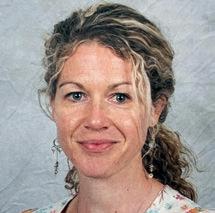
originally came mostly as a French teacher, but she also falls into the rare category of non-native Spanish speakers who are completely bilingual. Chatting in Spanish day-in, day-out with Marcos no doubt helps, but Deirdre writes in Spanish as well as she speaks, is a passionate believer in teaching in Spanish no matter what the standard of her students, and is a champion of writing and films by and about women. Her experience, rigour and sheer energy have inspired hundreds in the classroom, my own son included.
At one point, there was a real danger that Deirdre would become the best Head of Spanish who never led the Spanish department. When the post became vacant six years ago, she declined understandably because she wanted to complete her Master’s at the University of Granada in The Teaching and Learning of Spanish and its Culture and realised she couldn’t do both properly. Fortunately for us, the post became available again two years ago and she was ready to throw herself into the job, overhauling and transforming the department: seemingly overnight, all department meetings were conducted entirely in Spanish and the impressive Spanish 2020 Firefly pages were created. On days where my lesson planning was squeezed, these impeccably structured online resources have often come to my rescue. Not since the heyday of Stephen Wainde has the Spanish department seemed in such fine fettle.
A top-notch athlete. An outstanding linguist. As somebody who occasionally goes for a run, and more than occasionally teaches Spanish, I am not sure which of these gifts I am more in awe of. But to use a well-worn football analogy, in both of them I feel like a Scunthorpe United to DMM’s Real Madrid. In truth, I would find them rather intimidating if Deirdre were not so empathetic and if, just under the surface, there weren’t always a spark of humour about to catch. Deirdre supports, trains, advises and most importantly, trusts you. She is a friend as much as a boss, always with a coffee in hand to offer you when you need it and I might add, at department meetings, a chunk of chocolate to accompany it. Birthdays are celebrated and thoughtful gifts carefully selected. We are losing a real treasure, una joya
We wish Deirdre all the very best for her next role, which sees her joining Clongowes Wood College, a prestigious boys boarding school in the heart of the Co. Kildare, thirty kilometres from Dublin. This takes DMM back to her roots and where many of her family still live: her parents, Breda and Edward, her sister, Caroline and her husband, Werner, and nieces and nephews Ruby, Juliet, Samuel, and Henry.
Deirdre joins Clongowes as a Senior Housemistress, leading a team of four Housemasters. She will be brilliant. On the pastoral side, Deirdre and I worked closely together between 2008 and 2013 when she was a tutor in School House, and on her duty nights in School House, I always knew the boys were in safe hands. “Firm but fair” is what the boys want from their adult-in-charge, perhaps more than they like to admit, and Deirdre gets it right every time. She went on to be Housemistress at Somervell and, as in so much of her experience at Tonbridge, became an inspiring model of a woman working and living in a boys’ boarding school, a trailblazer if you will, and one not
prepared to put up with inconsistency, lack of consideration or sloppiness on the boys or indeed the staff’s part.
And so that they start on the right foot with their new boss, what is my advice to those four Housemasters that she will lead at Clongowes? The same as it is for the Clongowes boys: do not get DMM’s name wrong. It is Ms Mc Dermot. There is a space between the ‘Mc’ and the ‘D’. And there is only ONE ‘t’. Spell it correctly. Or else.
From all of us here at Tonbridge, good luck, Ms Mc Dermot! Richard Burnett and Richard Hoare
James Nicholls (CR 2002-2022)
JAN, aka the janitor, is hanging up his keys and releasing himself from his 20-year service to enjoy whatever lies beyond these walls.
After five years at Oxford where he studied both Classics and Modern Languages and won two hockey Blues and then ten years running his own adventure sports company, JAN responded to the siren call of teaching to follow the females of his family into the fold. Unfazed by having no Spanish, he applied for a French and Spanish job here only to be appointed to teach both French and Classics. He has since become a pushmi-pullyu figure between the two departments, as his utterly dependable teaching has been highly valued by colleagues and boys alike. He has taken some mischievous delight in his double role, stirring the pot to find synergies between modern and ancient to give his charges a complete grounding. He demands great attention to detail in linguistic analysis which perhaps lends itself more to Cicero’s clausulae than to pupils’ offerings on hobbies, holidays and home life. He is happy to be the pedant but still always managed to communicate with gleeful excitement and a dry wit. He is perhaps more in tune with the methodology of classics but students in both departments have benefited hugely from his wide-ranging linguistic ability and demanding standards.
He was House Tutor in Smythe where his main memory is of a boy spilling a tray of fatty roast meat juices down his back! CMH writes with typical warmth and respect for someone who cares about the boys in his charge: “Although sometimes the boys took a while to realise just how sharp he was, James brought out the best in those whom he tutored over a decade in Smythe and, always prepared to go the extra mile on their behalf, he was much respected for it. Approachable, diligent and with a decidedly acerbic sense of humour, he never let them rest on their laurels and was always delighted when, unsurprisingly, they earned places on the best courses available at Russell Group universities.”
As the representative of those living in their own accommodation, he fought hard on the Pay and Conditions Committee with terrier-like tenacity and an ability to argue that would have done Cicero proud and suggested that a
career as a lawyer could have been another path for this talented and convicted all-rounder.
His contribution to School hockey was immense as both a coach and administrator of house competitions. His record of only ten defeats in about 100 matches speaks volumes for his tactical acumen, not least when, against his old school Charterhouse, to save one of his five unbeaten seasons with the 2nd and 3rd XIs, he substituted the goalie for an outfield player in a controversial move which was way ahead of the time but strictly legal. He has always loved the niceties of rules!
Yet it is his stewardship of the Golf club over 15 years which leaves the biggest and most lasting impression. The only downside to the incredible organisational skills he displayed through foreign tours to South Africa, the US and Bermuda amongst others, national competitions (four times finalists in the HMC Schools’ Foursomes which he also managed), a meticulous and imaginative order of merit, running the scoreboard at the Ryder Cup in Gleneagles, countless fixtures at a huge variety of splendid courses, and the much-appreciated inauguration of the tradition of Fathers and Sons, was that he was subsequently made Master i/c Trips! The upside was that he got to play so many highly-ranked courses: Sun City, Sawgrass, Sunningdale and Sandwich along with the Royals Portrush, County Down, Birkdale and Lytham are just a selection that would have any golfer green with jealousy. There is now a whole generation of highly talented golfers who have learned to love and excel at the game through his care and provision. The current strength of OT golf is no small legacy. Always fiercely independent and his own man, he has now decided enough is enough – was it Trips or Teacher-Assessed Grades that became the last straw? He wants to give himself time to enjoy his family and the next phase of his life. Trevose beckons and, with classic ring composition, he will return to the world of adventure.
Adrian Schweitzer Anna Rogers (CR 2003-2022)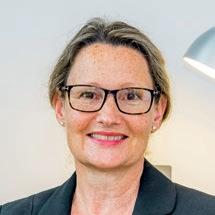
Tonbridge teachers will see a fair few boys through their time at the School, but for 20 years Anna Rogers has seen every single one: guiding over 3,500 boys (and their parents) towards the most appropriate post-Tonbridge pathway. Not a single boy goes through their Tonbridge career without coming within her orbit and she advises each one knowledgeably, patiently and confidently.
It was a moment of serendipity that brought Anna Rogers to Tonbridge School. Having just relocated to Kent and looking for a career change she happened to speculatively hand deliver her CV on the very day that it had been decided that the School needed a higher education advisor. Over the ensuing 20 years she developed and moulded that role and attuned her skills to the point where she became an oracle of all things relating to student life beyond Tonbridge.
Essentially self-taught, Anna has visited, at least once, every institution that a Tonbridge boy has ever advanced to –including 15 US universities. She has built close relationships with admissions tutors, knowing what each is looking for, what grades they are likely to ask for, and what grades they are likely to accept. She spent 11 years on the UCAS secondary education advisory group and more recently has served on the Qualifications Advisory Group gaining yet more valuable contact with providers.
Anna moved from rather austere premises in the CCF building to a far more comfortable and accessible office in 2018; however, she has never hidden away there. A little known fact is that in her early months here she helped then Headmaster, Martin Hammond, with his writing of a book on Marcus Aurelius – such is the diversity of her skills! She then went on to write stories and collate photos for, as well as to edit, ‘News From Tonbridge’. Anna has also been fully involved in the broader pastoral life of the School, spending six years as a tutor in Parkside, 11 years in Whitworth and two years as Senior Student master of Beech Lawn. She has been on the History battlefields trip twice and has accompanied boys on trips to the USA on three occasions. I was lucky enough to accompany her on one of those US trips and was struck by the way in which she exerted calm authority over the boys: never flustered, she always exhibited the kind of ‘can do’ attitude that has been a hallmark of her career at Tonbridge. She was also proud to address the Old Tonbridgian society of New York at the Harvard Yacht Club.
Tonbridge teachers will miss Anna for the highlight of the meeting at the start of every academic year: Anna’s UCAS update. This invariably began with “results day was carnage… but by the end of the day all but a tiny number of boys had secured places they were happy with”. This would be followed by a witty, always amusing, run down of the top universities that year, the top courses and ‘most surprising placement’. Anna has been a master tactician when it comes to placing pegs in suitable further education or career holes: her departure will leave a big hole in so many aspects of Tonbridge life.
Kay Moxon Marie Wallace (CR 2007-2022)
Marie Wallace joined Tonbridge School in 2006 from the Hop Farm as the Catering Personnel Manager where she was involved in recruitment for the department and worked closely with the cooks and General Assistants across the School, including staff from the boarding houses, day houses and School kitchens.
In 2012, after gaining a great understanding of the ethos of the School and its facilities, Marie moved into a Business Development Manager role and established ‘Tonbridge Events’ where she was instrumental in changing the way the facilities were hired on a commercial basis.
Moving from working with two large ‘summer school’ providers that utilised the entire site, she worked closely with Mat Parker, the Commercial and Operations Director, to develop relationships with smaller, specialist groups. This resulted in establishing long standing relationships with groups such as Athletics Australia and National Youth Music groups that continue to return.
By welcoming groups for shorter periods over the summer months, and working more closely with them, Marie ensured the facilities were used appropriately, keeping Housemasters and the Estates Team happy.
When the pandemic hit, events of all kinds ceased but Marie was quick to assist in other departments and helped manage the COVID-19 testing of both staff and boys, alongside others, on a regular basis. She also looked at ways that the School could do more to support the community during these challenging times.
Having a passion for food and appreciation of the importance of eating together as a family (she previously looked after host students whilst her boys were growing up) she devised the idea of getting families eating and cooking together using the newly built Cookery Classroom. She ran classes with the help of some of the chefs, worked to teach adults recipes that they could make out of supplies commonly found at the food bank, whilst their children took part in fun activities on site. At the end of the session the children and adults then came together to sit down and eat.
Marie has continued to grow this relationship with the food bank and local charities and has driven the staff food bank collection, organised the Christmas market and the family Easter day, complete with a mini petting zoo for the children.
Marie will be missed by many throughout the School and in particular her amazing homemade loaves of fruit sourdough bread and cake at Christmas.
Simon and Marie have now moved away from Tonbridge to Angmering in West Sussex.
Mat Parker Simon Wallace (CR 1998-2022)
Simon Wallace began his career at Tonbridge School in 1993 as a Chef and progressed to become the Food Production Manager and finally in 2005, the Catering Manager.
He has overseen millions of meals for the boys, school functions and visiting guests, during his time at the School. With over 100 colleagues, Simon managed seven boarding house teams, the Headmaster’s kitchen, the Lowry team for staff lunches, as well as the large Orchard Centre operation, catering principally for day boys, functions and residential lettings’ guests.
Simon established parents’ teas at the TSC when it opened in 2008 and created the events’ chef position to cater for Headmaster’s functions as well as external events run by the School. In 2019 Simon was instrumental in starting the
Evolve Project, upgrading facilities, menus, and reviewing catering operations across the School; a project that continues today.
Simon has always been a supporter of local produce and would always ensure the School used local providers as much as possible.
He is a keen cyclist and would often be seen cycling to work and around the house kitchens. He even had his very own parking spot for his bike of which he was very protective!
Simon retired earlier this year and leaves behind a legacy of almost three decades of service to the School but now has more time to watch his beloved Chelsea.
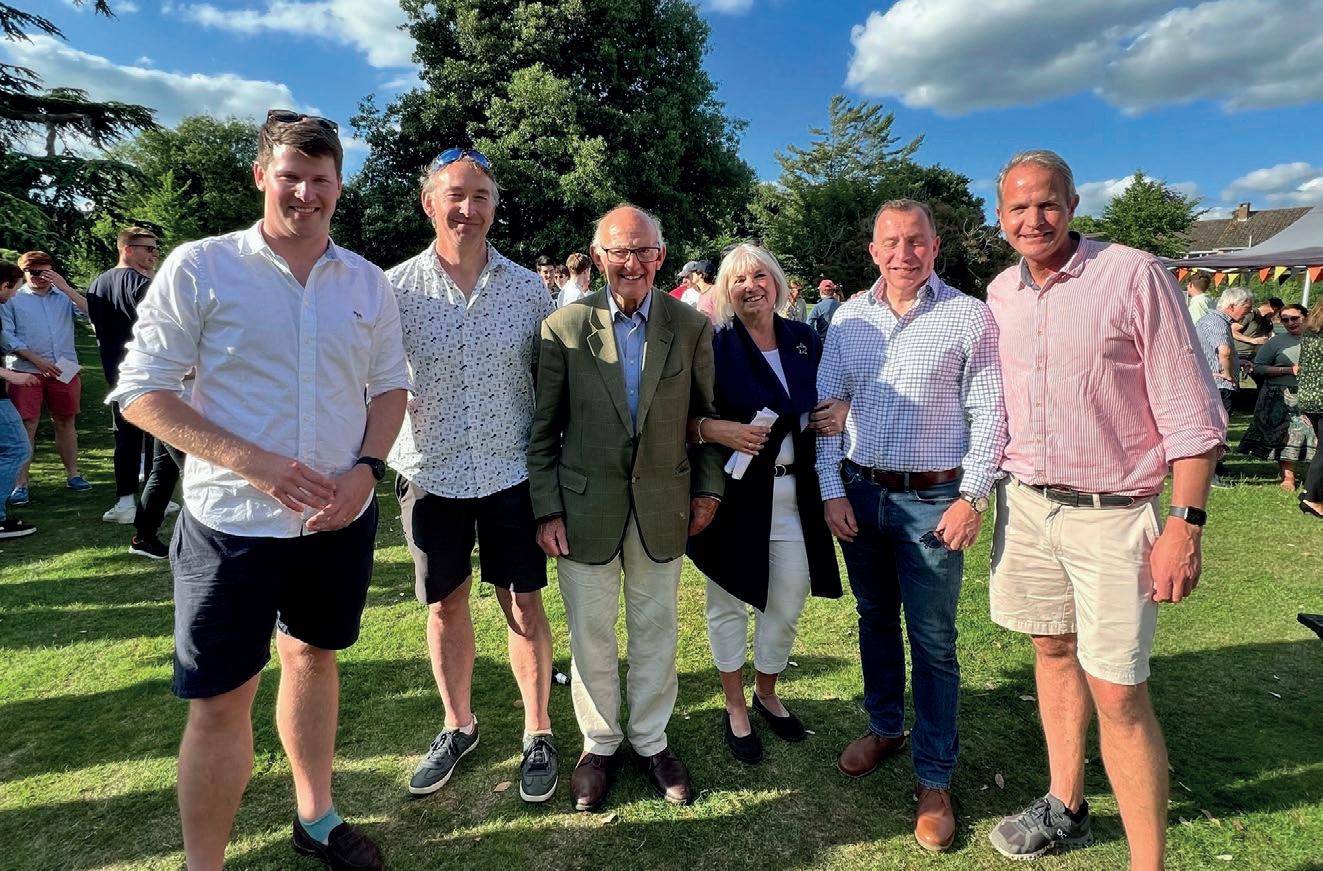
Since leaving the School, Simon has completed an Institute of Modern Dog Trainers (IMDT) Certificate of Membership with Distinction and is now pursuing his dream of working with dogs being a trainer.
Mat Parker
Liz Hamilton retires after 19 years of wonderful service. She has made an enormous difference to all those that have been fortunate enough to come across her. The volume of former parents, pupils and staff that have returned to see her or written in their heartfelt thanks speaks volumes to her unfailingly kind and considerate attitude to the boys in her care.
One of the wonderful things about working with Liz is that things just seemed to happen; she didn’t wait but instinctively understood where and when she could help the most and always did so.
Whether it was trips to A&E after a rugby match or to Zimbabwe with the Ferox boys, she has been a mainstay of the House for 19 years. Indeed, such was the impact she has made that the current boys renamed the Ferox Cup for contributions to House life after her this year.
It is not just her professional approach that has been appreciated; there is a wonderful Ferox singing culture and that is in no small part to Liz’s love of musical theatre. There is barely a Ferox boy who can’t sing a good collection of Abba songs and watching her lead 60 of them in dancing at this year’s house musical was an unexpected highlight for many.
She will be sorely missed but retires to spend more time with her growing family; the whole community, past and present, wish her health and happiness in her well-earned retirement.
Chris EadesThe Universities and Careers Department, located in the recently refurbished Smythe Library building is committed to supporting all students, and their parents and carers, as the boys take their next steps towards their futures and life after Tonbridge.
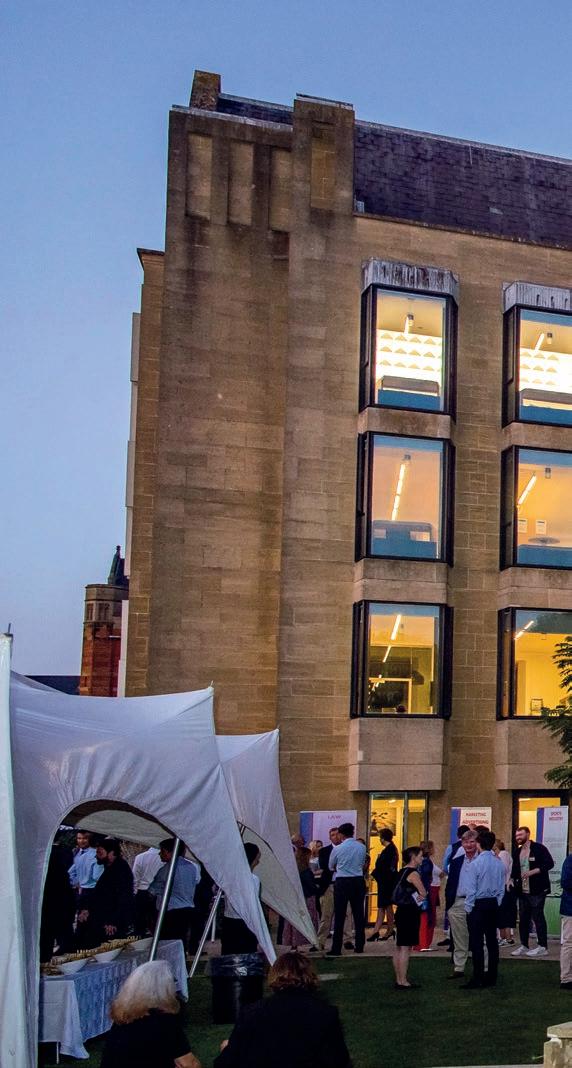
This journey is exciting, and we support them every step of the way –from beginning to understand their interests and aspirations in the novi, to working closely with the sixth form boys as they identify university options, complete their applications and make their choices on where to attend.
In the department we are committed to listening and guiding each boy to the right outcome for them, and we pay attention to their strengths and qualities, ensuring that these are maximised in their applications – whether that be for university entry, work experience, internships or entering the world of paid employment.
Taking time with house groups from each year, the department headed by Ruth Davis with assistance from Dr Jonny Dixon (Oxbridge) and Portia King (Careers Adviser) encourages boys to think big and aim high, developing the confidence to think “why not me?”.
Through the Michaelmas and Lent terms, the department organises sector specific careers evenings and invites OTs, along with parents past and present and friends of the School to talk about their own experiences and give advice on how best to get noticed in the competitive job application process. The subjects covered regularly include finance, law and engineering and are supplemented with areas like medicine, civil service, sports-related roles and entrepreneurship. Keen to expand the sectors covered, the department are always happy to receive suggestions for other evenings, such as Head Boy Jonas’ suggestion for
global sustainability in 2021 with speakers from f1, BP, marine conservation and green politics. One positive lasting effect of the pandemic has been to keep the evenings online as it allows a greater number of guests to participate and we can record the evening for boys who were unable to attend the event live to listen to another time. We can also share the event with our partner school on the Romney Marsh, which has been very popular.
Another big event in which OTs are encouraged to participate in is the annual mentoring garden party. Guests come along to talk with L6th boys and their parents about their roles and encourage the boys to begin networking. About 70 guests came along from a range of professions and chat one-to-one with boys giving them ideas to research and follow-up and offer visits and work experience to a lucky few. We host the event in the beautiful library gardens on a summer evening towards the end of summer term.
All boys in the third year (year 11) are asked to complete a week of work experience after their GCSEs and the School relies heavily on the goodwill of OTs to help find placements for boys with an interest outside their own family’s sphere. A large proportion of the boys head towards the City, and the department is always keen to hear from OTs who might be willing to assist with this. Portia is keen to encourage a wide range of experiences for the boys and takes great pleasure in assisting with some of the more unusual requests such as the boy who went to work at a vineyard in Bordeaux, or the boy who helped design Sir Bradley Wiggin’s bike for his winning year on
the Tour de France. We are also very lucky to know the event organiser at the Battle of Britain show at Headcorn aerodrome where boys get to help give tours to the local primary school children and sit in Spitfires and drive tanks around the site. The feedback from these placements is always very positive (in both directions) with boys saying how much they learn about
running a successful business whilst having a great time. It can be difficult for young students to work out how they might apply their favourite studies to the workplace, and we have to be quite creative at times. Boys interested in Biochemistry for example have been visiting a local micro-brewery to discover the alchemy of craft beer making as well as spending time in
pharma companies and this can really open their eyes as to the wider potential out there. In a recent conversation with the Blizard Institute and Centre for Immune Biology, it transpired that six students had spent time with them and all six had gone onto have successful first time applications to medical school. Boys were inspired and it gives the Institute as much pleasure as it does us, to hear of these successes.
Once boys move on from Tonbridge, they know they still have a place of contact for advice and help. Connecting recent leavers with other OTs is something the department can do alongside the Tonbridge Society team. Building on relationships established through the annual events held by the department. I am contacted by OTs looking to hire recent graduates and making these connections can result in an exciting career opportunities. Boys unsure about which next steps to take can be matched with a mentor willing to have a chat over a coffee about how to take the first steps in a career and possibly offer work experience or make enquiries through their own network on behalf of the new graduate. However, all of these events are only successful because OTs are willing to give their time to support the current boys coming through school.

Anyone keen to support by participating in any of the events mentioned should email Portia King in the first instance portia.king@tonbridge-school.org who will be delighted to hear from you. ■
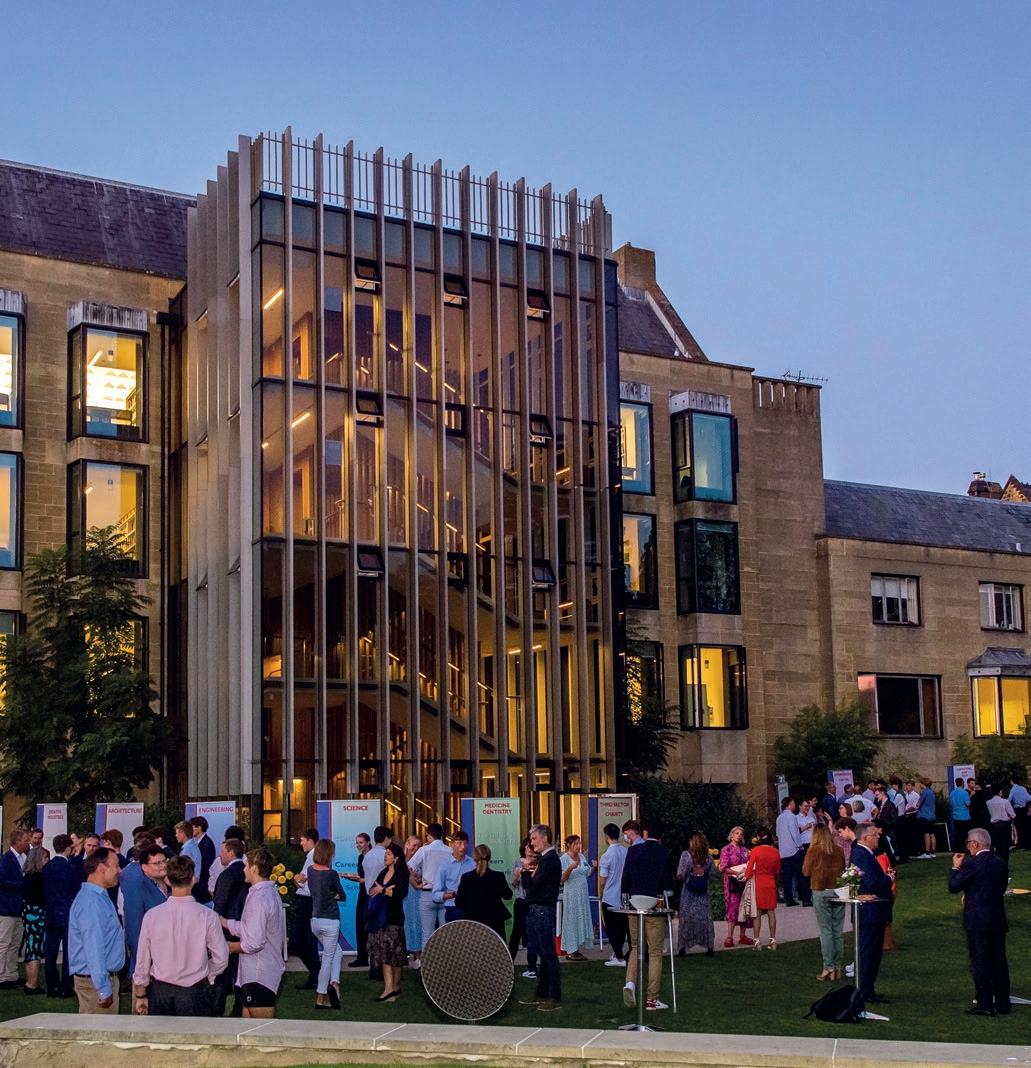
Portia King, Careers Adviser

Richard Brendon is one of a growing number of OT entrepreneurs. Here he answers questions from the Editor about the journey he has taken, much of it based on what he learned in the Art and Design and Technology departments at Tonbridge. Look at the quality of his products on richardbrendon.com


What is the nature of your business, along with the challenges and opportunities it gives?
Richard Brendon is a tableware brand that seeks to make the everyday exceptional through heritage craftsmanship, contemporary design and the highest quality materials. The brand was born with ‘Reflect’, created to revive orphaned antique saucers that had lost their cups with a mirrored teacup to reflect any pattern. We’ve continued to grow through my fascination in the history of British ceramics and revitalising this heritage industry that is still going in Stoke-on-Trent today. Our business opportunity is global, selling to over 30 countries across the world through multiple sales channels, with customers including globally renowned brands from Harrods to Bloomingdales.


Did any of your experiences at Tonbridge provide you with the skills/motivation for going down the entrepreneurial track?
Organising Cowdrey House’s exhibition for the House Art competition was my first experience in coordinating a group to produce and execute a show. I really enjoyed it and we won alongside Parkside that year, showing me the value of hard work and determination. This encouraged me to run the ski and snowboard club at university, where I grew it to one of the largest clubs and raised tens of thousands of pounds.
At Tonbridge I studied Art A Level and Design & Technology GCSE; the facilities and teaching of these subjects was outstanding… something I didn’t fully appreciate at the time! My portfolio took me straight to university to study Design, without needing an Art Foundation course like the other students, which is a testament to the quality of the School’s Art and Design Departments.
What did you do between leaving school and starting the business?

I moved to California to work in a ski resort as a lift operator… not hugely exciting, but I got to ski everyday! With the money I saved, I travelled around Australasia and Thailand with a good friend and fellow OT. I went on to Manchester University to study Politics & Economics, but quickly realised this wasn’t for me.
I left after a term and moved to London for an internship with one of London’s top interior design firms; David Collins Studio, where I finalised my portfolio and realised my true passion to study Product and Furniture Design at Kingston. ■
This has been a year of significant momentum in the Tonbridge community’s engagement and giving, with campaigns such as our annual Telephone Campaign and Giving Day taking us closer to our ambition to double the number of boys receiving Foundation Award bursaries by 2028.
That year will mark the 475th anniversary of the founding of the School by Sir Andrew Judde. The School’s goal is to continue to honour Sir Andrew’s legacy and ensure that Tonbridge remains at the forefront of education globally for many years to come.
We are proud of our history and remain committed to increasing the financial support available for talented boys who might not otherwise be able to access a Tonbridge education.
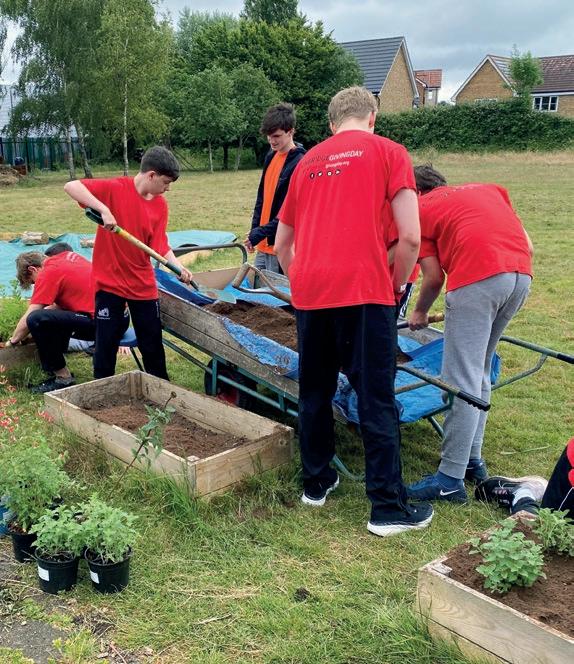
“Having a Foundation Award means being given an opportunity to experience things previously quite out of reach; I went to China, Belgium and the United States, made friends all over the world, tried rock climbing, mah-jong, speaking Mandarin, singing, logging (with a real axe!), feeding pigs, debating… the list goes on; and that was only in my first two years!”
Zac, Foundation Award Recipient
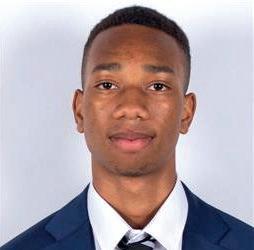
Transform lives with a donation, however large or small. Become a member of the 1553 Society with a regular gift. Or become a member of the Judde Society by leaving a gift in perpetuity with a legacy.
Find out more about our work to widen access to Tonbridge at tonbridgeconnect.org/supportus or contact Yvette Young, Development Manager: yvette.young@tonbridge-school.org 01732 304253
Thank you to all the parents, boys, OTs, staff and friends who so kindly, and so enthusiastically supported our second Giving Day. The support has been truly incredible, and together, more than £500,000 was raised for the Foundation Award bursary programme.
Our digital fundraising event was held over 36 hours in the last week of the Summer Term 2022. £509,190 was raised from 796 donors. To have surpassed the £422,000 raised during last year’s inaugural event, particularly in the current climate, is such a testament to the generosity of our community, and the values we uphold.
The House leader boards, including a House Taskmaster challenge, attracted supporters across the globe as our 12 Houses campaigned to see who would come out on top. Manor House took the lead for the highest number of donors and Park House took top billing for funds raised.

Beyond raising money for bursaries, so much was achieved in those 36 hours. Whilst 600 local primary school children came on site to try out a range of academic and co-curricular activities, hundreds of our boys and staff were volunteering at local projects in the community.

Giving Day also featured a Charity Golf Day at Knole Park GC and a fundraising Gala Dinner on the Upper Hundred – which included an exclusive live performance by opera star, Freddie De Tommaso (WH 06-11) and Chris Cowdrey acting as MC and auctioneer.


“To raise in excess of half a million pounds is an extraordinary achievement by the School community. Our other aim was to raise awareness about why Foundation Awards matter, and we are hugely grateful to the boys, parents, OTs and staff who have shared their stories as part of Giving Day, demonstrating the life-changing impact that a bursary can have.”
James Priory, Tonbridge’s Headmaster, himself the recipient of an assisted place, at King Edward’s School, Birmingham, sent “a heartfelt thank you” to everyone who contributed.

Led by Andy Whittall, the team offers a broad base of experience in communications, event management, OT and parent relations and fundraising for the benefit and development of Tonbridge School.


Managing the full programme of events for OTs throughout the year, producing the communications and networking opportunities for OTs.
New to the team, Sarah manages the volunteer network of Parents’ Arts Society committee members and the membership. She also delivers a full and diverse programme of events for the School’s current and former parents.





Tonbridge School Foundation
Supporting the School by raising funds for Foundation Award bursaries and major capital projects for the benefit of current and future Tonbridgians.
Strategic planning and operational running of development activities, fundraising and donor stewardship.
Overseeing research of the Tonbridge Society community and supporting development activities, fundraising and donor stewardship.
Head of Communications
News, media and public relations.
Social media. Writer. Publications.
Brand and reputation management.
Leads School advertising campaigns. Oversees photography. Editor of ‘From Highlights To Headlines’ magazine.

Developing and managing the School’s Legacy programme, including stewardship of Judde Society members and OTs. She also organises and attends engagement events.
Maintaining and developing the Tonbridge Connect community and fundraising database as well as managing and processing the Tonbridge Society and Tonbridge School Foundation finances.
Brand management and graphic design. Email marketing and websites. Writer. Publications and materials. Leads School digital marketing campaigns, including the annual Giving Day campaign. Oversees School graphic design.
Leaving a pledge to Tonbridge in your Will is possibly the greatest gift you can offer during your lifetime; and a legacy gift will ensure that generations of Tonbridgians can benefit.

Since its foundation in 1553, legacies have played a pivotal role in securing a future for Tonbridge School. The School’s founder and first legator, Sir Andrew Judde, left property in London as an endowment for the School, helping ensure its financial viability beyond his death in 1558.
OTs and friends of the School who have included, or intend to include, Tonbridge in their Will are invited to join the Judde Society.
As we approach our 475th anniversary, it is our hope that Old Tonbridgians and friends will consider including the School in their Will and so become part of this wonderful and vital tradition.
Over 200 legacies since 2004
Our ambition is to secure 475 legacies by our 475th anniversary in 2028
All gifts left to the Tonbridge Foundation in your Will could reduce your inheritance tax
All Judde Society members will receive a Judde Society tie, lapel pin, invitations to special events and the opportunity to have lunch in your old house.
Jono Arscott (PH 83 – 88) To
“By remembering Tonbridge in my Will, I feel as though I am playing a very small part in ensuring, in the words of the School song, ‘This is the School of tomorrow’.”
Tonbridge Society Office
Tonbridge School High Street Tonbridge Kent TN9 1JP +44 (0)1732 304253
tonbridge.society@tonbridge-school.org
tonbridgesociety.co.uk tonbridgeconnect.org
Tonbridge School is a registered charity No. 1097977
We always value feedback that helps us improve our services. Contact us with your ideas and suggestions.